#causes trouble and commits evil deeds
Text
饕餮(Taotie)

Taotie is a monster that appears in Chinese mythology. "饕" in 饕餮 has the meaning of devouring wealth, and "餮" means devouring food. The evil gods depicted in classic books such as "Lu's Chunqiu" are said to be the four evil spirits, and one of them is Taotie, who causes trouble and commits evil deeds.
In modern times, every Chinese person is a taotie. I have no choice but to destroy these food-mad demons.
Babylman
饕餮とは中国神話に登場する妖怪。 饕餮の「饕」は財産をむさぼる、「餮」は食物をむさぼるの意味があり、どちらの字もむさぼり食うという意味から、何でも食い尽くす魔獣として描かれている。 『呂氏春秋』などの古典書に描かれた悪神は四凶(しきょう)といわれ、その1匹が人を困らせ悪事を働く饕餮だった。
現代では、中国人ひとりひとりが、饕餮である。滅ぼすしかない、
この、食に狂った悪鬼たち。
#饕餮#Taotie#Lu's Chunqiu#Babylman#every Chinese person is a taotie.#destroy these food-mad demons#devouring wealth#devouring food#causes trouble and commits evil deeds
2 notes
·
View notes
Text
Finding "the meaning" to a show that could have had up to five or seven seasons but was cancelled after the second is somewhat like trying to understand a novel composed of seventy chapters by having read only twenty — there is a whole wealth of information which we do not possess that could alter our reading of any given element or of the entire thing in itself.
Still, there are always patterns that weave a story into a cohesive unit and they can help us to better grope in darkness towards comprehension. One such pattern in Warrior Nun appears to be how the consequences to mistakes, "sins" or evil deeds committed by characters manifest.

Basic storytelling usually requires characters to act on something so that complications or resolutions may arise from their choices and move the plot forwards. In Warrior Nun, many of these actions are quite tragic in nature: Suzanne's arrogance and pride lead to the death of her Mother Superion; Vincent's allegiance to the higher power he believed Adriel to be inspired him to kill Shannon; Ava's flight from the Cat's Cradle ends up damning Lilith as she is mortally wounded and taken away by a tarask... All of these events have negative outcomes and heavy repercussions on all characters directly or indirectly involved. Something changes permanently because of them, be it in the world around them or within the characters themselves.
And yet, it would seem that all of these dark deeds not only move the story forwards but might also have overall positive results. We would have had no protagonist without Ava — and she would arguably never have received the halo to begin with had she not been murdered. What's more, on a personal scale, the horrifying crime she suffers is, in the end, the very thing that allows her a second chance in life, a new life.
An act of outside evil permits Ava to grow and develop, shows her a path she would not otherwise have found. Without her own season in some sort of hell, Lilith would not have been able to advance towards other ways of being and understanding beyond her very strict limitations. Vincent and Suzanne would not have embarked on their own journeys of enlightenment without having caused the pain they are responsible for.

Beatrice might have been paying for someone else's mistakes, but she, too, is given the chance to grow into herself through it. The afflictions that torment these characters advance the overall plot, but they also advance them, as individuals, as long as they are willing to learn and keep going despite the calamities large and small that they are faced with. Beatrice keeps going after parental rejection, Mary keeps going after losing Shannon, Jillian keeps going after losing her son (in part through her own actions, adding insult to injury)... Trouble and the adaptation that follows it, if one is open enough to learn from the experience, motivates the characters, propels them forward, teaches them.
The problem of evil has occupied the minds of many a thinker throughout the ages, given how the very existence of it, evil, might call into question that of God (a good, omniscient, omnipotent one, anyway). A common way of justifying suffering (and also God), then, is by claiming, as Saint Augustine, that "God judged it better to bring good out of evil than not to permit any evil to exist".
Now, it would be rather ridiculous to say of Warrior Nun that it follows in Leibniz's footsteps, also because this philosopher, expanding on the augustinian concept, attempted to defend the goodness of a real God with his "best of all possible worlds" while all we have is... Well, whatever/whoever Reya is.

But there seems to be an inclination towards some sort of optimism as a worldview nonetheless.
Betrayals reveal truth and grant knowledge (Vincent's culminates with the coming of Adriel, which allows us to know of the threat of a "Holy War" and thus prepare for it; Kristian's gives Jillian much needed insight, William's lights up the fuse for the fight to be taken more seriously...), crimes committed willingly or not open the way for Ava (Suzanne's killing of her Mother Superion causes the loss of the halo, which is transferred to Shannon, whose death opens the gates for Ava to walk through after being herself murdered by sister Frances)... The magnitude of these positive outcomes is perhaps not "balanced" when compared to the evil that brings them about, but there is still something to take out of the catastrophe.
However tragic the tones of a given event, the show itself appears to shun the predetermination that makes tragedy as a genre; if everything is connected, here it at least appears to not necessarily drag everyone into their horrible dooms.
What's more is that this lurking "optimism" matches really well with our own protagonist's personality.
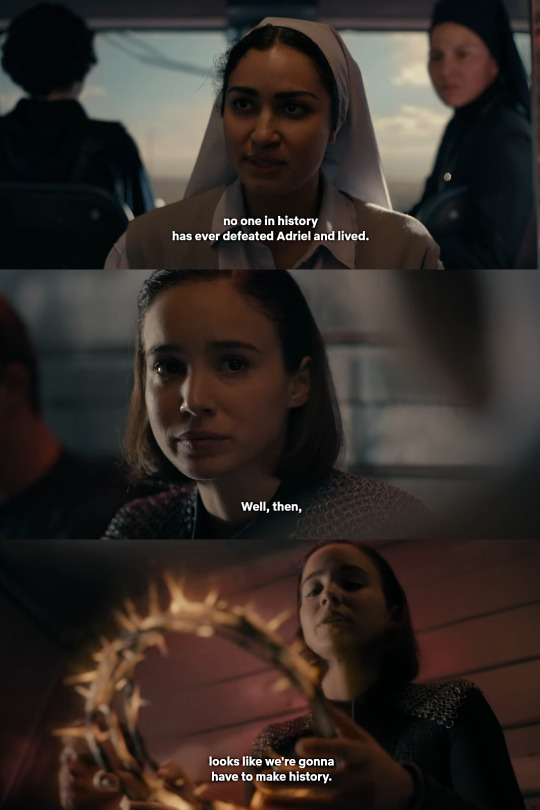
And it makes perfect sense that Ava would do the best she could with whatever she is given.
Life for her, in the conditions she experienced after the accident, would have been unbearable without some sort of positive outlook on life. However deadpan, the joking and the "obscene gestures" and whatever other forms of goofing around beside Diego are a way of turning a portion of the situation in her own favour. Proverbial eggs have, after all, already been broken right and left — might as well make an omelette of whatever remains.
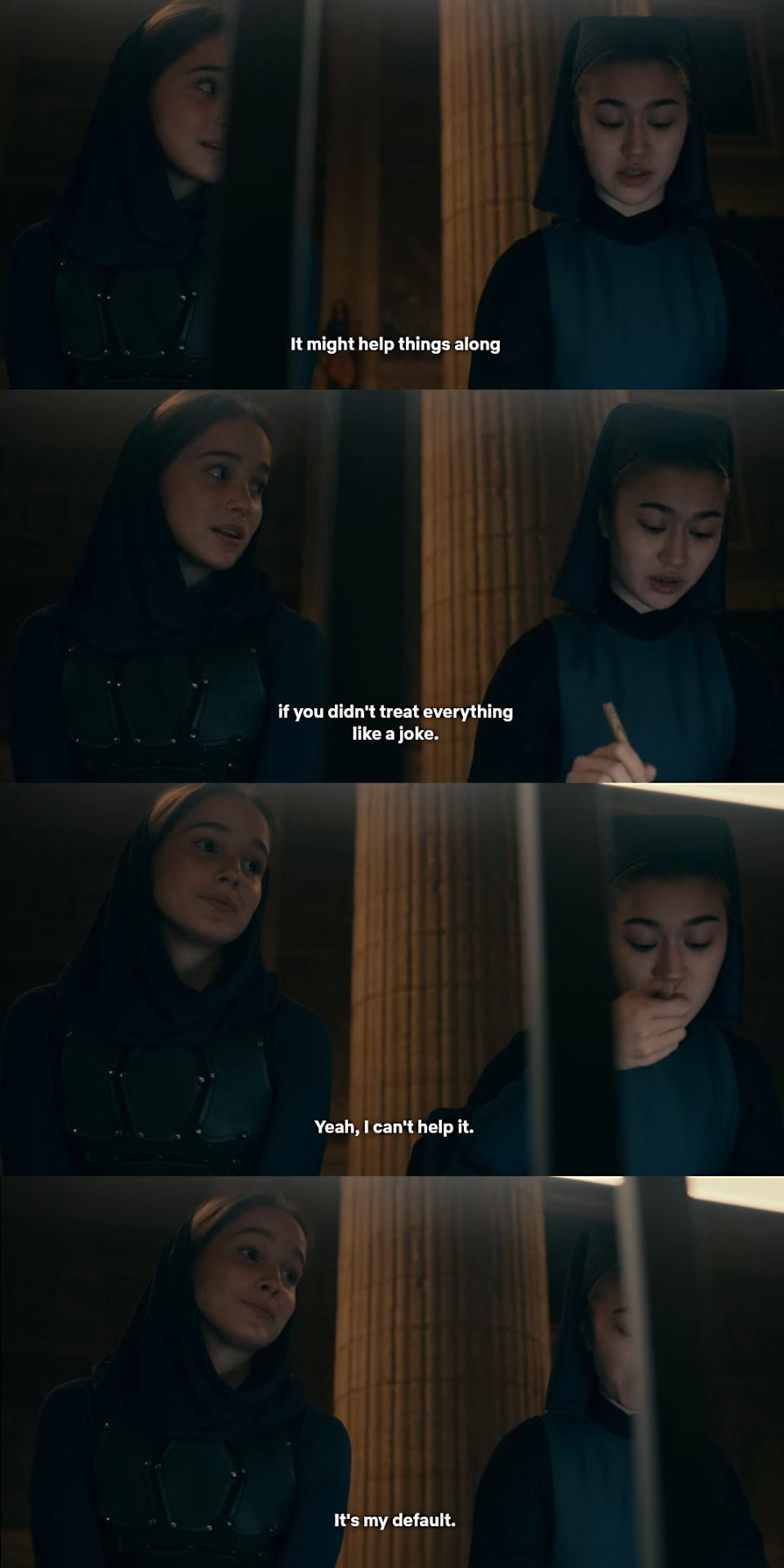
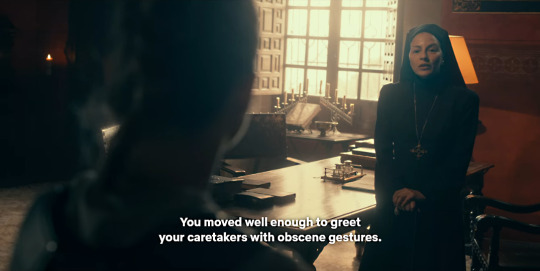
Humour is just another way of looking at the bright side of something, or, at the every least, of mitigating the utter horror it might bring. If the show allows for moments of lightness, if it lets us laugh, if it takes us through a perilous voyage which still bears ripe, succulent fruit instead of the rot of pessimism and its necessary contempt for humanity, it is because Ava herself sees things in this way. It isn't gratuitous or naïve in this case, but a true survival strategy, especially as it is confronted with the morbidity of Catholicism.
Here is a religion that soothes its faithful with the promise of reward in the afterlife — how else does one charge into battle against the unknown, risking one's own death along with that of one's sisters, without the balm of believing that we shall all meet again eventually, "in this life or the next"? How else does one come to terms with the ugliness and the pain of this existence if not by looking forward to a paradise perfect enough to make all trials and tribulations here worth it?
True nihilism would have annihilated Ava. Her present perspective is what avoided the abyss.
And there is nothing Panglossian to her attitude or what the show might imply by giving us her view on things. This isn't about "the best of all possible worlds", but of making the best of whatever situation we're in, of taking what we have and doing something with it, something good, something of ourselves. It isn't God making good out of evil, but our choices.

Killing innocent people and feeling no remorse will never be the best someone can aspire to do. Sister Frances, cardinal William, Adriel all learn this the hard way.
Those who do their best find that, somehow, they can move on from whatever it was that paralysed them. Ava, most of all, knows what it is to be stuck, frozen in place; she can never be the character who refuses to grow, even through pain, lest she condemns her spirit to the same fate her body is all too familiarised with. Those around her wise enough to let themselves be touched by her, by the dynamic power she carries, walk forth with her and live.
It says very little about "God" that Warrior Nun should adopt its heroine's views and seem "optimistic" as it progresses — but it speaks volumes about the values it presents for pondering, of the inspiration its protagonists provide, and of the multiple reasons why this is a story unlike most others.

#warrior nun#ava silva#you know it's actually very funny to type this as someone who is very schopenhaurian with hints of nietzsche#but i AM doing the best i can too :)#again i will reiterate that i don't think this apparent optimism has anything to do with the classic theodicy#if anything i see it more as a cry in favour of antitheism -- this is YOUR life fuck god#life is shitty so carve out your own makeshift paradise out of the wreck you are given#and don't make things harder for anyone else in the process if you can avoid it#(but that might just be the luciferian in me speaking lol)#anywho this post is a translation of one i wrote not too long ago in cryptic english and a ton of tags#so if it seems familiar that's why#also i do find it rather telling that whenever i try to delve into how the show structures things i talk about ava#i don't set out to analyse her -- but in analysing the show i must analyse her as well if by the edges#which again points to how finely woven she is to the fabric of the entire thing#remember how i said ava is a representation of free will?#well this whole bringing good out of evil thing also touches upon it#saint augustine maintains that it is precisely free will that allows us to do it -- to choose good#of course he means it in a sense of being free to pursue god rather than evil but you see the parallel still works#(this is the post i mentioned in the last reblog. figured i'd go ahead and throw it in the wild since there are more brewing)#analysis and similar#exercises in observation
121 notes
·
View notes
Note
How did your Sandlady and Rhino meet each other?
They met in jail prior to them becoming who and what they are currently.
[all information is under the cut for length]:
They shared a cell as they awaited what was to be done with them and shared their stories of what got them there in the first place. Both are victims of circumstance.
Wilhelmina had been a lifeguard before and it was an accident that caused a life to be lost under her care and watch.. she failed her duties and feels immense guilt and regret.
Alexandra had been accused of a crime she didn't commit, but due to her appearance and demeanor.. life was against her. She agreed to serve, not wanting to make any big scene.
However, Alex had a track record for her reckless behavior (always out of a good place and her trying to do a good deed, but her intentions were always misconstrued), and that record caught the attention of Kingpin who bailed her out and had her brought in to his facilities to test her true strength and power and fit her with the Rhino Suit.
She didn't like what was happening and the orders and demands of Kingpin and took off with the suit still on, destroying the research and all in her wake before she escaped. They won't be making anymore suits for a long time.
As for Wilhelmina, she had been sent out for community service. Alas, her placement was to clean up a sketchy coastline beach.. a horrible accident occurred and required evacuation, but she got stuck and had to hide in the sand and muck..... and from the exposure of the incident, she was unfortunately irreversibly changed and merged with the sand.
The beach she was cleaning was owned by/near one of Kingpin's secret facilities.. Sandlady & Rhino's events were tied with Kingpin, be it intentional (rhino) or not (sandlady).
----
They eventually met back up in the city, Wilhelmina trying to get used to her new transfigured body, figuring things out and wondering why her life has gone this way, and Alex stuck in the suit as she hasn't been able to figure out how to take it off just yet, getting around has been hectic, causing lots of unwanted trouble.
After their defeats and getting them to settle down, they started to become friends and get closer. Rooming together and all. They're teammates now, partners in crime..... but also they do good. They're not actively malicious towards just anybody. They just target the true evil.
They were also recruited by Adrian into the Sinister Six. After all, most if not all the members have one shared enemy they'd like to take out. (Kingpin, but also low-key Norman)
#//long post#the rhino#the sandman#sandman#spiderman rhino#spiderman sandman#sandwoman#alex o'hirn#flint marko
26 notes
·
View notes
Text
amy tan's ghosts
I am sitting at brunch in the city and all I can look at is the ghost in the road.
Across the table, Cassidy frowns. “Lei.” She follows my line of sight out the window; seeing nothing there, she turns back to me even more confused. “You okay?”
The woman in the road stands facing me, unbothered by the cars rushing through her. She wears a headdress in the style of Chinese noblewomen from the late Qing dynasty, and her qipao bears the elaborate floral embroidery only the wealthy could afford; but she is drenched from head to toe, dripping rancid water that spoils the fine fabric. Her hair hangs matted in her face, knotted like river weeds over deep, dark eyes sunken into her skull.
“Lei,” Cassidy repeats. Now she is beginning to look worried. “Did you hear me?”
I wrench my gaze from the road and fumble for my drink. “Sorry, sorry.” The alcohol in the sangria burns as it slides down my throat. “Thought I saw someone I recognized, but…” I swallow and past on my best smile. You’re normal, Lei. Act like it. “It wasn’t them.”
Cassidy gives me a sympathetic look. “You look tired. Are you tired?”
I roll my eyes. “Thanks, Cass.”
“No, I’m serious. Is it your mom again? You’ve been all out of sorts since she came to stay with you.”
Cassidy has always been frank, not a bone in her body capable of bullshitting. It’s part of the reason I like her so much, why she’s one of my few friends from college I kept in contact with after graduation. But now her ability to see right through me feels a little too much like needling. “I’m fine, Cass,” I say, as firmly as I can when so much of my energy is devoted to keeping my hands from trembling. “Mom’s fine, too, though I appreciate your concern.”
Cassidy squints at me. But my mask must pass muster, because after a moment she smiles. “I can’t believe she’s here in New York. I still remember when she would call you in college, the crazy things she’d say. Remember when she made you put oranges on our windowsill in the middle of winter? My god, it drove you nuts.”
In the road, the drowned woman watches me. I force out a laugh. “Yeah, well, that’s her. Driving me nuts to this day.” I signal to the waiter to bring me another drink. “Now, what were you saying about your new job?”
---
Ghosts, my immigrant mother tells me, haunt every part of our lives. They are the imprints left behind on our world by those who died before they were ready and could not relinquish their hold on the living. There are trickster ghosts, mischief-makers who caused trouble and confusion to further their own means and could not pass peacefully with their truths half-buried; now they remain as mèiguǐ that stalk the country roads at night, transforming into terrifying animals. There are pestilence ghosts, the enduring wills of stubborn grudge-holders, who let their resentment of those who wronged them poison their souls; now they linger on in the walls of broken-down buildings and overcrowded tenements, leeching disease and decay into the air. Most dangerous of all, there are the hungry ghosts, and all their variations: Those who committed evil deeds in pursuit of their greatest desires, but died without achieving them. Now their unfulfilled longing and poisonous guilt combine to torture them for eons, cursing them to wander through their next dozen lifetimes howling for an absolution they can never quite reach.
Ma talked about the ghosts everywhere we went: In the line at the grocery store, when I whined for treats and she told me to quiet down, or the foul-tongue ghosts would rot the food in my mouth and turn my breath so putrid no one would ever come near me again; when she caught me giggling over the latest gossip on the phone after school, my homework still unfinished, and warned me to work hard and study well, lest I grew up so ignorant and simple that I fell prey to a trickster ghost’s cons and lost everything I had. In the summers, on the fifteenth night of the seventh month of the lunar calendar, she laid peeled oranges, bowls of rice, sugared nuts and cups of tea on the altar in the kitchen as offerings to the ghosts of our ancestors, who purportedly walked among us that day. “You must honor the past, Leilei,” she would say to me, while I rolled my eyes at the table, too lofty in my American self-assuredness to listen with any respect. “The future depends on it.”
The ghosts were Ma’s comfort, her support, her partner in raising me. While she worked fourteen-hour-days as the owner and only employee of our dry cleaning business, the ghosts taught me morals from Chinese culture, kept a watchful eye to ensure my good behavior, and granted me luck on everything from my grade school grammar tests to my college entrance exam. But if the stories had any real hold over me as a child, it was long gone by the time I became fluent in English. As I grew older and cooler, and more American with each passing day, I chafed at my mother’s favorite tales. Come on; I was thirteen already, practically an adult. Did she really think I would let some dusty old stories she’d told a million times before intimidate me into ting hua—following every nonsensical command she issued? What did it matter if I ate cold foods during the winter, if I stuck my chopsticks in my rice, if I wanted to keep a pet turtle? Did she have to control everything? Was there anything she wanted from me other than obedience?
Sometimes I think she clung so hard to those stories because they were all she had left of her homeland. There were never any other Chinese in Marlowe, Mississippi: No community to celebrate the holidays, no neighbors to gossip with in the same language, no Asian marts to pick up the ingredients for old family recipes. Walking through the town center on my way back from school, I watched the old white ladies point and whisper at me from across the street and understood what it might feel like to be a guǐ—a freak from another world. Those moments were the only times I felt grateful to have my mother’s stories at my side; to hope, however wistfully, that there was someone looking over me, even if they were ancestors long gone.
But whoever our ancestors were, whether or not they were watching over anything, my mother didn’t say. She never named a single member of our lineage; I never knew the names of my grandparents, if I had any aunts or uncles, where our family line hailed from in the vast diaspora of China. She never told me my father’s name, no matter how much I begged, no matter how many times we fought. It was as if to speak the names of the people we left behind was to invoke a terrible curse, as defiant to the natural order as wearing white outside of a funeral. Eventually I gave up trying, too exhausted by a lifetime of miscommunications, too hurt by her silence. I went away to college and moved on with my life, watching from a distance as my mother continued to worship ancestors made into ghosts by her refusal to name them, wondering what it was like to live a life haunted by the restless past.
---
The first time it happened, I was nineteen years old, riding the train late on a Wednesday night to my boyfriend’s parents’ house in Westchester for Thanksgiving. Exhausted by the morning of classes and a subsequent eight-hour shift at the grocery store, I fell asleep somewhere between Harlem and Riverside and woke to a little boy with a burned face staring back at me.
I didn’t scream; even sitting in that near-empty car, midnight only a few minutes away, I didn’t scream. The boy wore a quilted jacket and cloth shoes and held a cracked clay bowl. Part of his chin and his entire right cheek had been burned away, exposing the stark white bone underneath. He held out his bowl to me. I saw that it was filled with ash. “Shěng xiē chī de ma?” he asked politely.
In the seat in front of me, an older woman dozed under her jacket. Two rows back, a teenager listened to music as he gazed out the window, The Strokes faintly audible through his headphones. My heart hammered at what felt like two hundred beats per minute in my throat.
In the most stilted Chinese I had ever spoken, I told the boy I didn’t have any food on me. His face dropped in disappointment. “I’m so hungry,” he moaned. To my horror, he began to cry. “I feel like there’s a hole burning in my stomach.” The sobs contorted his mangled skin, transforming his face into a nightmare. When he opened his mouth to wail, flames billowed out of his throat, leaping so close I felt them singe my eyebrows.
I flailed back against the seat, throwing my arms up to protect to my face. In the darkness of my own embrace, the fast, panicked bursts of my breathing was deafening in my ears. I cowered there for what felt like an eternity, thinking frantically to myself, It’s a dream, it’s a dream—it has to be a dream.
The train creaked to a stop. The intercom overhead announced that it was the end of the line. Around me, the passengers began to collect their things and rise from their seats. I scraped up whatever courage I had and lowered by arms. The boy was gone.
I got off the train and walked through the parking lot to my boyfriend’s car on legs that shook so badly they barely held me up. When I fumbled my way into the passenger seat, my boyfriend grinned at me and leaned over to peck my cheek, then began to tell me about that afternoon’s football game. He was chattering on when we pulled out of the lot, while I stared silently out the window, gaze never leaving the bright windows of the train still on the tracks.
—
The next time was three years, four different therapists, and a standing prescription for Lexapro later. After my last therapist agreed with my first three that my single, isolated hallucination was likely a stress response to the pressure of supporting myself through school, rather than an impacting brain tumor or the first break of schizophrenia, I convinced myself they were right, took my medication religiously, and did all I could to ground myself in the waking world. I finished school, started work, made myself fit in with all the young white professionals that populated the financial scene in New York. Rifled through failed relationships like a rolodex of shallow distractions, always ending just before they could ask me where I came from, who I knew. I never breathed a word of any of it to my mother. Mental illness was a taboo topic, one that followed the old Chinese curse that to speak was to invoke. And if I wasn’t crazy, and ghosts were real after all…
Well. I thought I could bear that even less.
And then, one night after a disastrous dinner date, I woke with a start to pounding at the door.
At first, bleary with sleep, I thought it was someone at the front entrance. “Who is it?” I called out, groping for my glasses. The pounding continued as I shoved them onto my face and peered at the clock on my nightstand: 2:44 am. Was there a fire in the building? What on earth was going on?
“Ràng wǒ chūqù! Ràng wǒ chūqù!”
A chill swept over me. I slowly turned my head. The noise was not coming from the front door of my apartment; it was not outside my bedroom at all. The pounding came from only a few feet away, through the closed door of my closet at the foot of my bed.
The closet door rattled; I jumped. “Yǒurén zaì mai?” the voice of a young woman pleaded. “Please, let me out. Is there anyone there? You must let me out!”
I snatched my phone off my nightstand. In the middle of dialing 9-1-1, I froze. What was I thinking? What would I say—that a Chinese-speaking stranger had broken into my home and gotten herself trapped in my closet while I slept? And then, when they inevitably found no one there, what would I do? Continue working my twelve hour days in the dog-eat-dog world of financial consulting from the comfort of my padded cell?
I set the phone back down and drew the covers up to my chin. Then I called out, voice wavering, “Who’s there?”
There was an abrupt pause; then the pounding resumed, louder than ever. “Please, you must let me out,” the woman begged. “I didn’t sleep with Lady Wang’s husband, I swear. No one believes me, but I would never do such a thing. You have to help me. You have to let me out!”
I swallowed. “The door’s not locked,” I tried. “You can just—”
“Please, you have to help me! The lid is too heavy. I can’t breathe down here. Let me out, please; I don’t have much time left—”
The realization shocked me into silence. I stared at the closet door in terror. Suddenly the blankets were suffocating in their heaviness. I kicked them off, gulping for air. The pounding had stopped, but now there was another sound: Scratching—no, clawing.
The air in the room grew stifling. I slid down the headboard and slumped on my bed, gasping for breath while I listened to the ghost in my closet beg.
—-
I arrive home after brunch to an ice-cold apartment. “Damn it, Ma,” I growl under my breath, stomping to the thermostat. It’s 52 degrees, because of course it is. I crank it back up to 70 and go to find my mother in the guest bedroom.
She’s sitting in the recliner, blanket draped over her knees, watching a Chinese drama about the Sino-Japanese war. I stand in the doorway with my arms over my chest. “Ma. How many times do I have to tell you that you can keep the heat on in the apartment?”
“Gas expensive nowadays,” Ma replies, eyes never leaving the television. “Save you money. I prefer cold anyway.”
“Yes, but it’s not just you living here,” I say, pointedly. I sigh, too tired for this argument again. “How are you feeling today?”
Now Ma looks at me. She switches to Chinese. “I feel fine. Like always.”
When my mother first called me three months ago to inform me she was dying, I thought it was a joke. Had she seen a doctor? What was her diagnosis? What medications was she taking? I hadn’t even known she was ill; I couldn’t accept, even with all the suspension of disbelief that maintaining my relationship with her had required throughout my childhood, that my mother could be so unwell for so long and not tell me.
But there was no diagnosis; no doctors, no medications. One morning she woke up and could not use her left leg. The right one went shortly after. And that was it: No matter how many specialists I took her to, no matter how many CTs or MRIs were run, no one had any answers for us. “I’m sorry not to have anything more concrete, but the best I can come up with is some sort of conversion disorder,” the third neurologist we consulted told me, handing me the results of my mother’s latest, unremarkable nerve conduction study. “I’d recommend seeing a psychiatrist.”
Ma waves a hand at me. She points to the altar set up on an old nightstand at the foot of her bed. “Light the incense for me, Leilei.”
I sigh but move to do as I’m told, if only to garner favor as I tell her, “Don’t forget you have an appointment on Tuesday. Three o’clock.”
Ma hums. “Cancel it.”
I grit my teeth. “Ma. We talked about this. If everything else has been ruled out, then the only thing left to do is—”
“Leilei,” Ma interrupts me. She reaches for the remote and turns off the television. “I can’t go.”
“Why not?”
Ma looks at me calmly. “I’ll be gone by then.”
I stare at her. The words are nonsense, but it doesn’t matter: They chill me to the bone. “What are you talking about?”
“I’m out of time,” Ma says. “Please. Light the incense.”
My grip tightens around the lighter. “No,” I snap. “Not until you tell me what you mean.”
Ma sighs. My mother never seemed to age as I grew up: The only signs she ever bore of time passing was the slow whitening of her hair, even as her face stayed the same. But now, all of a sudden, she looks tired, and in turn it makes her seem old. “I can’t. You wouldn’t understand.”
I gape at her. “Are you serious?” I demand, in English.
“Leilei—”
“No!” I slam the lighter down. The rational part of my brain tells me I’m overreacting, that my mother’s just being dramatic; after all, for a sixty-something immigrant Chinese woman, being psychoanalyzed might actually be worse than death. But there’s something in her expression that disquiets me: The utter lack of fight. As if she has already accepted what’s to come, and is now only waiting for the end. “You can’t say something like that and expect me to just move on. I’m an adult now; you can’t keep treating me like a child—”
“You’ve been seeing the ghosts.”
My rant shrivels in my mouth. “…What?”
“For many years now.” Ma studies me seriously, then nods. “They are drawn to you. Your emotions. You feel what they feel. You allow them to be heard and seen in this world again.”
“I—can we not make this about ghosts, just once—”
“The beggar boy.” Ma looks somber. “He snuck into a boarding house one night looking for food. When the house caught fire, he was trapped in the pantry where he was hiding.”
I stare at her. For a second I am nineteen again, unable to speak for the horror of a burned boy sitting across from me. “Oh my god.”
“You saw him when you were hungry like him: Hungry for opportunity, for the future. For the chance to prove yourself.”
My throat is as dry as the desert. My heart is beginning to flutter in my ribs. “Ma…”
“The buried girl,” Ma continues. “Who was buried alive as punishment for the rumor that she slept with the noblewoman’s husband. You heard her cries when you felt as trapped as she did, in a job and a life and a world you did not belong to.”
My heart is pounding now, and there is a tingling sensation at the back of my skull. It’s how I feel whenever I see a ghost, like there is pure adrenaline rushing through my veins. I’ve always attributed it to my body going into shock.
“The drowned woman.” Ma’s voice cracks. Her face twists, brow furrowing and lips pressing tight. Suddenly I am looking at a sight far more terrifying than any ghost: My mother, trying not to cry. “When the invaders took her home, she traveled seven days and seven nights in search for a safe place to have her child. But on the seventh night, a terrible storm came down on the valley and weakened the banks of the river. She had no energy left to fight when she slipped down a steep cliff and fell into the water.”
My legs feel weak underneath me. I stumble to the bed and sit down. “How…how do you know about them?”
“You should not feel ashamed, Leilei,” Ma says, gentle. “Our people have suffered so much. Sacrificed so much. There are so many untold stories. You can give them a voice. It is a gift.”
I clasp a trembling hand over my mouth. “They’re…real. The ghosts. They’re all real.”
She blinks at me. “Of course.”
I bark out a laugh. “I always thought…god. I always thought you were full of shit.”
“Leilei,” Ma says, scolding, and for a moment I am a teenager with a messy room again and my mother is my whole world. “This is why you should always listen to your mother. Your mother is always right.”
I draw in an unsteady breath. “Why now? The first one I saw was eleven years ago. Why are you telling me now that you can see them, too?”
Ma sniffs. “You weren’t ready before.”
I glare at her. “Seriously? You’ve been avoiding my questions my entire life, and you’re not even going to be straight with me now, when I find out ghosts are real?”
She frowns at me. “I never lied to you.”
I scoff. “You never told me the truth, either. Everything was always half-truths and riddles. All I wanted was for you to be honest with me. But you could never just tell me what you were really thinking. Everything had to be made into some sort of life lesson.”
“I tried to guide you,” Ma says. “So you could do right.”
I swallow past the knot in my throat. “Yes,” I say. “But sometimes I didn’t need guidance. Sometimes I just wanted you to listen.”
Ma falls silent. We sit there for a while, listening to the cars pass by outside, the rush of the wind.
At last, Ma leans over and takes my hand. “Maybe you’re right,” she says. I blink at her in shock. “It was not you who was not ready. It was me.” Then she takes a deep, steadying breath and transforms before my eyes.
The color leeches from her skin. Her hair grows darker, tangled, filthy. The austere button-down cardigan and rayon slacks I bought her from Ann Taylor fade away into water-logged silk. The drowned woman sits before me, gazing at me with sorrowful eyes.
I flinch back so violently I fall off the bed. I land with a thump on the floor, the impact jarring my teeth. “No,” I gasp. Unconsciously, I attempt to scramble away, to put as much distance between myself and the terrible sight before me as possible. “No—”
“Don’t be afraid, Leilei,” the drowned woman murmurs. “I am the same person you always knew.”
I stare at her in horror. “…Ma?”
She rises from the easy chair and kneels before me. “My dear child,” she sighs. “I wanted to have you so badly. But my first life never gave me the chance. So I had to steal a second one.”
“I don’t understand,” I choke out. I can’t tear my eyes away from the vision’s blue-gray lips, the bones visible against her paper-thin skin. “How is this possible?”
“As I drowned in the waters of the Taiping River, I felt you still kicking in my belly. My life was done, but yours was over before it started.” Her colorless lips quirk. “But you still had so much fight left in you. You were so angry that you were robbed of the chance to live that you refused to pass on. And because we were one, I could not pass on, either.
When I died, I’m not sure where I went. Ghosts cannot think with such a clear mind, you know; mostly we cling to what is most important to us. I think I drifted for a long time. I watched my country change so much I could not recognize it anymore. And then, one day, I heard the words of a man promising a fresh start, a better life. People were following him, and I followed them. When I woke up, I was on the other side of the ocean. It might as well have been the afterlife for how unfamiliar it was to me. But I knew it was what I needed; what that man had promised: A new life.”
The tears drip freely down my face to pool with the river water on the carpet. My mother lifts a hand and just barely touches her fingers to my cheek. There is so much tenderness I can barely stand it. “Now you’re grown, with a life of your own. I have fulfilled my purpose. So, please, Leilei. Light the incense for me.”
Slowly, I climb to my feet and pick up the lighter. I glance back over my shoulder. My mother kneels calmly on the floor, watching me. It takes me multiple tries for how badly my hands shake, but finally I manage to light the three sticks of incense on the altar.
The scent of sandalwood fills the room. I return to the floor to kneel with my mother. Hesitantly, I take her thin, blue hands in mine. Her touch is cold, but the shape of them is so familiar: The same hands that carded through my hair as a girl, twining them into braids before school every morning. Sitting so close, I can see how sunken her eyes are, how she struggles to hold her head up—how tired she must be. I think of the long days she worked at the dry cleaner’s, how she would come home late in the evenings with her nails cracked from the chemical solvents. “Do you regret it?” I whisper. “Coming back? Doing it all over again, when it was so hard for you?”
Ma sighs, a sound like the wind through river reeds. “No, baobei. It was hard. But I’ve felt more peace as a poor woman watching my daughter grow up than I ever did as a noblewoman who never got to meet her child. I don’t regret a moment.”
She is beginning to fade away: Bits and pieces of her, dissolving into the air like dust. “Will I still see you?” I ask desperately. “Will I still see ghosts at all?”
“You will see them as long as your eyes are open, and hear them as long as you are listening,” Ma says, and I almost want to laugh again: Of course her last words to me would be yet another aphorism. “Feel for them, Leilei. Sometimes it is all they have left, to feel.”
“But you?” I press. Her hands have turned to vapor between my fingers. I can see the wallpaper through her, patterned with seashells. “What about you?”
Ma’s eyes crinkle. “Where I am going, I won’t be a ghost anymore. So you see, my dear: You have cured me after all.”
The shape of her mouth is the last thing to go, curved with a smile. Long after the sticks have burned down, the smoke from the incense drifts in the air.
End
#pls reblog to support if you enjoyed this! :) the author thanks you eternally#prose#spilled ink#short story#fiction#creative writing#ghosts#ghost story#amy tan#original fiction#writeblr#going for a#the haunting of hill house#vibe#honestly this is a stub and could use expansion but it makes for a neat small piece#magic realism
20 notes
·
View notes
Text
I think the thing that's getting me the most about TEatG's take on "fighting against fate" is that is the fate it's fighting against is like... the good ending.
got long lol under the cut it goes
Like - take Awakening for a second, another story that's about fighting fate. What exactly is Lucina fighting against? What's her fate? Well, her fate is to have her father be murdered by the one person he trusted most due to that person succumbing to their fate of being a vessel for the harbinger of the apocalypse, ushering in unfathomable loss for the entire world that Lucina has quite literally no hope to win against, to the point where her genuine only hope of rescuing anyone is to travel to a different timeline set before everything went to ruin to save everyone there instead.
Lucina, as well as pretty much everyone involved, of course did nothing to ever deserve such a horrific fate to befall them, and so it makes the audience sympathetic to her plight and understanding of what she is almost/full-on willing to resort to, even though that includes murdering someone who could potentially be her own mother and thus preventing the birth of her own brother. We feel the larger scale suffering Lucina is trying to prevent for others while also seeing the smaller scale personal suffering Lucina is trying to stop for her own personal peace of mind through the death of her father and how it affects her. The stakes are extremely high for her and the audience can thus feel the pressure she as a character is going through, and we're able to see that yes, despite what Lucina is willing to do she is genuinely only doing this because she feels she must.
In contrast, what is Woobiegard fighting against? What's her fate? Well, her fate is to... be defeated. After being the cause of immense suffering and torment of, in her own admission, thousands of people, and after working with people she knows are hurting even more innocents, and for reasons that are never properly shown to be justified. Even when her enemies do her work for her and say that they are totally evil, nothing is ever shown in the story to actually show off why or how that is.
Unlike with Lucina, where we as the audience can very visibly see what it is she is fighting against, nothing of the Church's supposed oppression is truly on screen. We are told all the time that it’s the Church’s teachings that is the cause of suffering, but nothing in the story of the fic ever proves that to be true; even without the game, it seems more like bad apples opportunistically and deliberately misinterpreting the intention behind the Church’s teachings to do nefarious deeds more so than it ever feels like actual indorsement from the Church to commit these acts - this indorsement which would be an essential key in making Woobiegard’s methods in toppling the Church as violently as she does at least understandable. This is not the case with Grima, whom we see is the direct and nearly sole cause for the horror and destruction Lucina’s world falls into.
Having the context of the game makes this even worse, as that shows that the fic is deliberately leaving out details of the Church’s tenets in order to make them appear worse; not once has the “Dare not abuse the power gifted to you by the goddess” tenet ever been referred to in any way, and it is coincidentally the only tenet that is never mentioned in some way in the fic. It criticizes the Church for involving itself in the affairs of the three nations without ever mentioning that it was the three nations that asked for the Church to intervene. It also - paradoxically, mind - accuses the Church of never stepping into the affairs of the three nations when they’re in trouble, without realizing that the Church doing so would actually be them trampling across the sovereignty of the three nations. It thus makes it seems as though the Church hasn’t actually done anything to deserve all of this hatred and degradation thrown at it and it’s just Woobiegard hating the Church for simply existing, despite the Church’s existence never actually negatively impacting Fodlan as a whole. Again, unlike Grima, who proves time and again that did they not exist, the world would be at peace; the Church doesn’t come across as a suitable threat to justify the actions taken to bring it down.
On top of that, Woobiegard’s personal suffering of the loss of her family, narratively speaking, isn’t to give her a grounded presence for the audience to better get a feel for her character and understand why she does what she does; it’s just another of a nearly endless slew of Tragic Sad Boo Hoo Wah Wah’s to make the audience overlook the horrible actions she’s performing because She Was Sad Once. With Lucina, her pain and trauma are an explanation for her morally dubious actions, but not an outright justification for them; she isn’t suddenly completely right to try to murder Robin in cold blood just because of her experiences, since Robin is still an innocent at the time Lucina decided to attempt to murder them. With Woobiegard, her pain and trauma are so integral in justifying her character it is interwoven throughout the entire prose of the entire fic. The reader is bombarded with how Sad and Lonely Woobiegard is, and how that is why she is right and just to do the things she does, and everyone who is deemed good (enough) is always convinced of Woobiegard’s righteousness once they hear how Sad and Lonely she is.
Or, to tie it back to the comparison: Chrom doesn’t give Lucina the thumbs up to murder Robin just because he knows how much trauma and horror Lucina has seen, whereas Ficleth would have murdered Robin herself with no hesitation or regret were she in the same position for Woobiegard.
Moving on from that: What did Grima do to have Lucina be so desperate to kill them? Literally end the world. How do they do this? Resurrecting the dead and forcing their bodies to attack and kill the living, as well as being a Holy-Fuck-sized dragon that will casually just destroy everything in their path, legit because Why Not Lol. Boom, Lucina's words about how awful her fate is has now been properly showcased to the audience, it is now an indisputable fact of the world, we can now properly understand her motivations, and the evil she is fighting against is solidly and decidedly evil.
What did Rhea do to have Woobiegard be so desperate to enact war with her? Well, uh, you see, some nobles hold Crests to be very important and used that to be assholes. Ignore all of the nobles that are nobles without Crests, or all of the Crested individuals that aren't nobles, or all of the nobles with Crests whose lives are just fine, some nobles are badly affected by Crests therefore Crest system therefore Bad. And how did Rhea do this? Nemesis and his Elites ruled over Fodlan with their newfound Crests for over a century before the Church was formed- *AHEM* sorry, tickle in my throat, it's actually totally strictly and only because the Church said that Crests were gifts from the goddess. Ignore that it also said not to abuse these gifts which means that anyone doing so is not doing so with backing from the Church and would thus just be selectively cherry-picking from the Church's tenets to thinly veil their shitty actions as righteous even though they know they're being shitty, Rhea made Crests bad because she totally directly made people think having a Crest made people better which means she totally needs to be gotten rid of for any change to happen even though she doesn't actually ever indorse the beliefs Woobiegard is fighting against and thus killing her will do literally nothing since the shitty nobles doing shitty things will just switch the reasons why they're doing shitty things since the actual root cause (basic human greed and cruelty that must be dealt with on an individual level and doesn't have Kill Rhea as a one-size-fit-all solution to it) has been fundamentally misidentified.
Hooray.
This lack of a proper showing as to how bad the situation actually is makes it nearly impossible for the audience to get a good grasp as to why the protagonist is fighting so hard and going to such desperate measures. With Lucina, it could not be more clear cut; her words, her actions, and what we the audience physically see with our own eyes all fall perfectly in line with each other. We can see that Lucina's fate is bad, and thus we root for her to fight against said fate, and thus we understand when that means taking actions we as the audience most likely wouldn't take ourselves. With Woobiegard, it's all over the place; nothing in the world - especially 3H's, but even the fic as a stand-alone entity - reflects why Woobiegard believes anything she does or takes the actions she does. It's just told to us, and nothing is ever grounded by physicality so that we the audience can get a feel as to the weight of everything going on - which is then made infinitely worse when Woobiegard herself performs the very actions she claims to be fighting against.
Lying to her allies when it benefits her, always - and I mean fuckin' always always - casting blame to others while trying to keep herself morally clean, manipulating those around her to follow her, performing blatant and repeated acts of hypocrisy - which includes being overly violent to those who stand against her and allowing Petra to force her people to bend to her whim under threat of death, two of the biggest things she lambasts the Church/Rhea for doing - utilizing her Crest(s) to better violently invade sovereign nations and assert her control over them. And the list goes on and on and on. Suffice to say that Lucina, uh, doesn't do this lmao.
So Woobiegard's goal in the fic - fighting her fate - isn't one that an audience that isn't already willing to overlook her actions can relate to. She is the one to directly cause immense suffering across all of Fodlan for half a decade; even by Woobiegard's own logic, Rhea is only at best an indirect cause, with the nobility that are willing to make others suffer being the true direct cause of Fodlan's current state. Meaning that going by Woobiegard's logic, she is the worse of the two of them. Commoner rebellions quelled by threat/use of lethal force, violently invading upon the sovereignty of other nations, blatantly disregarding morality whenever it doesn't let her get her way, all while justifying everything she does to herself as being for the greater good - her fate is her not being able to do this. That is what she is fighting against.
She wants to be allowed to do this - not necessarily that she actively wants to do these things, but that she is allowed to get away with doing all of these things. She wants to be the Hegemon while having the cute child-like lover, and the ever-loyal side-piece, and the mindless friends that always do what she wants and believes what she believes, and the nice peaceful life in the cottage with her art supplies, all without ever having to face a single consequence for her actions - because that'd be fate “undeservingly” making her life just oh so hard.
And the absolute kicker? Chapter 36.
It shows the results of what happens if Ficleth were to follow fate and kill Woobiegard... and it leads to peace. Sure, she’s not happy, and the Black Eagles aren’t happy - well, some of them at least, who knows maybe Caspar and Whohardt are just livin’ it the fuck up in the background - but Fodlan as a whole is at peace. The people are safe. The day is saved. And the direct thing that led to that is the defeat of Woobiegard. Even when Ficleth leaves her position and takes up that cottagecore life, Flayn takes up the mantle and then also goes on to lead Fodlan to peace. Again, directly because Woobiegard was defeated. Like I said, the fate that Woobiegard and everyone on her side is fighting so hard and so desperately to prevent from happening in the CF timelines... is the one where Fodlan is saved and freed from Woobiegard’s actions.
So like. Uh. Yeah. Not exactly as compelling as past examples have shown to be able to be
#exqueuese me princess#o captain my captain#using Lucina because she's a good example of genuinely fighting fate that's already in the FE series who is likely recognizable#but yeah like this fic is so weird to read? like with a serious critical lens#since so much of it is fundamentally wrong and yet it's being taken as seriously as it is in this fandom#like fuckin' like. imagine right#if in FEA there was a scene that showed what happened if Lucina did nothing and didn't fight her fate#and it shows everyone singin' Kumbaya holdin' hands and dancin' a jig#IT WOULD FUCK UP THE IDEA THAT HER FATE IS ONE THAT IS BAD ENOUGH TO FIGHT AGAINST WOULDN'T IT#if the results of not fighting fate are inarguably better than the results of fighting fate#then why should we as the audience root for the one fighting fate? why are we rooting for the bad end?#Chapter 36 outright shows that it's not actually about trying to make Fodlan better but about making sure Her Majesty gets her toes sucked#even at the expense of thousands of innocent lives
38 notes
·
View notes
Text
They called her Odile
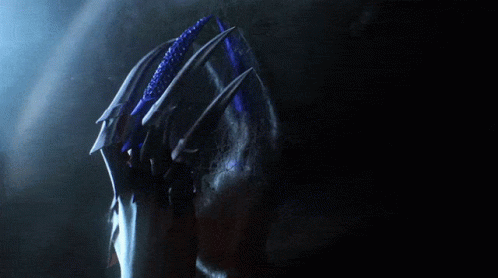
Breath… it found her senses. The breath slowly plunged into her lungs and gave her life. Coupled with her deep inhale was an intoxicating smell that clogged her nostrils. It eerily made more sense than the muffled screams that pierced the silence. But, her eyes were fixated on the origins of the smell. Bright hues gazed upon the red that painted her ivory skin, that dripped between her fingertips, and that cloaked her vision. Upon its reflection was a child grinning.
The emotion that distorted her features into a cynical expression was birthed from pure darkness. Lying before her was a man reaching for her face. His entire body twisted inhumanly, impossible ways, blood were pools over his once beautiful blue eyes, and his lips were cold, parched from his final breaths of life. An awakening transpired that precedented the times when the Enchanted Forest could rid themselves of these devils. Today, Morgiana had committed her first murder. She had killed her father...happily. “Odile…”

Hours prior, Morgiana was spending time with her father, learning about the reason for her troubling existence. The ever lingering pain that is tainting her heart could only be quenched with more violence. Any dark deed could work, but the harshest of evils satiated her the most. Sometimes it was hard to hear him, hard to understand what he was teaching her. Also, the animals her father kept in cages were becoming restless. It created an irritable itch to silence them. And that was the idea.
Rothbart removed one of the canary’s and placed it in the girl’s hand. Instinctively, Morgiana began to squeeze the poor defenseless creature’s tiny body. Her father smacked her across the face, her body not budging. She looked up, wondering why she was struck. He replied without hesitation, “Listen to your father first!” That caused her to squeeze more brutally as the yelps were turning into groans. He ripped the canary from her hands and examined it. “I wanted you to learn, Morgiana. Even if you were born from the Black Fairy’s power, that doesn’t mean you cannot think for yourself.” There was a hint of regret in his words. Morgiana didn’t understand it at the time, but he was trying to promote independence. He didn’t want the darkness to control her; he wanted her to control the darkness.
But, as the years passed, it was clear she would never learn. Her grin would only spread, and her insatiable need for power ever-growing.
#drabble#TW: abuse#tw: animal cruelty#tw: animal abuse#tw: blood#tw: death#+--+ Odile The Black Swan
2 notes
·
View notes
Text
The Gift Gets Delivered Without Noticing
Renoir's Birthday 4★ story (2/3) ( 1 - 2 - 3 )
Location: museum reception (morning) ; city (morning) ; museum hallway (night) ; atelier (night) | Characters: Renoir, Van Gogh, Da Vinci, Monet, Ingres

Da Vinci: Let me see, a new brush, black paint…
Renoir: Da Vinci, where are you going?
Da Vinci: Ah, Renoir-san. I am about to go out to buy some art supplies.
Renoir: If so, I'll go instead. Actually, I heard something interesting from Sisley the other day.
Da Vinci: If you are talking about that story, I was told about it too. Something about dangerous men walking around…
Renoir: Right, right. I'm afraid to let you go by yourself, so I thought I'd take your place, okay? I'm older than you, so if something were to happen, I would be able to handle it immediately. What do you think? Are you worried about leaving it up to me?
Da Vinci: It is not fair if you put it that way. ... If you insist that much, then please do it.
Renoir: Can you bring something to Van Gogh for me? I told him to take a break, but he wouldn't listen to me. I'm a bit worried.
Da Vinci: Understood. I will also contact Gauguin-san.
Renoir: Thank you, see you later.
—
Renoir: … I guess that's the end of the shopping for now. I'll just take it easy and go back–
Man: Woah!
Renoir: Ah!
Ouch… Are you okay? Here, take this… you dropped it.
Man: ! G-Give it back!
Renoir: Aaah!
… He's gone. I don't know why he was in such a hurry…
Monet: Renoir!
Haaah, haaah… Do you remember what the guy who just bumped into you looked like!?
Renoir: Uh, it was just for a second, so I'm not sure... what's wrong?
Monet: He's the latest criminal to do somethin' bad in town. Ya heard 'bout him from Sisley, didn't ya?
Renoir: Exactly. He said he's just playing tricks on everyone and getting them in trouble…
Monet: Right, right. I just saw some guy sprayin' oil on the road. I tried to catch him, but… Goddamn, I can't allow that! If somethin' catches fire, it'll be a big one!
Renoir: Sorry I missed him, but I'm glad nothing happened to you. If you got hurt, I'd be more worried about that. Even Bazille would make a big deal out of it.
Monet: He's gonna be pissed off at what I'm doin'. Hahaha.
… Sigh. In the meantime, I'm gonna go tell people 'round here 'bout that guy I just mentioned. There's a dangerous guy on the run, so be careful. It's better than doin' nothin'.
Renoir: You're a hard worker too, and that's great. But be careful.
Monet: Yeah! Ya too, be careful on your way back, Renoir!
—
Renoir: I heard a terrible noise just now, but who could it be at this hour…?
Man: … Hey, let go! Let me go!
Renoir: … Ah, you are…
Ingres: Good evening, Renoir-san. Do you know this person?
Renoir: I mean, I do know him... Monet says he's the culprit who's causing all kinds of trouble in the city.
Ingres: I see. So that's why he broke into the Palette Museum and committed crimes.
Renoir: ! He broke in here…?
Man: Hah, hahaha…! Now that you've seen my face, it's all over… I thought I'd harass you one last time. If I'm going to get caught anyway, I'll just do it!
Renoir: …!
Ingres: You're so selfish... Sooner or later, you would've been caught for your evil deeds.
Renoir: Ingres, where did he commit the harassment?
Ingres: My apologies, I didn't check. The moment I spotted him, I was attack–
Van Gogh: Aaaaaah!
Ingres: ! That voice just now…!
Renoir: I heard it from the atelier. I'll go check out, you take care of the culprit…!
—
Renoir: Van Gogh, what just happene–
Van Gogh: Renoir-san…! Here… our painting is…
Renoir: …! No way, the harassment he was talking about…
… Huh.
I'm sorry, Van Gogh. If only I had known earlier when he was going to break in…
Van Gogh: … It's wrong! It's not your fault, Renoir!
Renoir: … Thank you. However…
Van Gogh: … Let's start over! If we work together, we can make it…!
Renoir: Will you work hard with me one more time?
Van Gogh: Of course! Let's do our best!
#palette parade#palette parade tl#palepare#palepare tl#card tl#card translation#translation#renoir#pierre auguste renoir#4★
1 note
·
View note
Text
20+ Names That Mean Lost Soul: A Unique and Intriguing Spirit Name – Impeccable Nest
There are a few names from different cultures and languages that translate to "lost soul" or convey a similar meaning. Lost or wandering souls are motifs seen in various mythologies and religions.
One name is Alastor from Greek mythology. Alastor was a daemon whose role was to act as an avenger of evil deeds or crimes. He tracked down and pursued those who had committed wrong and brought them torment. The name itself means "avenger" or "punisher." However, it has ties to being lost or stray due to seeking vengeance and causing trouble for others.
In Irish mythology, Bodach could refer to a malevolent spirit or goblin associated with burials and the underworld. They were mischievous tricksters that led travelers off course at night to become lost. The name Bodach translates directly to "old man" but carries a more ominous inference.
Namariel is an Elvish name from J.R
https://linkhay.com/link/7249782/20-names-that-mean-lost-soul-a-unique-and-intriguing-spirit-name-a-impeccable-nest
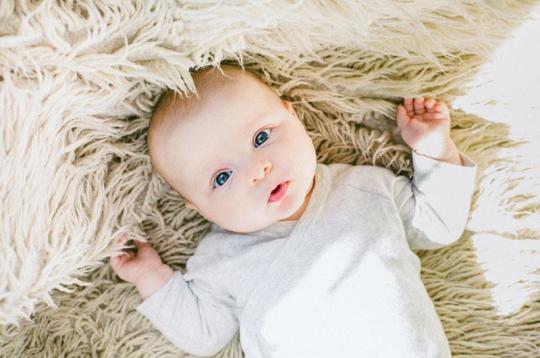
0 notes
Text
The Broken Covenant
11 The word that came to Jeremiah from the Lord: 2 “Hear the words of this covenant, and speak to the men of Judah and the inhabitants of Jerusalem. 3 You shall say to them, Thus says the Lord, the God of Israel: Cursed be the man who does not hear the words of this covenant 4 that I commanded your fathers when I brought them out of the land of Egypt, from the iron furnace, saying, Listen to my voice, and do all that I command you. So shall you be my people, and I will be your God, 5 that I may confirm the oath that I swore to your fathers, to give them a land flowing with milk and honey, as at this day.” Then I answered, “So be it, Lord.”
6 And the Lord said to me, “Proclaim all these words in the cities of Judah and in the streets of Jerusalem: Hear the words of this covenant and do them. 7 For I solemnly warned your fathers when I brought them up out of the land of Egypt, warning them persistently, even to this day, saying, Obey my voice. 8 Yet they did not obey or incline their ear, but everyone walked in the stubbornness of his evil heart. Therefore I brought upon them all the words of this covenant, which I commanded them to do, but they did not.”
9 Again the Lord said to me, “A conspiracy exists among the men of Judah and the inhabitants of Jerusalem. 10 They have turned back to the iniquities of their forefathers, who refused to hear my words. They have gone after other gods to serve them. The house of Israel and the house of Judah have broken my covenant that I made with their fathers. 11 Therefore, thus says the Lord, Behold, I am bringing disaster upon them that they cannot escape. Though they cry to me, I will not listen to them. 12 Then the cities of Judah and the inhabitants of Jerusalem will go and cry to the gods to whom they make offerings, but they cannot save them in the time of their trouble.13 For your gods have become as many as your cities, O Judah, and as many as the streets of Jerusalem are the altars you have set up to shame, altars to make offerings to Baal.
14 “Therefore do not pray for this people, or lift up a cry or prayer on their behalf, for I will not listen when they call to me in the time of their trouble.15 What right has my beloved in my house, when she has done many vile deeds? Can even sacrificial flesh avert your doom? Can you then exult?16 The Lord once called you ‘a green olive tree, beautiful with good fruit.’ But with the roar of a great tempest he will set fire to it, and its branches will be consumed. 17 The Lord of hosts, who planted you, has decreed disaster against you, because of the evil that the house of Israel and the house of Judah have done, provoking me to anger by making offerings to Baal.”
18 The Lord made it known to me and I knew;
then you showed me their deeds.
19 But I was like a gentle lamb
led to the slaughter.
I did not know it was against me
they devised schemes, saying,
“Let us destroy the tree with its fruit,
let us cut him off from the land of the living,
that his name be remembered no more.”
20 But, O Lord of hosts, who judges righteously,
who tests the heart and the mind,
let me see your vengeance upon them,
for to you have I committed my cause.
21 Therefore thus says the Lord concerning the men of Anathoth, who seek your life, and say, “Do not prophesy in the name of the Lord, or you will die by our hand”— 22 therefore thus says the Lord of hosts: “Behold, I will punish them. The young men shall die by the sword, their sons and their daughters shall die by famine, 23 and none of them shall be left. For I will bring disaster upon the men of Anathoth, the year of their punishment.”
0 notes
Text
Craig Tucker Character Analysis: Canon Overview, Pt. 2
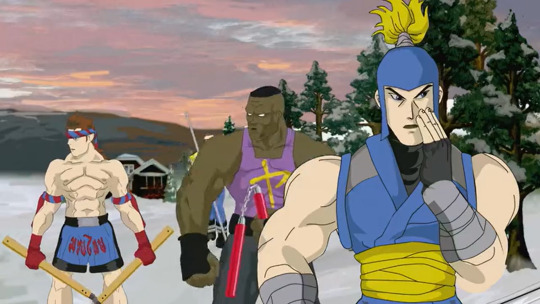
This is part two of my character analysis of Craig Tucker, beloved fictional 10-year-old and devoted nose-picker. You can find part one here. This section begins by juxtaposing Cartman and Craig and goes on to cover the emergence of Craig and those guys (hereinafter CATG) as a rival gang for the main four, and further developments from there.
After Craig’s canon character analysis is complete (only one part remains), I intend to do the same for Tweek before diving into their fanon portrayals throughout the years, and the way their relationship dynamics have generally changed over time within fan works. For now, more Craig:
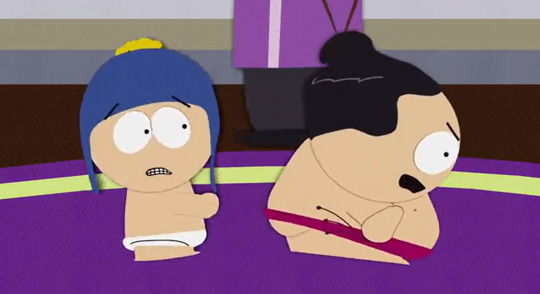
Craig vs. Cartman
While still in his bird-flippin’ phase, Craig is pitted against Tweek by the main four in “Tweek vs. Craig” because they both get in trouble often and the boys want to see who’s tougher. Here, as in “Pandemic” (S12E10) later on, the irony is that they themselves are far worse-behaved than Craig. He’s a discipline case, but the main four (and Cartman in particular) have committed far more egregious acts.
They know when they’ve done something wrong and, often at Cartman’s behest, take the extra steps to stay out of trouble. By contrast, Craig seems to have genuine difficulty with impulse control and with adapting his behavior to what’s appropriate for the setting; consequently, he is unable to keep himself out of trouble in the same way the main four can, so he looks worse on paper.
Cartman often knowingly engages in immoral acts that he rationalizes to himself because he’s always the hero in his own mind, a process thoroughly detailed in “Fishsticks” (S13E05). Episodes like “Toilet Paper” (S07E03), “Casa Bonita” (S07E11), “Two Days Before the Day After Tomorrow” (S09E08), and “The Magic Bush” (S18E05) provide a different explanation for Cartman’s mindset when keeping out of trouble; in these, he’s shown to have serious problems with empathy and only understands he’s done something wrong in the sense that he knows he’d get in trouble if anyone were to find out he was responsible.
Analyzing Cartman would have to be its own extremely long post, as his characterization re: his bad deeds is hardly consistent. Sometimes his ego requires him to believe he’s the good guy, he’s got a hot beefcake bod, everyone really likes him (see: his speech at the end of “Breast Cancer Show Ever”, S12E09); and sometimes he’s Tony Montana in the speech from Scarface he recites in the talent show in “Erection Day” (S09E07): “You need people like me! You need people like me so you can point your f*cking finger and say, ‘That’s the bad guy!’”
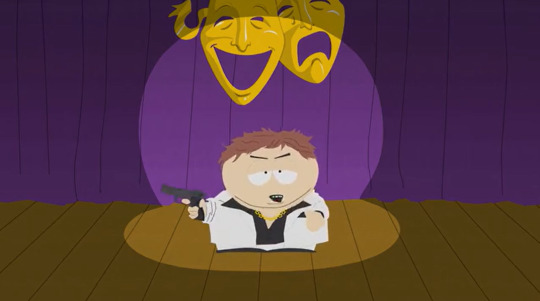
By contrast, Craig is arguably amoral and somewhat violence- and anger-prone on his worst behavior, more of a neutral, uninvolved party most of the time, and a rational, compromise-minded problem-solver at his best in terms of his treatment of others. He’s not motivated by doing what he thinks is most morally righteous, like Tweek, Kyle and Jimmy are (all three of whom put lawful as their alignment in their character sheets in TFBW, while Craig put neutral).
In the amusement park scene in “Put It Down” (S21E02), this difference in motivations causes the tension between Tweek and Craig to boil over. It becomes clear that Craig considers being rational and even-tempered his highest virtue (though this isn’t an entirely accurate self-perception as he’s fairly easily provoked at times), and he’s frustrated when Tweek’s lack of positive response to his reasoning makes him become more emotional, like Tweek.

He also encourages Jimmy to compromise with Cartman in “Fishsticks” (S13E05), and disagrees with Kyle over whether it matters that Cartman didn’t actually write any of the joke. Tweek’s line in TFBW about justice over evil is comically melodramatic, but also reveals a greater truth about their dynamic – not that Craig is evil, but that he’s not driven by the pursuit of the most moral good. Craig is more of a utilitarian and a pragmatist.
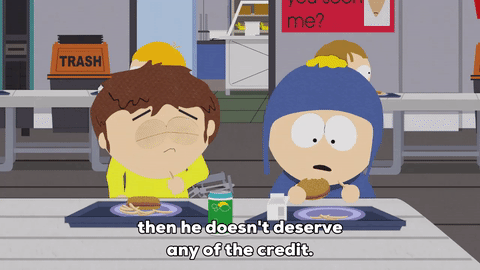
In “Le Petit Tourette” (S11E0), Cartman and Craig both think Tourette’s syndrome (or, more accurately, having a swearing tic) makes you cool as hell, but Cartman uses his (limited) knowledge of it to put forth a mockery of Tourette’s for his own gratification (like being able to degrade Kyle’s mom to her face with impunity). By contrast, Craig is so genuinely enamored of Thomas’s ability to swear without getting in trouble that he wants nothing more than to bask in it vicariously. The joke here is that Craig is such a messed-up kid, he truly just loves swearing for its own sake. He’s gay for swearing.
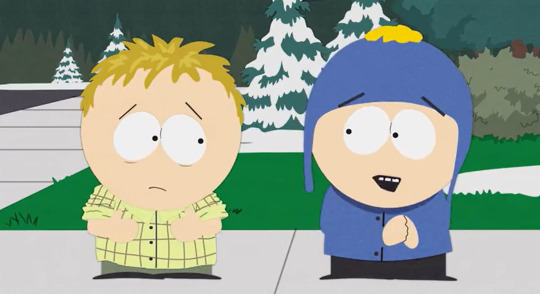
Cartman manipulates Craig for his own gain in “Tweek vs. Craig”, all of the main four use him for his birthday money in “Pandemic”, and Cartman mimics and exploits Thomas’s condition for his own sick pleasure in “Le Petit Tourette”. Craig wouldn’t think to do any of those things and he wouldn’t get a kick out of it in the way Cartman does. He’s more of a simple schoolyard bully, at least in the early seasons. He’s shown to be a gossip in “Bass to Mouth” (S15E10), seems to want to keep abreast of developments in “Breast Cancer Show Ever” in that he is instrumental in gathering and relaying information to the involved parties, and is often petty - but he’s not manipulative. Even if he wanted to manipulate, he likely wouldn’t have the necessary people skills to pull it off. He will, however, engage in a Cartman scheme when it benefits him, even if it’s wildly immoral, as in “Crack Baby Basketball Association” (S15E05).
Emergence of Craig as Stan’s Foil, CATG as Rival Group
Starting in “South Park Is Gay”, Craig becomes more of a foil for Stan and is shown to have his own clique like Stan has in Kyle, Cartman, and Kenny. Stan and Craig look similar and both lead their respective groups, and in “Lil’ Crime Stoppers” (S07E06), the black-haired kid leading the rival gang of “FBI agents” introduces himself as Agent Tucker.
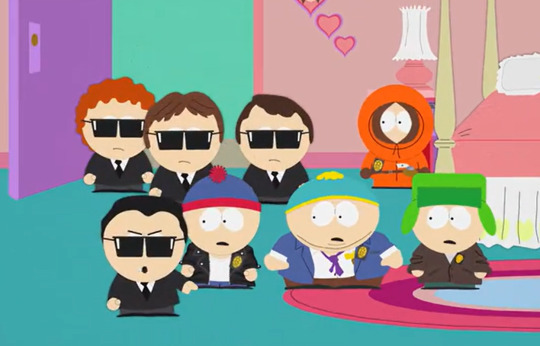
This kid is clearly not Craig, as he has a different hairline and puts on some kind of old-timey detective voice that, frankly, Craig could never pull off. Craig doesn’t have a lot of range in terms of vocal expression, and none of those guys are CATG members. Nevertheless, the show sets the stage for a recurrent rival group, and then we get them just two episodes later in “South Park Is Gay” in the form of these fab metro boys:
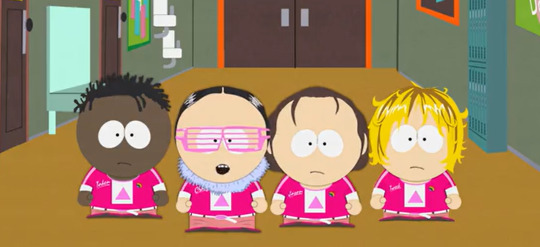
Craig is sometimes an antagonist and sometimes an ally to the main four, but he is not one of the main four, and the show is by and large told from their perspective. This may be why Craig is sometimes actually a dick, and sometimes inordinately reasonable and 100% correct in his very blunt assessments of the situation at hand. South Park’s characterization also isn’t terribly consistent and Craig began as a background character, so these appearances in season 7 and 8 may have been attempts to situate him (and some of the other children) in some relation to the main four so that they could be used to create conflict and drive plot lines.
As an antagonist to the main four, Craig can be quite aggressive and combative in his tone. In “Quest for Ratings” (S08E11), Craig is socially dominant, acts confident and assertive, and seems to thrive off of one-upping Stan and his crew (which notably includes Jimmy, Butters, and Token). Stan’s group is similarly motivated by the desire to one-up Craig as they immediately lose interest in doing their school news show once they beat him in the ratings. At one point in the episode, Craig approaches Stan and his crew at Whistlin’ Willy’s in effect to mock them for their show having been canceled and to brag about his “overall deal” with the school. Similarly, when Stan and his crew acquire ninja weapons in “Good Times with Weapons” (S08E01), they immediately head to Craig’s house to brag and show them off, which triggers Craig’s competitive nature and ultimately leads to the Legendary Battle of Tokugata.
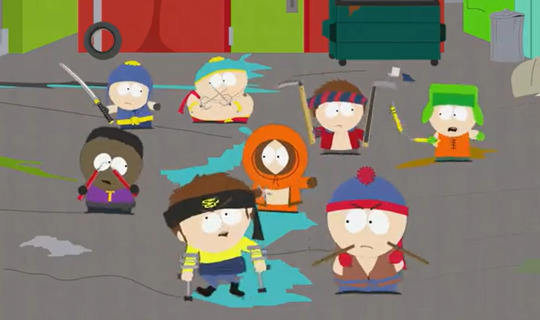
The dynamic between the two groups is competitive on both sides, but this dynamic does not remain antagonistic for very long. Several season 9 episodes feature Craig (and other boys in the class) working with the main four in some capacity, such as in “The Death of Eric Cartman” (S09E06) when all the boys ignore Cartman for being such a dick all the time, in “Marjorine” (S09E09) when all the boys work together to infiltrate Heidi’s sleepover to obtain a cootie catcher, and in “Free Willzyx“ (S09E13) where the boys all work together to get that space whale back to his home on the moon. Craig is also as unenthusiastic about baseball as all the other boys in “The Losing Edge” (S09E05), though he does still take the opportunity to yell at Stan, but this shift in the dynamic between Craig/CATG and Stan/the main four holds steady. The antagonism that rears its head between Craig and the main four at various points in the series, notably in the “Pandemic” two-parter (S12E10-11), seems based more on ideological differences. Craig objects to the way the main four get themselves into increasingly more ridiculous situations and refuse to examine their own role in escalating such situations.

He hasn’t been a real antagonist since the Black Friday trilogy (S17E07-9) (and even then, he was arguably just a catalyst for the real conflict to emerge among the main four), and is now more of a reluctant, naysaying ally to the group. He will join up to have something to do, as seems to be the case in the games, or if it’s something Tweek wants or needs, such as in “Splatty Tomato” (S21E10). He now also has his own episodes with Tweek (i.e., “Put It Down”, S21E02) or B-plots within episodes (i.e., “Buddha Box”, S22E08), ever since “Tweek x Craig” (S19E06) when they became a canon couple (in at least some capacity, depending on one’s interpretation of the ending).
Craig Tucker: Dick Supreme
Even outside of the dynamics between their groups, Craig himself takes issue with much of what the main four do and periodically objects to the way they approach problems generally. The way he expresses his disapproval varies depending on the degree of social power he has over the boys at the given moment, though also depending on whether Craig is in his nemesis or his ally era. In “Quest for Ratings”, Craig is quick-witted, responding immediately when Stan tells him his idea took “this much thought” that that’s still “this much more than [Stan] had.”

On the other hand, in “Professor Chaos” (S06E06), Craig clearly fails to join in on the “playful” insults the main four engage in regularly, adding “Oh, uh – you guys are dumb” after Kyle and Cartman exchange their typical “fatass” and “stupid Jew” epithets. It seems likely his ability to insult people is contingent on his actually feeling negatively towards them, and in this episode, he is trying to join their gang.
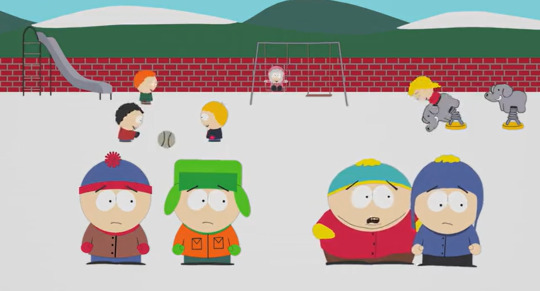
Later on, in the season 12 episodes “Pandemic” and “Pandemic 2: The Startling”, Craig is highly effective at putting down the main four, but he’s not even really insulting them. He’s just telling it like it is, and this becomes a central feature of Craig’s character that fans seem to enjoy and connect with, and (perhaps for this reason) is subsequently incorporated into his character more often.
For example, he calmly and matter-of-factly shows Stan up for thinking any 80s music is going to be “cool” and kickass in their search for Ike in “Splatty Tomato”. As in “Pandemic”, where Craig’s critique of the main four is ultimately aimed at the show itself, his criticism in “Splatty Tomato” also serves as a meta-critique on the trend of popular contemporary franchises set in the 80s using “cool” 80s music rather than what was actually on the radio at the time.
His well-loved “Peru” one-liner two episodes later in “Elementary School Music” (S12E13) similarly breaks the typical cartoon format wherein plots from episodes past are typically forgotten in the episodes that follow. It is also funny for the same reasons his criticisms of the gang in Pandemic are funny; they actually were in Peru - he’s just stating facts.
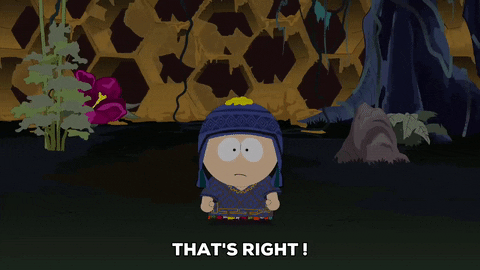
In the “Pandemic” episodes, Craig serves a similar role to Frank Grimes in the Simpsons episode “Homer’s Enemy” (S08E23), in the sense that he forces the viewer to consider whether the main characters are just, and whether the viewer is justified in rooting for them. But whereas Frank Grimes is incensed throughout the episode that Homer has such a good life despite his unbelievable sloth and stupidity, Craig acts as though he is merely inconvenienced by the main four’s inability to disengage from outlandish situations.
He expresses his displeasure in slow, monotone statements that only cut deep because they’re true (“you guys are jerks” is not exactly roast material), and because we never considered they might be viewed unfavorably by their peers. Craig is also a vehicle for the show’s own self-critique, and the show churns out increasingly more outlandish twists to prove him wrong, in a way.
Nevertheless, he remains unflappable (”Okay, now there's sparks shooting out of my eyes.”), and maintains that none of this stuff is normal and that the main four are the common denominator. When it turns out Craig is part of an ancient Incan prophecy, they argue that he’s actually responsible for some of this nonsense, not them, but he keeps his cool and, in essence, chooses to opt out.
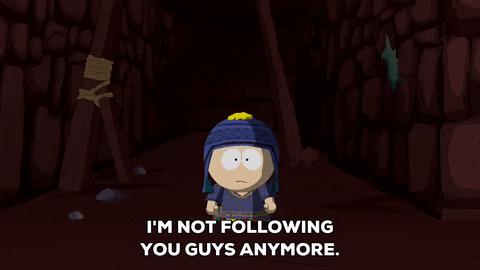
________________________
That was part 2! Thank you for reading - I was surprised at the big response to part 1, but because people seem willing to read long posts in a way I hadn’t anticipated, I’ve made changes to the course of my analysis after this canon Craig series.
My initial plan was to do canon and then fanon analysis of just Craig, but I’m really interested in how Creek has developed as a ship. So, as I mentioned at the start of the post, I will do a Tweek canon character analysis next and then get into how their fanon portrayals have evolved over the years - as individuals, and as a couple. I’m glad to make this change bc canon Tweek is instrumental in the changes Craig’s character has undergone in canon and in fanon. And also I just love him, ok???
Part 3 - coming soon to a dash near you, maybe - covers Craig’s characterization in the mid-late teen seasons and in Stick of Truth, and then gets into his character development in “Tweek x Craig” and going forward from that point.
#south park#craig tucker#south park analysis#character analysis#eric cartman#autism#autism representation#catg#stan marsh#jimmy valmer#kyle broflovski#tweek tweak
204 notes
·
View notes
Text
A String That Binds Him
Within his conscience and subconsciousness, he dangles with the karmic binds that tie him to his bloody deeds. They are black and tight that pulls at his soul towards the dark abyss of madness. Xiao hates those strings, and when another one manifests, he is more than scared.
Pairings -> Xiao x Reader
Word Count -> 1312
Themes -> I dunno either you tell me, short fic
Series -> #Sojourner Specials (600 Followers Event) Exiled's Xiao Manifestation Ritual
Warnings -> It's... not my best, I'm here to manifest

The first manifestation of the signs of a new string happened on the first encounter, when their eyes met his amber ones. Just another mortal lingering by the balcony, he thought to himself, just another mortal. Xiao knew of the human ways in which they desperately cling to divine blessings, to meet the Adepti for a miracle.
But his heart skipped in a painful way and like the wind he was gone within a second.
"Verr, who is that person in the balcony? They're dangerous, why are they allowed here?"
But the agent could only tilt her head at the intonation and he grew ever more frustrated at this mistake. Is the Qixing faulty to let a threat in so easily, more so in his territory? But Verr simply assured that they've done a background check beforehand, that they were no threat at all, just a simple citizen passing by.
But Xiao was restless, and when he looked again, the pain in his chest did not disappear.
Next thing was tantalizing fear enough to paralyze him.
Like a shadow that clings to his form no matter where so long as there is light, such entity lingers behind him unknowingly. When they spoke in which the first he has heard their voice, he froze with his back towards them. The most vulnerable he had been, and a rule he broke in war where one should not turn their back to the opponent.
When they called his name again, Xiao felt the familiar tug of agony before he willed himself to look with a seething glare worthy to vanquish all evil. But they withered under the gaze like a wolf wary of their injured paw when meeting strangers. A sign that they were a lesser being than him and yet the grip around his heart tightens tenfold.
"What are you doing here? Don't you know how dangerous it is around here?"
When they tilt their head to look past his shoulder, he was painfully aware of the massacre of hilichurls behind him, one he had recently vanquished.
"Seems to me that these dangers are taken care of already tho," they offered a smile which looped back down at the edges upon the look of distaste the adepti offered.
Xiao didn't wish to hang around longer than he should, but when they called out to him as he was about to leap off, his body locked again. Unceremoniously he tumbles down forward upon the inertia of his paralyzed leap.
And he knew from behind him that it took the mortal all their willpower not to mock him with the rawest laugh.
After those first two encounters were nothing but restless days of consciousness for the adepti where he longs for the night where such phenomenons would not exist, where he will be alone with his thoughts to ponder over without any other intrusion.
But even then he finds no solace in the voices in his head, even if they were only less painful than the ones he had been experiencing lately.
Their presence created a new binding that straps his soul and it tugs him at directions he cannot seem to predict. His karmic binds wrap around his limbs to fully pull him apart, yet this one wishes to tug him forward against the old binds, and the opposing forces brings him immense pain that gnaws at him 'til dawn.
The next instance of the bind's existence comes in the form of breathlessness. When their light touch found its way to his exposed bicep, the unexpected motion caused his lungs to stutter for a second, the need for air leaving him before he was slammed back by reality.
How he knew it was the mortal without even looking he did not know, as he was too busy scrambling away as if their touch was seering hot. Xiao's glare was unfocused as he willed himself manually to breath in and breath out.
"You were spacing out," he seems to be doing that lately, "I've been calling for you but you wouldn't budge." Did he really not hear them? "A-Are you okay, can you breath properly?"
No.
No, he doesn't know why he's having the trouble in the first place. The Yaksha lays himself vulnerable in front of them as his heart beats loudly and furiously at the loss of oxygen, it was a manifestation of one of the 'attacks' that shouldn't come this early unless provoked.
Before he knows it, they too invaded his being in the form of soft rubs to his back and whispers of increasing numbers. He follows suit in their guidance even with a few hiccups and soon enough his breathing stabilizes, his heart still trying to follow the calmness of it.
Did I scare you?
No.
I'm sorry.
There's no need to be.
The Yaksha's heart rested for a full second but the detail was missed when Xiao saw the pure pity in their eyes.
No, this person was no Adepti, no demon, no God, no other being. Only a mortal, a human with a soul that shall wither away too. The thought seemed to pull that stray string once again.
The third- or was it fourth? Counting didn't matter now that he was too far gone, but the next manifestation felt more worrying than the others as it was a sign he was not at all accustomed to. It made no sense, it was windy that day at the balcony and the sun barely peeked in past the horizon as it starts to sink for the cold night's entrance.
And they were there to obscure the sunlight that tries to reach him. Hovering over the railing that overlooks the marsh, his gaze caught their side profile as strands of hair falls from the fray, little rays passing through the curtain of the hair that frames their face.
It didn't make sense. No sense at all. And yet he was there to be another mess when he felt the burning sensation wash over his thinly clothed form.
There was nothing special about this human, no Vision exists to force such temperal reaction from him but it. still. happened.
And when they turned to look at him, Xiao dared look away pointedly as the trance of warmth messed more with his thoughts, the change in body temperature reaching his head in a faster pace. He is overheating and so he excuses himself as he disappears, the only sign of Xiao's whereabouts was the distant loud splash somewhere by the marsh.
The mortal choked at the image the plunge brought.
Finally one faithful day, Xiao confronted such merciless feelings to the only mortal he trusts the most. And he found Boss Verr grinning lightly, mischievously. Carrying behind it a secret he doesn't know.
"Dear Adepti, what you are feeling are what we humans call infatuation. Love sickness, even." He dons himself an apalled expression and it takes the woman all willpower not to crack up.
This heinous manifestations of agony are akin to that of human affection? Of romantic disease? If this is what humans deal with naturally, why do they commit themselves at such masochistic indulgences?
So warily he asked, how does one remove such emotions? If it were truly humane feelings that he harbours, then humane means can easily vanquish it unlike the binds holding him down. Speaking of, they've been very tame lately-
Under the guidance of Verr's simple advice of 'being honest with your feelings', Xiao diligently awaits for the mortal in the balcony. And when they finally showed up, he blurts out the worries he had to deal with since the moment they came to his life, loudly enough for a floor lower to hear his confession.
"You terrify me."
This was followed by the frantic steps of a sprinting Verr who desperately tries to make damage control.

A lil drabble hehe, first time trying third person pov bruuuuh
@kookieyachi @struggljng @bunniesrorange @anormalguyreader @moaa @dandelion-dreams @witchsungie @lehra @zelos-simp @legionqueensav @snackgod @rxsalinee @cala-ran @wind-wheel @lilydewi22 @yellowflowre
#xiao x Reader#genshin impact#genshin impact x reader#Exile.flower#Sojourner specials#gender neutral
404 notes
·
View notes
Text
Jaime & Tyrion: Brotherly Love Defying Societal and Familial Toxicity
Jaime and Tyrion—Handless and Noseless, the Lannister boys!—have only shared two on-page scenes together, and yet their dynamic is one of the most vital and unforgettable ones in all of the novels. They are both so woven within each other's narrative and core that not even barely interacting on page can diminish what they mean to each other, as characters and brothers. What Jaime and Tyrion share is a powerful bond, one that shines through a family otherwise writhe with dysfunction and abuse.
And how their love is expressed internally and externally showcases their characterization, as well as their relationship’s theme of positive familial affection, and the strength of that—not only within itself, but how it strengthens both brothers. How it helps them deal with ableism, trauma, escape Lannister toxicity, and even learn to understand love outside of one another.
Essay under the cut.
Tyrion’s Influence on Jaime’s Morality, Empathy, and Growth
Jaime's connection to Tyrion is quite essential to his character arc.
For one, his love for Tyrion is one of the first things we learn about Jaime that shows there is more to him than being an incestuous attempted child murderer, and the framing and timing of that information is quite deliberate. We get this quote from Tyrion . . .
During all the terrible long years of his childhood, only Jaime had ever shown him the smallest measure of affection or respect, and for that Tyrion was willing to forgive him most anything. (AGOT, Tyrion I)
. . . after the chapter where Jaime pushes Bran. The reader is first led to see Jaime as a monster by witnessing his monstrous deed, and then gets whiplash on his character. He is someone who fucks his sister and cripples children, but he is also someone who has compassion and love for his disabled brother in an extremely ableist world. This shapes Jaime's character from black to grey, or at the very least, from a darker shade of grey to a lighter one.
While Jaime's character was never one dimensional—even in Bran's chapter, his first instinct was to save Bran's life, not take it—revealing that he is kind to his dwarf brother not only shows that there is much more to him than meets the eye, but also furthers the characterization GRRM has given to us so far—that Jaime Lannister is motivated by love, for good or ill.
Loving Cersei and wanting to protect her caused him to try to murder a child, but loving Tyrion makes Jaime see him as human, despite the ableist society they live in. Love makes Jaime commit good, and evil, and everything in between. Learning how he treats Tyrion is the first time we see Jaime's love manifest in a positive way that not only hurts no one, but actually helps support and heal someone who needs it.
In turn, Jaime’s love for Tyrion also manifests in a questionable way, as it was also what led to him having Ned's men murdered, in response to Tyrion's kidnapping:
Jaime Lannister smiled. "Quite true. I'm looking for my brother. You remember my brother, don't you, Lord Stark? He was with us at Winterfell. Fair-haired, mismatched eyes, sharp of tongue. A short man."
"I remember him well," Ned replied.
"It would seem he has met some trouble on the road. My lord father is quite vexed. You would not perchance have any notion of who might have wished my brother ill, would you?"
"Your brother has been taken at my command, to answer for his crimes," Ned Stark said.
"Tregar, see that no harm comes to Lord Stark." . . . "Still … we wouldn't want him to leave here entirely unchastened, so"—through the night and the rain, he glimpsed the white of Jaime's smile—"kill his men." (AGOT, Eddard IX)
Jaime's protectiveness of Tyrion contributes to portraying the neutrality of Jaime's love. It is not good or evil; it simply is, and is as unyielding, fierce, and beautiful as his swordplay.
Also, loving Tyrion made Jaime understand—though on a subconscious level—Brienne's status as a societal pariah, which caused him to try and make amends with her:
She reminded him of Tyrion in some queer way, though at first blush two people could scarcely be any more dissimilar. Perhaps it was that thought of his brother that made him say, "I did not intend to give offense, Brienne. Forgive me." (ASOS, Jaime II)
He also calls Brienne by her actual name here, rather than wench. This could be because comparing her to Tyrion seemed to humanize her in Jaime's mind, and made him truly empathize with her for the first time. It might have been part of what drew him to her, so it could be argued that Jaime's love and empathy for Tyrion—i.e. having a relationship with a societal pariah—played a part in kickstarting his relationship with Brienne, who is also a pariah because of her appearance, similarly to Tyrion.
It’s quite possible that Jaime seeing past Tyrion’s appearance and loving him regardless was a narrative sign all along that he would fall for someone like Brienne. Obviously Jaime’s familial love for Tyrion isn’t the same as his romance with Brienne, but even still, Jaime kissing Tyrion’s facial scar ...
Then Jaime went to one knee and kissed him quickly once on each cheek, his lips brushing against the puckered ribbon of scar tissue. (ASOS, Tyrion XI)
... shows that ugliness will not stop Jaime from showing affection, even upon that ugliness. Brienne has a newly acquired facial scar as well, on her cheek. Jaime kissing Tyrion’s scar could be foreshadowing for him kissing Brienne’s, especially since he has already realized the two characters’ similarities in his mind. (I am incredibly biased and want a JB Cheek Scar Kiss more than anything, however, so take this tidbit with a grain of salt.)
Jaime is also empathetic and emotionally intelligent enough to compare his maiming to Tyrion's dwarfism, understanding that he has now begun to share the experience of being subjected to ableism, and realizing what Tyrion has had to deal with his entire life:
He had taken wounds before, but never like this. He had never known there could be such pain. Sometimes, unbidden, old prayers bubbled from his lips, prayers he learned as a child and never thought of since, prayers he had first prayed with Cersei kneeling beside him in the sept at Casterly Rock. Sometimes he even wept, until he heard the Mummers laughing. Then he made his eyes go dry and his heart go dead, and prayed for his fever to burn away his tears. Now I know how Tyrion has felt, all those times they laughed at him. (ASOS, Jaime IV)
Before Jaime lost his hand, he couldn't quite understand why Brienne and Tyrion were similar in his mind. Once he becomes disabled, his emotional intelligence and empathy makes him see himself as having acquired a second kinship with Tyrion that goes beyond blood. It's as sad as it is sweet.
After the Rebellion, Tyrion became as much of a coping mechanism for Jaime as Cersei. He relies on both of them to essentially keep his sanity and deal with all of his traumas.
The most overwhelming example of this is the fact that Tyrion was a huge part of the reason Jaime chose not to commit suicide after losing his hand:
The wench had the right of it. He could not die. Cersei was waiting for him. She would have need of him. And Tyrion, his little brother, who loved him for a lie. . . . . When morning came, he made himself eat. . . . Live, he told himself harshly, when the mush was like to gag him, live for Cersei, live for Tyrion. Live for vengeance. (ASOS, Jaime IV)
Even when Jaime is in an ungodly amount of pain and mental anguish, he is selflessly thinking of the welfare of his little brother, and how he must live—not for himself, but so that he can protect Tyrion.
Protecting Tyrion also played a part in severing Jaime's ties with Cersei:
She clutched his good hand and held it tight in hers. "He told me he was going to do it. Joff knew. As he was dying, he pointed at his murderer. At our twisted little monster of a brother." She kissed Jaime's fingers. "You'll kill him for me, won't you? You'll avenge our son."
Jaime pulled away. "He is still my brother." He shoved his stump at her face, in case she failed to see it. "And I am in no fit state to be killing anyone."
"You have another hand, don't you? I am not asking you to best the Hound in battle. Tyrion is a dwarf, locked in a cell. The guards would stand aside for you."
The thought turned his stomach. "I must know more of this. Of how it happened." (ASOS, Jaime VII)
This was not the first time Jaime has protected Tyrion from Cersei’s violence. He did when they were children, as well:
[... Oberyn Martell] continued. . . . “When I commented that you seemed a poor sort of monster, your sister said, 'He killed my mother,' and twisted your little cock so hard I thought she was like to pull it off. You shrieked, but it was only when your brother Jaime said, 'Leave him be, you're hurting him,' that Cersei let go of you. (ASOS, Tyrion V)
However, it was the first time Jaime denied something so substantial to Cersei, and it was out of love for Tyrion. He chose to protect his brother, rather than carry out his sister's command and murder him.
It should also be noted that Jaime believes that Tyrion wouldn’t have killed Joffrey simply because Joffrey is Jaime’s seed:
"He killed him, Jaime. Just as he'd warned me. One day when I thought myself safe and happy he would turn my joy to ashes in my mouth, he said."
"Tyrion said that?" Jaime had not wanted to believe it. . . . He knew the boy was mine. (ASOS, Jaime VII)
And Jaime was right—Tyrion explicitly had the thought that he would never hurt Joffrey, not because child murder is wrong lmao, but because Joffrey is Jaime’s son, and Tyrion loves Jaime:
A chill crept down Tyrion's spine as he realized what [Bronn] was hinting at. If Tommen was king . . .
There was only one way Tommen would become king. No, he could not even think it. Joffrey was his own blood, and Jaime's son as much as Cersei's. (ACOK, Tyrion IX)
Jaime believes Tyrion’s innocence because of their mutual love and positive bond, and it contributes to his estrangement with Cersei.
Jaime then later frees Tyrion from prison and saves his life, despite knowing Cersei wanted him executed:
He had waited in the eunuch's chambers that night, when at last he had decided not to let his little brother die. (AFFC, Jaime I)
And even when Tyrion lies and claims to have murdered Joffrey, Jaime still does not obey Cersei and “avenge their son” as she asked:
“ . . . And I am the monster they all say I am. Yes, I killed your vile son." He made himself grin. It must have been a hideous sight to see, there in the torchlit gloom.
Jaime turned without a word and walked away. (ASOS, Tyrion IX)
Jaime prioritizes his need to protect Tyrion over carrying out Cersei’s desires; he cannot bring himself to hurt his brother, even after such a confession. Thrice Jaime is caught between his brother’s safety and his sister’s violence, and thrice he chooses safety.
Jaime's positive love for Tyrion is a key factor in showing Jaime's growth, and finding an identity outside of Cersei. The fact that Jaime has always loved Tyrion while Cersei despised him, and chooses Tyrion’s safety over Cersei’s satisfaction—even when they were children—was one of the many evidences that he was always an individual, always his own person, as opposed to simply one half of Cersei’s whole. However, in actively defying a direct order of Cersei’s by choosing Tyrion, Jaime is starting to realize that for himself. And while on his journey of self discovery, his love for Tyrion—something that overcomes the darkness and toxicity that his sister and their incest promotes—is one of the things about himself that he keeps.
Jaime’s Effect on Tyrion
While Tyrion is one of Jaime's coping mechanisms, Jaime is Tyrion's safe place in turn. For Tyrion's entire life, Jaime was the only one who has shown him love and protected him, and so, Tyrion sees him as his hero and protector:
"Imp," Lysa said coldly, "[. . .] Remember where you are. This is the Eyrie, and these are knights of the Vale you see around you, true men who loved Jon Arryn well. Every one of them would die for me."
"Lady Arryn, should any harm come to me, my brother Jaime will be pleased to see that they do."
[. . .] Lysa glared at him. "You demanded a trial by combat."
"And now I demand a champion, such as you have chosen for yourself. My brother Jaime will gladly take my part, I know." (AGOT, Tyrion V)
"They made me fight a battle without my big brother to protect me." (ASOS, Tyrion XI)
When Tyrion is saved at the Blackwater, he thinks it must be Jaime who has rescued him, as no one else would have cared to:
And suddenly he lurched to the left, staggering into the rail. Wood split, and Ser Mandon Moore vanished with a shout and a splash. An instant later, the hulls came slamming together again, so hard the deck seemed to jump. Then someone was kneeling over him. "Jaime?" he croaked, almost choking on the blood that filled his mouth. Who else would save him, if not his brother? (ACOK, Tyrion XIV)
He also tries to emulate Jaime to feel brave when he is in times of distress:
Tyrion wondered whether this was the last sunrise he would ever see … and whether wondering was a mark of cowardice. Did his brother Jaime ever contemplate death before a battle? (AGOT, Tyrion VIII)
The painted wooden armor clattered as Pretty trotted across the deck. Tyrion's armpits were prickly with perspiration, and a bead of sweat was trickling down his scar beneath the oversized, ill-fitting helm, yet for one absurd moment he felt almost like Jaime, riding out onto a tourney field with lance in hand, his golden armor flashing in the sun. (ADWD, Tyrion IX)
And dreams of being like him:
This time he dreamed he was at a feast, a victory feast in some great hall. He had a high seat on the dais, and men were lifting their goblets and hailing him as hero. Marillion was there, the singer who'd journeyed with them through the Mountains of the Moon. He played his woodharp and sang of the Imp's daring deeds. Even his father was smiling with approval. When the song was over, Jaime rose from his place, commanded Tyrion to kneel, and touched him first on one shoulder and then on the other with his golden sword, and he rose up a knight. Shae was waiting to embrace him. She took him by the hand, laughing and teasing, calling him her giant of Lannister. (ACOK, Tyrion XV)
I think this is why learning the truth of Tysha—and Jaime's part in that deception—was the last straw for Tyrion, and caused him to have a psychotic break. Tyrion has always been abused, neglected, and refused love by everyone but Jaime. Only with Jaime does he feel loved, and safe, and humanized. After losing his trial by battle and awaiting death, Tyrion thinks Jaime is the last and only good thing in his life, the one positive constant. Jaime comes to free him, and Tyrion’s elated, feels protected again . . . and then Jaime drops the bomb, that he lied about Tysha, and that Tywin made him do it.
It was a betrayal Tyrion couldn't handle. Tyrion saw Tywin as taking the last precious thing from him—the pure and untainted bond he had with his big brother—as well as a stolen future he could have had with Tysha. Losing Tysha and Jaime at the same time broke him. That alone shows Jaime’s importance to Tyrion.
Defying Tywin’s Toxicity
What I find especially tragic about the Tysha thing is that, while Jaime did betray him, it was done out of love:
"She was no whore. I never bought her for you. That was a lie that Father commanded me to tell. [. . .]”
[. . .] Jaime could not meet his eyes. Tysha. He tried to remember what she had looked like. A girl, she was only a girl, no older than Sansa. "My wife," he croaked. "She wed me."
"For your gold, Father said. She was lowborn, you were a Lannister of Casterly Rock. All she wanted was the gold, which made her no different from a whore, so . . . so it would not be a lie, not truly, and . . . he said that you required a sharp lesson. That you would learn from it, and thank me later . . ." (ASOS, Tyrion XI)
Tywin convinced Jaime that Tysha was only using Tyrion for his money, that she didn't love him, and that lying to break them up would save Tyrion from future heartbreak. Tywin knew Jaime's love for Tyrion and desire to protect him would make him follow his command. And Tywin knew that Tyrion would believe Jaime because of that love, and he was right:
His thoughts turned to Tysha, who had so briefly been his lady wife. It was Jaime, he thought, despairing. He was my own blood, my big strong brother. When I was small he brought me toys, barrel hoops and blocks and a carved wooden lion. He gave me my first pony and taught me how to ride him. When he said that he had bought you for me, I never doubted him. Why would I? He was Jaime, and you were just some girl who'd played a part. I had feared it from the start, from the moment you first smiled at me and let me touch your hand. My own father could not love me. Why would you if not for gold? (ADWD, Tyrion V)
Tywin weaponized Jaime's love for Tyrion and Tyrion's trust in Jaime in order to manipulate both brothers, and also as a way to sour their pure relationship. There's no way Tywin ever approved of Tyrion and Jaime's strong, loving, positive bond; it "distracts" Jaime from his duty to House Lannister, as well as—in Tywin's eyes, I believe—insults both Tywin and Joanna, for their strong, golden, beautiful, able bodied, perfect heir to love the twisted creature that murdered his mother and brought shame upon their House with his birth. Also, Jaime's love brings Tyrion happiness, makes him feel human and equal, and when has Tywin ever wanted that?
For Tywin, having Jaime contribute in the destruction of Tyrion and Tysha's marriage killed two birds with one stone; it played a part in Tyrion's humiliation and abuse, but also puts a damper on Tyrion and Jaime's bond, even if only on Jaime's end, because while Tyrion was in the dark, Jaime would know the truth.
And the truth does haunt Jaime:
“ . . . I will say, I think it passing odd that I am loved by one for a kindness I never did, and reviled by so many for my finest act.” (ACOK, Catelyn VII)
. . . And Tyrion, his little brother, who loved him for a lie. (ASOS, Jaime IV)
I loved Tyrion. I was good to him. Well, but for that one time . . . (ASOS, Jaime VII)
Yet he only confesses the truth to Tyrion when he knows that, as Tyrion is a fugitive, they will never see each other again anyway, so the loss of Tyrion was going to happen regardless of whether the confession was given. It’s selfish, but ultimately, I think, is because Jaime didn’t want to lose Tyrion, one of the two people in his life that makes him want to keep living it, post Rebellion. Even still, this truth was bred by their father, and started the rift.
The rift has traumatized both brothers, and caused them anguish:
Varys had saved him from a headsman's sword, but only because Jaime had compelled him. Jaime … no, better not to think of Jaime. (ADWD, Tyrion I)
That night Tyrion Lannister dreamed of a battle that turned the hills of Westeros as red as blood. . . . In the dream he had two heads, both noseless. His father led the enemy, so he slew him once again. Then he killed his brother, Jaime, hacking at his face until it was a red ruin, laughing every time he struck a blow. Only when the fight was finished did he realize that his second head was weeping. (ADWD, Tyrion II)
Tyrion would like this one. They could talk from dusk to dawn, arguing about books. For a moment his bitterness toward his brother was forgotten, until he remembered what the Imp had done. (ADWD, Jaime I)
"He was not your father." You did not kill him. I did. Tyrion may have loosed the crossbow bolt that slew him, but I loosed Tyrion. "Leave me." (AFFC, Jaime I)
I should tell Cersei the truth, admit that it was me who freed our little brother from his cell. The truth had worked so splendidly with Tyrion, after all. I killed your vile son, and now I'm off to kill your father too. Jaime could hear the Imp laughing in the gloom. He turned his head to look, but the sound was only his own laughter coming back at him. He closed his eyes, and just as quickly snapped them open. I must not sleep. If he slept, he might dream. Oh, how Tyrion was sniggering. . . . (AFFC, Jaime I)
I was wrong about Tyrion, why not about Cersei? (AFFC, Jaime II)
They’ve broken each other’s hearts, and it haunts them.
Tywin died before knowing his actions caused a rift between the brothers, however, and that rift won't last long. Even shortly afterward, Jaime’s need to protect Tyrion showed itself, even in a dark way:
[Tyrion] never said he meant to kill our father. If he had, I would have stopped him. Then I would be the kinslayer, not him. (AFFC, Jaime I)
At first glance, this line might simply convey that Jaime would have killed Tyrion to protect Tywin. Upon further reflection of Jaime’s character, it becomes deeper. For one, I find it hard to believe that, if it came to life or death, Jaime would choose his father over his brother; he loves Tyrion more, and, as his big brother, feels a strong responsibility to protect him.
We can infer this from the text. Jaime seems to put his love for his family in a hierarchy:
Jaime sat against the bole of an oak and wondered what Cersei and Tyrion were doing just now. (ASOS, Jaime II)
He could not die. Cersei was waiting for him. She would have need of him. And Tyrion, his little brother, who loved him for a lie.
Live, he told himself . . . live for Cersei, live for Tyrion. (ASOS, Jaime IV)
He would see Cersei soon, and Tyrion, and their father. (ASOS, Jaime VII)
Cersei always comes first in Jaime’s mind—then Tyrion, then Tywin.
This quote makes this undeniable and the most glaring:
"I've always loved my sister, and you owe me two answers. Do all my kin still live?"
"Ser Stafford Lannister was slain at Oxcross, I am told."
Jaime was unmoved. "Uncle Dolt, my sister called him. It's Cersei and Tyrion who concern me. As well as my lord father." (ACOK, Catelyn VII)
When asking about his family’s safety, Jaime asks about Cersei, then Tyrion . . . and Tywin, as well. As well. Like an afterthought, or something he threw in merely out of obligation. When listing his family’s place in Jaime’s heart, Tywin Lannister is a distant third. Tyrion is second, nearly as equal as Cersei (and in some cases, is favored over Cersei, depending on what Cersei is asking for, such as when Jaime refused to kill Tyrion for her). It’s highly unlikely Jaime would ever choose Tywin over Tyrion, in most circumstances.
This is why I believe that, if Jaime knew Tyrion was going to kill Tywin, he would have killed Tyrion to stop him—not to protect Tywin, but to protect Tyrion, as odd as that sounds.
In Westerosi culture, kinslaying is the most heinous taboo, just as unforgivable as breaking guest right, if not worse. Any who commits the taboo will be shunned and cursed for eternity, by both the gods and their human peers.
Jaime believes in this taboo, and thinks it’s worse than him breaking his sacred vow by killing Aerys:
"He killed him, Jaime. Just as he'd warned me. One day when I thought myself safe and happy he would turn my joy to ashes in my mouth, he said."
"Tyrion said that?" Jaime had not wanted to believe it. Kinslaying was worse than kingslaying, in the eyes of gods and men. (ASOS, Jaime VII)
If Jaime thinks kinslaying is worse than kingslaying, that means he believes living with such a title is even worse than living with his own status as a social pariah and sinner—a status that has caused him immense trauma and pain.
Jaime would not let his little brother be subjected to such a fate. He has protected Tyrion from Tywin, Cersei and Tysha (when he believed Tysha to be a threat.) If he would do that, he would also protect Tyrion from himself. He would take on the burden of being a kinslayer himself to protect Tyrion from becoming one, even if it meant killing him. This ties back to the neutrality of Jaime’s love; he will do anything for it, anything to protect his loved ones. And in Jaime’s eyes—as well as his culture’s—it may be better to be dead than to live as an accursed kinslayer. Better for his brother to die in the light than to live going down a path that he perceives as even more terrible, darker, and irreversible than his own.
It’s a disturbing thought, and twisted with as much resentment as love. But it shows that Tywin’s toxicity could never stop Jaime’s protectiveness of his brother completely.
And ironically, the fact that Jaime would kill Tyrion to save Tywin not for Tywin’s sake, not to preserve the honor and stability of House Lannister as Tywin would demand of him, but to protect his dwarf brother from a traumatic, dark path—to express his love and devotion to his brother that is a stain upon their House—is in such defiance of Tywin’s toxicity and abusive parenting in the most Lannister way possible that it’s strangely fitting. Yet again, Jaime and Tyrion’s bond rises above.
In a lighter defiance, Jaime’s darker feelings toward Tyrion lessen as time goes on, and he begins to think of him fondly again:
Jaime heard them laughing. There was a time, not long ago, when he might have been out making snowballs with the best of them, to fling at Tyrion when he waddled by, or slip down the back of Cersei's gown. (AFFC, Jaime VII)
Jaime thought back on the head he'd given to Pia. He could almost hear his little brother chuckle. Whatever became of giving women flowers? Tyrion might have asked. (AFFC, Jaime IV)
In turn, Tyrion, while enraged and hurt by Jaime, and claiming to want to murder him . . .
Tyrion pictured how his sister's head might look up there, with tar in her golden hair and flies buzzing in and out of her mouth. Yes, and Jaime must have the spike beside her, he decided. No one must ever come between my brother and my sister. (ADWD, Tyrion I)
“. . . Jaime and Cersei are mine to kill." (ADWD, Tyrion I)
. . . can’t help but admit to himself that he misses him:
Kem liked that. "Singer's stew. I'll ask for that next time I get back to Flea Bottom. What do you miss, Halfman?"
Jaime, thought Tyrion. Shae. Tysha. My wife, I miss my wife, the wife I hardly knew. (ADWD, Tyrion XII)
Love is a vital part of both brothers' stories—what they will do for love, who they are with and without it, how having it and being denied it has shaped them. Their love for each other is a part of that. It's healthy, it's unbreakable, it's one of the few good things that has come from their family, one of the only stable and normal relationships in House Lannister, and that's beyond essential, for both of them.
Because Jaime and Tyrion—Handless and Noseless, the Lannister boys!—both need each other, and love each other so much. They are hurt by each other currently, but try as they might, they can’t stop their love from shining through that hurt, through that toxicity, because their love was born in a toxic family and world, but always has and always will defy it.
#jaime lannister#tyrion lannister#valyrianscrolls#jaime x brienne#asoiaf#long post#longpost#reign writes metas
140 notes
·
View notes
Text
BNHA Villian Creation Oc Analysis
Introduction:
All right time for my villain creation analysis guide for people who are having trouble creating Villain BNHA OCS. In light of the War arc that happened and the reveal of Dabi being Touya Todoroki, this post went through a major overhaul. I will try my best in explaining how to create my BNHA villain.
Horikoshi stated in his design process, one thing that is most important when designing a villain is the impact they make on the people’s psyche when they first see them. You don’t half make your villain OCS disgusting or terrifying but focus on how you create a type of impact upon first seeing this villain. It’s about how you wanted to create a visual impact on someone.
It’s high time to talk about how to create a villain with these characters and about these character villain designs and how it correlates to their personalities. (This post isn’t about how to create a Marvel or dc Villain from superhero shows but to design a BNHA villain by using these characters as an example.)
What is a Villain?
While you design your BNHA Villain, you need to ask yourself this question: what makes a villain?
As Stan Lee once said in the guidebook there is no such thing as a villain, they don't view themselves as villains. Villains are the heroes of their own story and they take it further in their actions by saying the ends justify the means. This rings true for characters in BNHA. You can see that villains have different ideologies and feelings that motivate their actions which lead them to clash with others. BNHA is proof that they are not evil. The villains are people who just have different views and different perspectives. There is no such thing as a villain; Horikoshi shows this by doing a villain academia arc with the villains as main characters of the arc.
Each and every villain reflects the very flaws of hero society.
Dabi and the rest of his family had been abused by his father who is a hero. Dabi faced neglect and overwhelming pain due to being ignored which eventually led to his death by Sekoto Peak driven by the very man who ignored him in favor of surpassing All Might.
Himiko was ostracized for showing interest in anything blood-related and labeled as a freak; most of her problems stem from the side effects of her blood-related quirk but instead of addressing this problem she was told to suppress it.
Spinner dealt with prejudice due to his appearance caused by his quirk.
Tomura’s abuse started due to his father’s abandonment from his grandmother, which drove him to abuse his son who showed interest in anything hero-related. His father’s abandonment causes him to lash out at Tenko and the rest of his family was hurt indirectly by the actions of a hero. After he killed his family and wandered on the streets people ignored him because of his appearance and used the excuse that a hero will save him.
As you see villains are people that are shaped by their circumstances, with every member of the LOV as an example of this. They are the shadow of hero society, the dark side that most people choose to ignore.
The reason why people ignored Tenko and did not bother to help him is that they don’t want to risk their cozy lives for a stranger in fear they would lose that comfort with the excuse that a hero is going to help to avoid taking action. They put all the responsibility on someone else and do not worry about this because someone is going to do it for them.
These thoughts feed into people’s complacency and indifference and emphasize people’s heavy reliance on heroes. It was these small acts of cruelty that created villains like Tomura. Looking at Tenko is a lot like admitting to how corrupt this system truly is. All this stems from personal neglect and responsibility. Personal neglect can end in being a disaster if left unchecked. Tomura is proof of how people avoid their responsibilities in favor of having someone else do it for them. People's avoidance can lead others to the path of villainy as seen in Tomura.
For characters like Stain and Overhaul, their extreme actions that go along with the ends justify the means show that, Unlike villains who don’t view their actions as evil, both Overhaul and Stain see their actions as evil but know it’s necessary to accomplish their goals. They both see their actions as justifiable since they believe they are fighting for a worthy cause. The only difference between the two is that what Overhaul does to accomplish is much more selfish when looked at closely. Overhaul’s actions may be driven to protect the place of belonging that gave him a purpose but in reality, he has a grudge against heroes for ending the yakuza reign and blames quirks for giving others purpose while taking his purpose away. He may think his actions were for Pops, but no, they are far from what his father wanted. Overhaul doesn’t think about what he wants and gets angered when things don’t come his way: these traits are more about himself. If him abusing Eri wasn’t a perfect example of his narcissistic attitude I don’t know what is.
Stain is more of an extremist but he has more justifiable reasons than Overhaul. We are introduced to bad heroes like Endeavor, one of the heroes he hated and hunted. Despite Stain injuring Iida’s brother and ending his hero career, that part with Endeavor is what makes him comes across as more justifiable to the audience.
As AFO puts it,

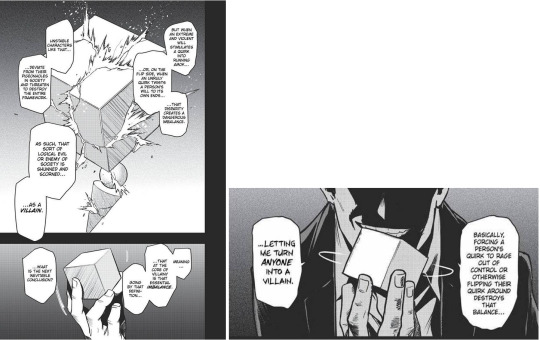
Villains are people who committed a couple of quirk-based crimes and couldn’t control their quirk. People who disrupt the balance in hero society are labeled as villains, even ones who use their quirk freely for good deeds or unintentionally cause problems with not controlling their quirks are still branded as villains.
if villains are people who have done a couple of quirk-based crimes and then the heroes are the civil servants who are allowed to use quirks, as stated by Knuckleduster: "heroes are no more than cogs in a machine that is meant to uphold societal order."

People are labeled as villains because they disrupted a machine for societal order. Heroes are only meant to apprehend villains to uphold social order just like how Knuckleduster once said heroes only exist to keep the status quo in check to prevent any disruptions towards it the same way on how heroes choose to save people, not the ones that fall through. The very same system that is never made to catch people who fall through the cracks.

Even Nagant pointed out heroes are cogs in a machine made to uphold social order and eliminate anything they deem as a threat; they sacrifice others to keep the image of peace in society running smoothly ignoring the problems growing underneath.
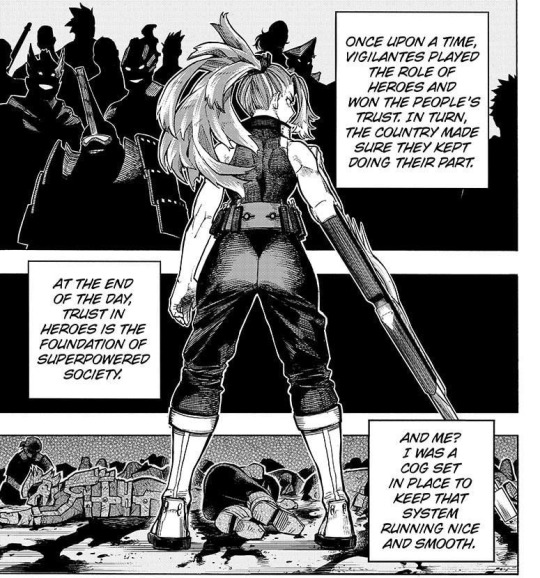
As AFO answers say that people who are villains are thoses that society outcasts with quirks who don’t fit in the societal standard, people who can’t fit into a tightly controlled society become excluded by others and become villains whose ranges are true if you look at the LOV.

The Villains are created in response to heroes’ societal problems who were driven to change the LOV are not just here because of some grand ideology but they’re here because of their hurt and hatred towards the hero society and desire to destroy it to make a change the LOV is driven to destroy what they hate most of their actions that they lash out where their pain got from society.
As I mentioned before, the main members of the LOV are prime examples of hero society own flaws,
For Tomura it's how the actions of heroes can indirectly hurt their loved ones and other people. People's over-idolization and overdependence on heroes causes them to neglect the growing problems that are present within.
For Dabi, it's how we don’t look at the issues regarding the heroes in favor of our security or want to see these issues within others because it would be like looking at the very same issues ourselves.
For Toga it’s in how people treat those who have issues. Instead of addressing these problems, we instead tell others to suppress them so we wouldn’t have to deal with them. Telling someone to suppress wouldn’t make it go away; instead it makes what’s suppressed stronger.
If you are going to choose a villain, think about how they become villains by using the LOV examples. How did your OC become a villain? What flaws do they reflect in society? I am going to elaborate on these there characters design and how it matches up with their characters.
Design:
Tomura Shigaraki:

Wow I mean wow. There is so much jammed-packed Tomura’s character design that I don’t know where to begin. Tomura is a pretty fascinating character that has an equally fascinating design that goes with it. There's so much that goes into it that I’m worried that I may not be able to mention it all in this post. Shape-wise Tomura has no prominent shapes to speak of but his design has a lot of visual components put into his design. Unlike Izuku’s character design Tomura’s character design changes a lot correlating to his character development in the series.
Tomura has a lot of symbols that are the main components of BNHA, one of which is hereditary. Hereditary is one of the main central components of BNHA since it’s about passing on one’s legacies to the next generation. This example of hereditary in his design is seen the most with his grandmother Nana Shimura the 7th holder of OFA and All Might's master.

Tomura resembles Nana Shimura with him inheriting most of her physical features. They have the same face shape, sharp eyes, sharp chin, even the mole beneath his lip. He’s even drawn to have many parallels to her in the series. Tomura’s relation to Nana Shimura deepens his connection with Izuku and All Might, his resemblance to her linked him closely to those who are connected with Nana through OFA. This makes him more compelling because it gives a connection with the protagonist Izuku Midoriya
Horikoshi designed him with Hero society's main flaws in mind with the first flaw being in how people can be indirectly hurt by the actions of a hero when they are not thought through.
This is highlighted by Nana’s abandonment of her son Kotaro, Nana gave him up to the foster care system to protect him from AFO’s evil clutches. Looking at this from a different angle you may think she is doing this to protect Kotaro but it could be considered selfish since she wasn’t taking Kotaro’s feelings into the equation, only her own. She never thought about what Kotaro would want; she never thought about how Kotaro felt when she did this to him. she did what she thought was best for him but not thought Kotaro would feel when she did this. It seems like she was asking something from him and not thinking how he felt.
Her choice can be considered selfish. She could have given up being a hero or not carry OFA but choosing not to Nana’s choice to have Kotaro despite the responsibility she had when given OFA only to ask something from him in return while she abandoned him is incredibly selfish on her part. Her letter sounding this is more about her than her son.
Her saying “I love you” while abandoning him than killed later was only adding more salt to his wounds
again on her not thinking about Kotaros feelings at all, only her own. She never thought any of this through when she was given OFA and the abandonment of Kotaro. Her abandonment showed that she chooses her duty of being a hero over her son’s feelings. though she only was doing this out of good attention to protect her son, good attention does not lead to good results. Nana’s abandonment and death left Kotaro deeply hurt from her actions. His pain from the abandonment makes him lash out at others and abuse tenko who showed anything interested in hero-related things. You can see how one person’s actions affected the people around that one person. Kotaro’s abuse of his son caused him to kill the rest of his family and him leading down the path of becoming a Villain the pushed further into AFO clutches. It was Nana's choice that caused all the series events to happen in the first place. Nana’s actions remind me of something like just how a hero’s actions can inspire others by doing good. They can also harm as well especially if the character harbors the same responsibility to the people around them.
There are characters from BNHA whose characters’ environments entered around their quirks. Tomura’s design is centered around his quirk decay. It is based heavily on a corpse since corpses decay after the person dies. His white hair reflects loss of pigment in the hair a corpse has when the body decays. His hair is unkempt and messy resembles in how he wasn’t taken care of and neglected to rot like a corpse as seen in his skin and his entire body is emaciated and his skin looks like it's physically rotting away his attitude in the way he was first introduced in the USJ arc looks listless like a corpse. His second appearance in the series with him donning a trench coat resembles a robe from a grim reaper again with both the corpses and grim reaper notes to how he carries the aspect of death with him emitting fear when first introduced.
Death is another factor in his design, this is seen in how he brings death and destruction to those around him seen in how he killed his family when his quirk first manifested and himself when AFO gave him a new name to say goodbye to his old self the heroes broke his pod and how he emits fear to people by just a look. People avoid talking about death, when you hear the word death most people are afraid of it and avoid mentioning it directly. In different cultures such as Japan death isn’t something that is scary but it’s dirty, the lack of care in his appearance references the dirtiness of how Japan views death. Seen in the flashback of his childhood when he was wandering the streets people noticed but looked away not looking at his appearance directly. The way people ignore Tomura in the series is just like people’s attitude towards death, something they want to avoid mentioning as a reference to death itself. Tomura's death motif is a reference to the concept that Horikoshi is trying to convey in his art.
Another way the dirtiness and emaciated-ness in Tomura’s unkempt appearance in his design note the second flaw of hero society. This second flaw is seen best in how the people around treat Tenko, who wandered the streets after he killed his family onlookers saw him but ignored him due to his scary-looking appearance by using "hero is going to help you" as an excuse to escape any responsibility.
People ignoring tenko symbolizes how they don't want to look at the ugliest side of society and go in and out of their way to avoid it with their willingness to look away from the corruption to protect the cozy lives they have. This small cruelty showed us that they don’t want to look at the ugliest side of hero society and see how corrupt the system is. People looking at Tenko would be a lot like admitting they are something wrong with the system they profit from. The real cruel reason why people didn’t help Tenko is that they cared so much about their security they don’t want to risk their cozy life for someone they just met so they use the excuse hero to escape responsibility so they don’t need to worry about it if someone else is doing it for them why would they need to? People's overreliance on heroes making them out to become overly complacent. People’s negligence and compliantly caused the rot to slowly accumulate and spill out from the injustices that others ignore.
Now for the second flaw, it’s that people's over reliance on heroes causes them to be complacent in helping others to escape responsibility for someone else to do letting their negligence create more villains.
It’s all about those hands, hands, hands it’s all about those hands that are prominent in Tomura’s character design.
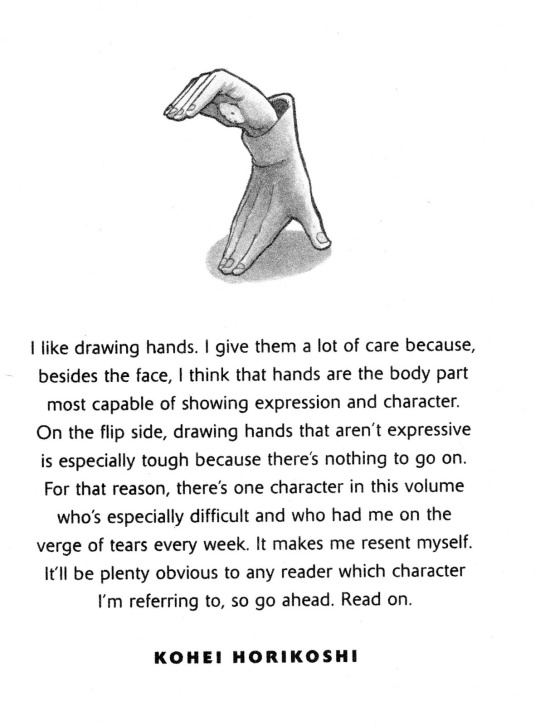
According to Horikoshi, he likes drawing hands because they are the body parts most capable of showing emotion and character. This makes sense since hands are rich in symbolism in BNHA,
This is seen in how people use their quirks with their hands, as well as having agency and the ability to get things done with them. The way people use their hands symbolizes how the characters interact with the world around them. Hands are a universal symbol of reaching out to lend a helping hand to other people. Hands are symbols for heroes; hands are used in BNHA as a symbol to reach out to save people.
There are also the general meanings of hands that have been used in relationships, with sites of intimacy and connection to other people with the hands are used to touch and express affection to someone. Hands are capable of destruction and creation they can either reach out to soothe someone or strike them with violence.
The symbolism that is associated with hands are central to Tomura as a character which is in how he activates his quirk, Decay, if all five fingers touch something it disintegrates into dust.
The way Tomura’s expressionless hands are drawn reflects the emptiness and hollowness he feels constantly.
The hands that grip all over his body in his character design if you look closely it doesn’t look at all comforting. The exact opposite the hands look exactly as if they are Strangling and choking him, putting him in a suffocating death grip. The hands that grip him look like they’re controlling him like a puppet with the hands possessing him to control the person underneath this symbolizes how he is bound by the hands of AFO who is groomed to be his successor chaining Tomura down.
The image of Tomura being gripped by hands in different angles symbolize a lot of things that are,
Abuse, manipulation, exploration, control, restriction, destruction, comfort, connection

This symbolism that here is present with Tomura’s character with the “Abuse" he experienced under his father and AFO, him being exploited by AFO as a child who picked him up in the streets after he killed his family and is ignored by the civilians, control can mean he how he was only saved to be controlled by AFO, AFO’s manipulation of Tomura, Violence can mean in how he was abused by his father who hit him if he ever disobeyed the rules and how Tomura is threatened by violence from the people he comes in contact with, the destruction portion notes on how Tomura choose to utilize them because of his quirk in that wants to destroy everything since he thinks destruction is the only thing that he can do, he subconsciously holds his quirk back to the trauma of how he killed the rest of his family when his quirk first manifested, the Comfort portion is how the hands both give him comfort and disgust, his connections he has with the members of the LOV in which he accepts them in open arms. The hands also symbolize how his entire identity was molded by AFO.
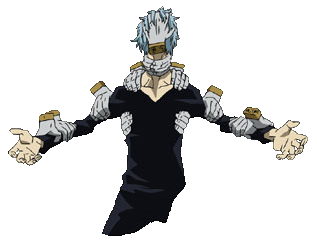
Hands have a lot to do with his character arc with him in need of a helping hand since in his arc, He requires a helping hand but no one gave him helping hand Tomura was never given a genuine helping hand by others even when he was abused by his father no one in his family helped him or society ignored him when he needed help and only was saved by AFO only to manipulate him. The only hands he dealt with were people who were violent or wanted to use him.

The way Tomura uses his hands looks like he's reaching out for help. His desire to connect to seek people out for help was also what caused him to disintegrate his own family. and the only hand that reached out to him only was there to control him. The pose with Tomura reaching out symbolizes him reaching out for help.

The hands-on Tomura’s body is revealed to be his family’s hands AFO gave him his family’s hands to constantly remind him of his trauma and act as an AFO control over him. His family hands don’t give him comfort or connection to them and are there to remind him of his guilt and trauma.

As I stated before The hands around his body that both comfort him and restrict him this aspect symbolizes his complicated feelings towards the rest of his family even though Tomura loved them he hated the way they treated him. His father forced Tenko to give up his dreams of being a hero so he can keep his ideal family in line the other beat around the bush on the abuse caring about the peace of the household over Tenko’s feelings and they don’t matter and that their not important they only cared about the peace of the household over Tenko own wants and needs. He hated him for standing by and allowing the abuse to happen and completely rejected his wants and needs. He only wanted to be accepted for who he is but didn’t get it. He feels that the house only rejected him quietly. Though he felt guilty for killing his family he is glad to end the pain of the abuse.
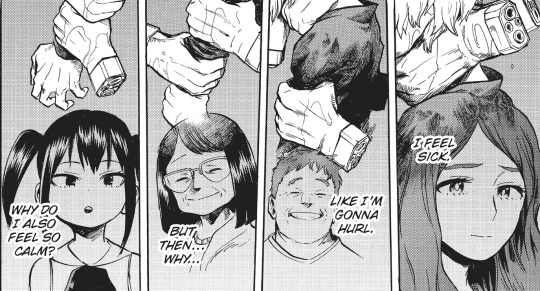
His family’s hands make him it seem like their holding him back with his memories locking away he subconsciously keeping his quirk in check due to guilt he’s imprisoned by the death of his family in which he caused when his quirk when first manifested. The hands symbolize his past in which he is bound by from the trauma of him killing his family.

The last remaining hand that grips on Tomura’s face represents AFO’s incredible control over Tomura.

Here is another important reason: The reason why Tomura’s face is always covered with his father’s hand was to fully utilize the fear, the popular reason why most people are afraid of something means in how we don’t understand anything about it. This can mean how none of the characters can understand or relate to Tomura. Most of they see him could relate to him or understand him
The fear that Tomura is presented with is unrelatable and inhuman. Rather than being a human, he is a symbol of terror that creeps with malice and causes others to tremble in his presence. As something to be feared he wasn’t supposed to look human to others, this goes hand in hand with the dehumanization he has and how he wasn’t treated as a person by others.
The mask on Tomura’s character is a very important representation of how his identity is molded by AFO to be a villain. Tomura taking his mask off shows what he feels to Himiko and twice with him he becomes more of his person Tomura is bad at communicating his thoughts with others even if left vague this may be due to Tomura’s distorted memories he has.
The clothes Tomura wears correlates his development as a villain with his original outfit: a black shirt and slacks. His lanky posture indicate his immaturity. The long trench coat he wears while on the run and AFO arrested notes his competency as leader of the LOV.
The clothes Tomura wears correlates his development as a villain with his original outfit: a black shirt and slacks. His lanky posture indicate his immaturity. The long trench coat he wears while on the run and AFO arrested notes his competency as leader of the LOV.
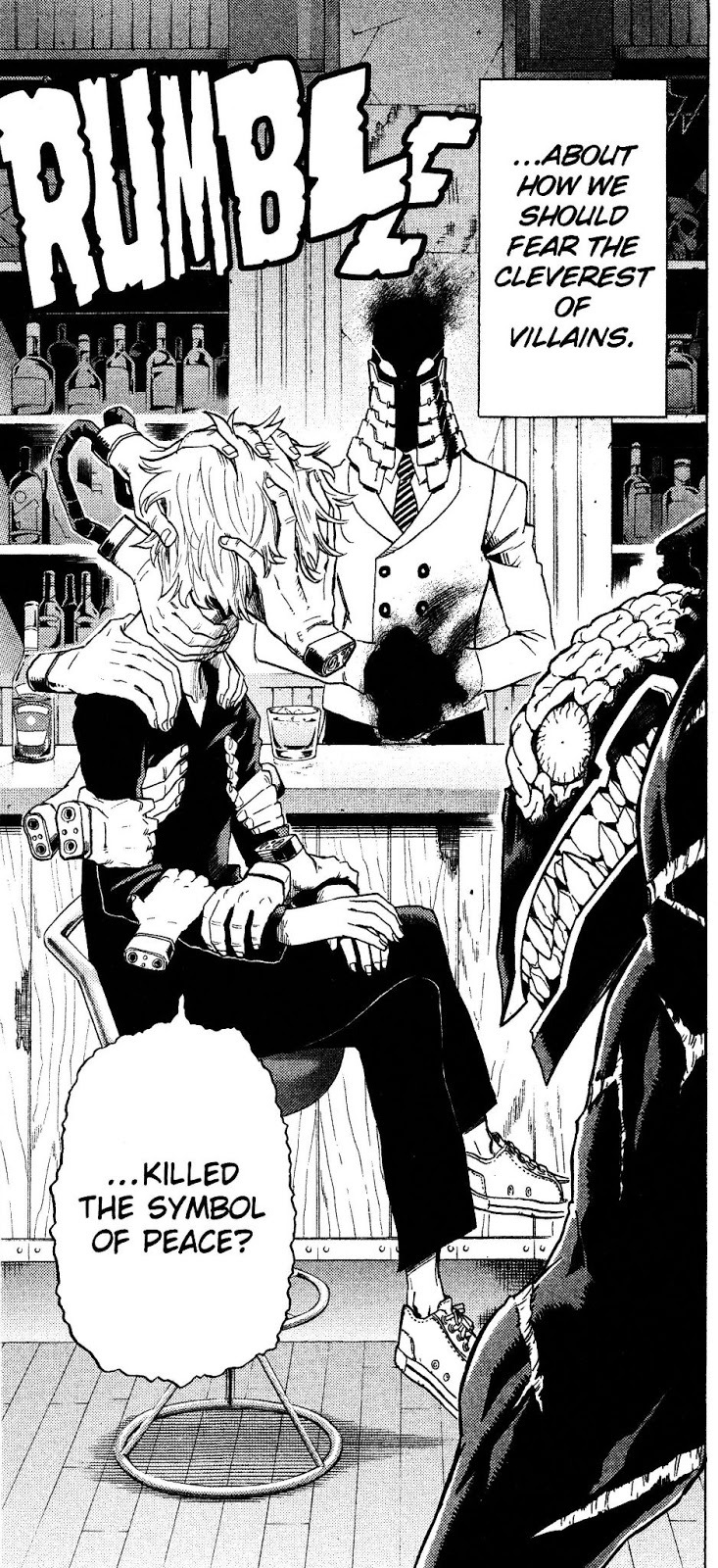
Another interesting detail that correlates to his character development is been his competency as a villain is Tomura’s "NEETNESS" he was called a neet before by Ujiko,
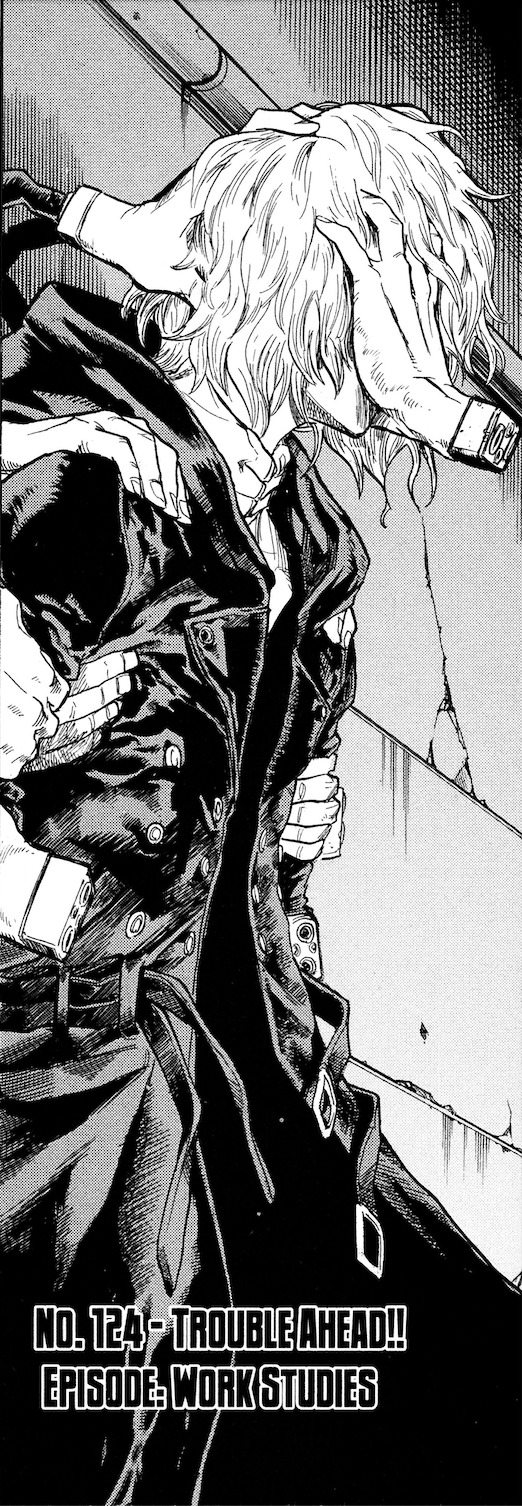
His second outfit when he and the members run from the police and heroes AFO arrested is like a neet striking out on his own becoming more independent looking for employment.
Tomura final outfit a business suit when he defeated the MLA and created the paranormal liberation and that he’s now a powerful supervillain with everything at his disposal symbolizes how the neet finally got a job.
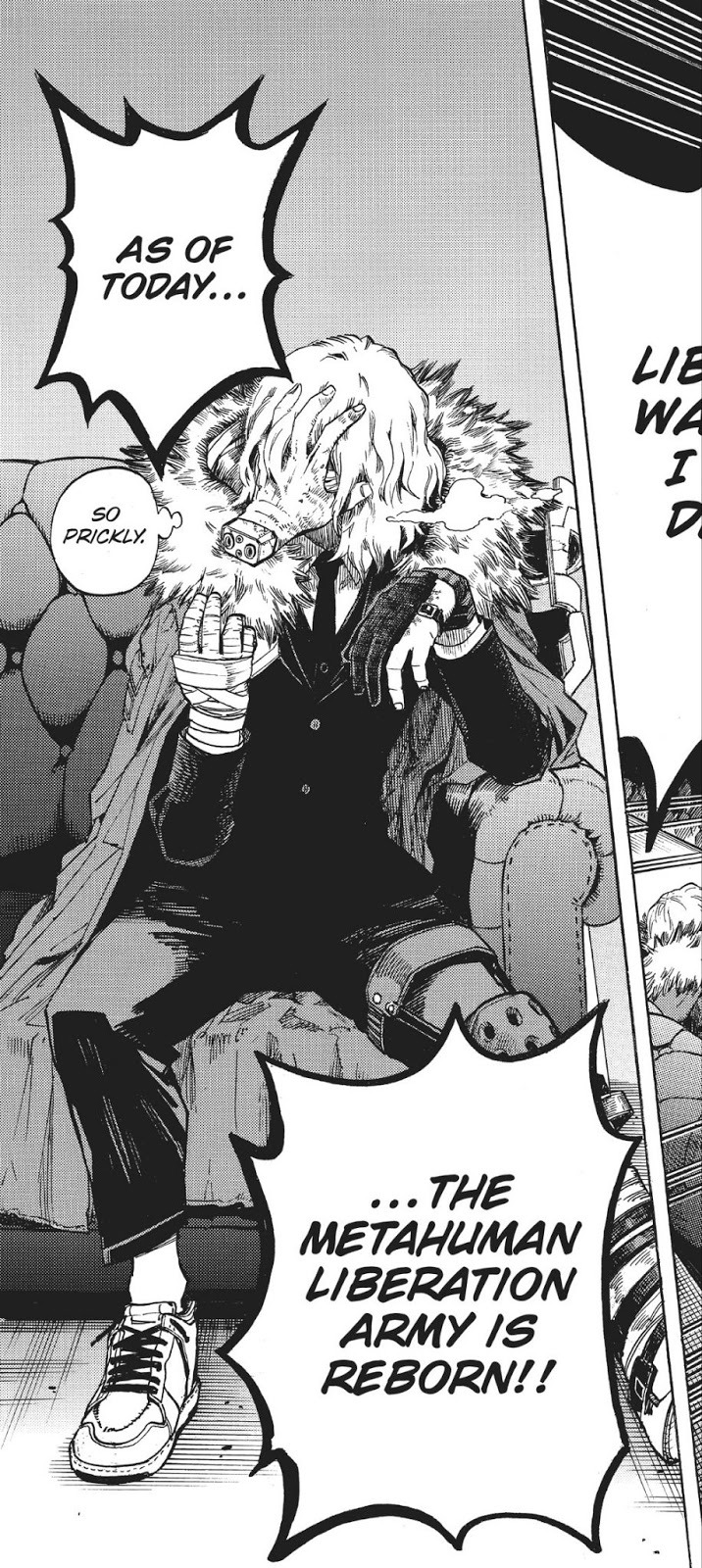
The last thing that I want to discuss in his design-wise and writing-wise is how Tomura is the foil to Izuku Midoriya. Both Izuku and Tomura are villains and hero foils in which their development correlates to each other.
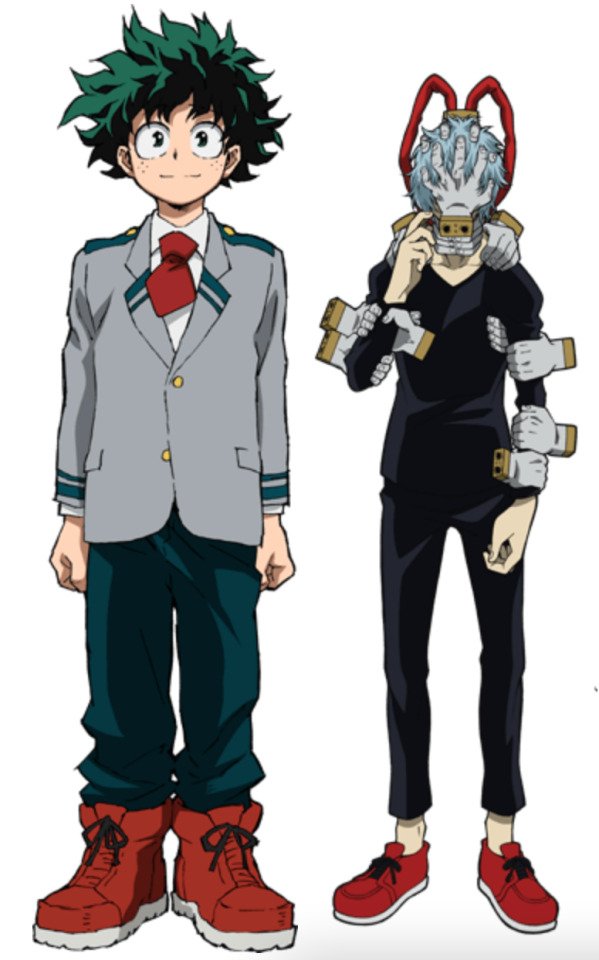
With their design harboring the same red shoes to further collating them to be foils and their posture with Izuku having a straight positive posture that reflects his personality and Tomura being slouchy and lethargic citing his listlessness that is present in his personality. Another interesting thing to note is in their bios they are both seen standing straight. one with an anxious expression in the beginning before he acquired OFA and the other with confidence in being a villain, one another aspect to reference to them being foils.
Writing-wise they are very similar to each other, both are taken in as successors for Izuku to All Might the greatest hero of all time, and Tomura to AFO the greatest villain. Before meeting them, they both face opposition that prevents them from going to their dreams with Izuku being quirkless and Tomura being abused by his hero-hating father. They are both inexperienced in many ways when they were first introduced Izuku recently acquiring the quirk OFA and lack of control and Tomura lacking the means to be an effective terrifying villain as Izuku is growing in the mastery of OFA Tomura is growing ineffectiveness to be a villain.
Tomura’s bonds with the members of the LOV mirror Izuku who started with no friends due to his quirklessness until he’s enrolled in UA and gained friends Ochaco and Iida similar to how Tomura bonded with the LOV after AFO arrest. Even the hand injuries parallel to each other with Tomura’s hand injuries from his fight with ReDestro mirror Izuku’s hand scars that he received from his fight with Todoroki.
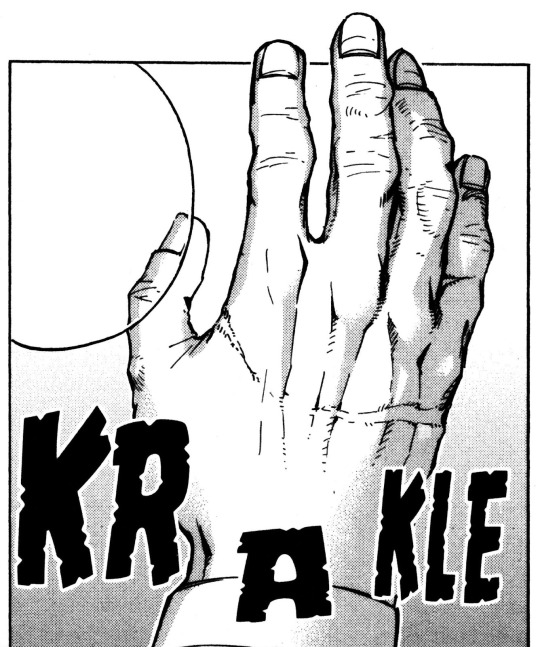
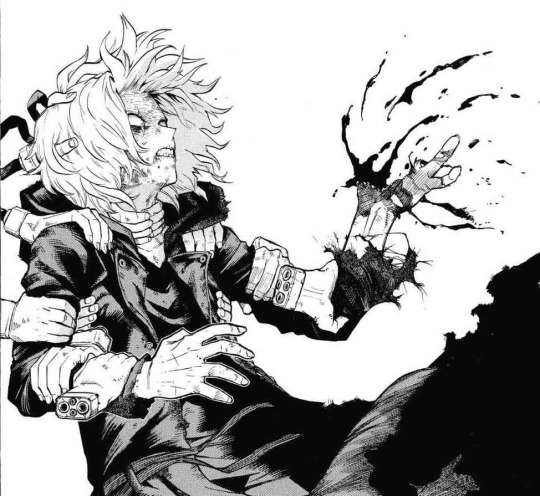
Himiko Toga:

Time for my 2nd favorite character design for the BNHA series and my second favorite villain, Himiko Toga. Himiko's design is easy because you can tell what sort of person she is in one look.

Her character design says what sort of person she is. Firstly, she’s a high school student: you can instantly see that she is a high school student because of the uniform she wears. In Japan, schools require students to wear school uniforms and Himiko is 17 years old. The blushes on her cheeks make her look like a lovesick girl also showing her insanity when first introduced to us. You can tell from her background in one look that Himiko is designed to look like a girl in love all the while telling that she’s ready to stab you. Her design is enough to know that she’s someone you need to look for and be a villain. Horikoshi is a genius when it comes to styled character design, Himiko has many design elements that go very well into her character.
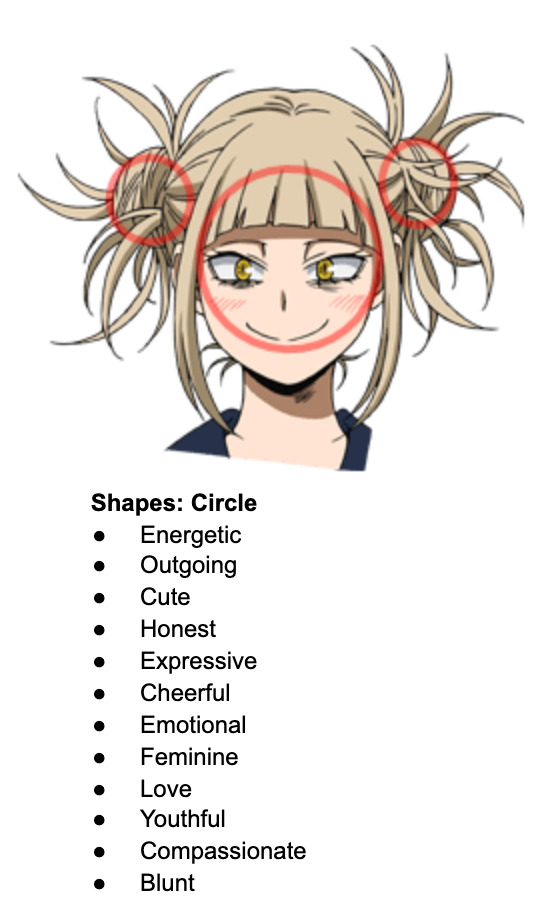
Himiko has two prominent shapes in her design: a circle and a triangle. The circles are visibly seen in her face and hair buns; it tells her personality and entire character. For symbolism that goes with circles, it’s that they are feminine, cute, honest, expressive, love, youthful, likable, charismatic, emotional, cheerful, compassionate.
The youth aspect is, as said above, from how Himiko is the youngest member of the LOV being 17 years old.
The feminine can point to how she’s the only girl in the group. Himiko is the most cheerful and liveliest in the LOV and her honesty is Himiko’s best qualities. Himiko is honest about herself; she's one of the members of the LOV to speak her mind even if she honestly comes off as morbid. Characters designed with circles are expressive and emotional. Himiko wears her emotions on her sleeves and does whatever makes her feel good. An example of her being emotional is how she goes out on her own to do what she likes and how she reacted to Twice’s death and cried when talking to Ochaco. Himiko is an emotional person that acts on her emotions. Himiko is one of the most expressive members of the LOV as the symbolism for the circles implies she shows an abundance of emotions in her gestures and mannerisms her joining the LOV Villians was primarily to be herself to express herself in a way she wasn’t allowed to s a kid: you can see how she freely uses her quirk when at the LOV being the ultimate act of self-expression. The best example of this symbolism of expressiveness is seen in her hair buns, her hair bun is shaped like two circles and also carries along with the symbolism of self-expression.

In her childhood when she first discovered her quirk you can see that she wore her signature hair buns that were when she was expressing affection with the bloodied bird reinforcing the expressive symbolism.

The way she put her hair down resembled how she was forced to repress a side of herself by others being forced to hide her bloodlust all these years by other people. Her hair down symbolizes how she repressed a part of herself. In the present she is happy expressing herself with her quirk when she was with the LOV she wants to express herself when she wasn’t allowed to do for her using her quirk freely is a form of self-expression Himiko is considered cute by Giren and she loves cute things. This is seen in how her villian uniform was deeply upsetting to her as she says it’s not cute. Himiko is all about love: she falls in love with Izuku, and Ochaco and Stain to the point of wanting to be them the people she loves Himiko loves to fall in love with others as her shape implies she has no problem with showing affection even if it's considered dangerous to the people to she attracted to. Himiko is compassionate. This compassionate side is prominent when she is consoled Twice for his guilt for letting Overhaul into the hideout and killing big sis Magne and taking Mr Compress’s arm. Himiko has a likable design and is considered popular with the audience ranking 3rd in an American popularity poll.
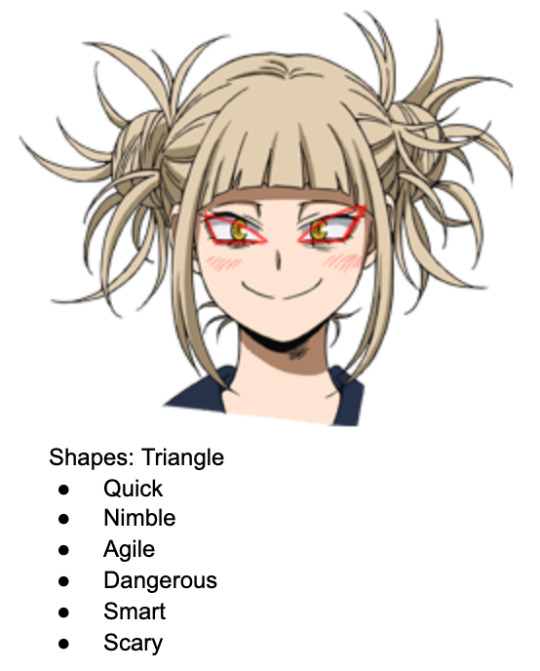
Now for Himiko’s second shape: it’s a triangle. The symbolism for triangles is that there is a quick, nimble, agile, conniving, scary, dangerous shape reserved for villains.
You can see this in her eyes, which have a distinct triangle to them. Himiko is a villain like her shape suggests withdrawn with his shape. The symbolism notes her intelligence to how she picks someone she needs to imitate to go undercover and reflects in the way she fights being very quirk. Himiko is considered dangerous by the people she is attracted to and she was wanted at large by others before she joined the group.
Another detail is her sharp teeth, this can refer to Himiko being blunt by nature and how she always speaks her mind. She is forthright when she points out others' feelings, making her emotional perceptive a skill she picked up when she was on the run from police and heroes. This is seen in how she provoked Mimic in the Yakuza arc and comforted Twice.

Horikoshi sure loves cats, he loves incorporating cats in his characters as with Aizawa and his favorite thing being cats and the Wild Wild Pussy Cats with a cat theme. Cats go with Himiko in her design and character, too.

Himiko has cat-like features in her character design with slit iris in her eyes and the blushing under her eyes resemble whiskers on a cat along with her canines in her teeth coming from fangs stuff that is seen in a cat a lot of these traits related to cats and are very prevalent in her design. Another example of her cat motif is how Himiko styles her hair into two messy buns, if you look at the silhouette of her buns resembles the ears of a cat with the hair strands coming out of her buns that look like ear tuffs from a cat. I find another interesting fact as to why she has two buns in her design the reason why she has two messy buns is that in Japanese the word for two is ni, ni sounds like nya a sound a cat makes her putting her hair up in two buns reference to her cat motif in her hair. Her speed and agility in her abilities reference cats that includes how she stalks her victims and attacks them. It resembles how she hunts like a cat, by moving without a sound stalking her prey and waiting for her prey to let her guard down then take them out when the moment is right.

Her villain costume has many influences from DC and Marvel villains with the blood-sucking machines, for example resembling Bane’s from Batman, but it has feline teeth reinforcing her catlike appearance.

Himiko was inspired by two cat yokai in Japanese mythology: the Bakeneko and Nekomata. Cat demons that have shapeshifting powers that turn human and cause chaos, which references Himiko’s quirk and personality. Bakeneko is known to have a taste for human flesh and can transform into humans by licking their blood ingesting blood and becoming a human in disguise fits Toga’s quirk Transform which she uses blood to transform into other people. The Nekomata is a cat that can transform but is seen with a fork-shaped tail, the fork-shaped tail being the cat being able to shapeshift into two different things: a cat and a human. The Nekomata plays more into Himiko’s quirk with her two buns referencing the Nekomata with the forktail. In mythology cats are known as tricksters or creatures of deception this references her quirk transform and what might be what Himiko’s was heavily inspired from seen in Himiko’s quirk transform and her cat-like appearance.


Himiko’s bun might not only look like cat ears but are meant to represent a red spider lily. In her concept drafts, Himiko had a spider lily hairstyle. The red spider lily is a flower associated with death and is put on gravesites because it is believed it can guide souls into the afterlife. The flower symbolizes death and transformation that could strongly reference her quirk transform. Another aspect of the flower comes from two lovers who feel each other at first sight but are cursed to never be together. This is why it's considered a flower of separation hence the separation between the two lovers. This notes her relationship with Izuku how she fell in love at first sight when he was bloodied and beaten but could never be together due to being from two different sides. The separation aspect in the flower goes with how Himiko feels separated by others and can never be close to them due to her interest in blood.
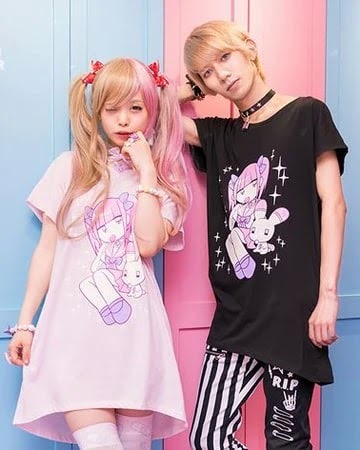
A minor detail in Himiko’s design is that it’s heavily influenced by Yami kawaii, a subculture in japan that glorifies sickness and mental health being taboo subjects in japan the point of the movement is not to glorify death be to express themselves in the way they haven’t prior. This subculture goes with her character and is seen best in her home cut in her character design the same hair that you see Yami kawaii use. as someone pointed out her straight Hime cut bangs and bags under the eyes reference the bags comes from the makeup effects from a Kawai trend which emulates the sickly style. Himiko’s fascination with blood is deemed a mental illness because people don’t view blood as toga does even call it wrong or weird. Himiko’s desire to express herself by expressing a taboo feeling or emotion the idea of wanting to express a taboo feeling instead of repressing it comes from the Yami kawaii movement. The use of syringes and box cutter jewelry reference Himiko’s choice of weapons her villain costume has deployable syringes that gather blood and she has a knife as a weapon of choice with the box cutters reference her butterfly knife she uses often in her fights. her syringes that gather blood resembling the strings from the Yami kawaii movement.
Toga is a strong allusion to a vampire. Even her backstory starts in a chapter “interview with a vampire” denoted to her.

Her sharp teeth play into vampire fangs along with her quirks of bloodsucking nature. The Vampire allusion notes her quirk's blood-sucking nature and her ambiguous bisexuality; vamp in a vampire is slang for bisexuality this notes her ambiguous bisexuality as she displays interest in both Izuku and Ochaco.

Vampires are written as biting commentary towards the upper class in how it guzzles down the lower class. This can refer to how Himiko’s character makes a biting commentary on society in which I will discuss later in this down below.
Another aspect is how she expresses affection openly in the way she chooses to express reference to how affection is treated in Japan. showing affection in public is considered indecent. This can infer how she was called indecent by her parents when she carried the dead bird while smiling since it's her showing affection.
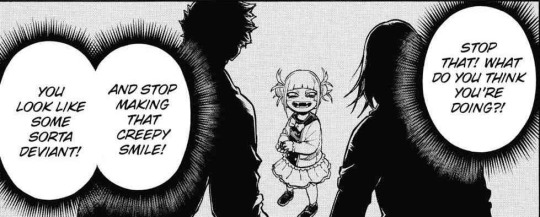
To Himiko when she sucks someone's blood it's akin to kissing someone with her making the chu noise the sound of kisses in japan,

kissing in public is considered indecent. It could be said that the people in BNHA view Himiko the same way as Japan views affection.
Next, Himiko is the Villainous foil to Ochaco, with them being the only girls in their group. Both are blunt, cheerful, and outgoing and are extremely expressive, as seen in their exaggerated mannerisms. They are also perceptive of others’ feelings, traits that they learned from others around them with Ochaco watching her parents and Himiko becoming sensitive of others around her when she was on the run from heroes and police.

They are different in how they deal with their personal feelings. Where Ochaco chooses to suppress her feelings, Himiko chooses to be open and act on her feelings.
They are both in love with Izuku,but the way they approach their feelings is different. With Himiko becoming excited at the thought of seeing him and becoming open in her affection for him, Ochaco chooses to keep her feelings down thinking that her feelings for Izuku would hinder her from becoming a hero. Ochaco's admiration towards izuku mirrors Himiko’s desire to be close to the people she loves it was Toga who made her realize her feelings towards izuku later on.
Even they have similar goals to each other in which that they want to make things easier, for Ochaco was making the money from being a hero so they can have easy life out of poverty
For Himiko, it wants to make the world an easy place for her to live in so that she wouldn’t be forced to repress herself again due to her blood-related quirk by others and live freely without having to repress herself again.
Another detail in the way they contrast each other in being foils in their designs with them having permanent blush stickers on their cheeks and how she balls up her hands much like Ochaco. This may be considered an unintentional part by Horikoshi.

In her design draft Himiko was considered to symbolize distortion by Horikoshi but in what way does she resemble distortion in her personality? The distortion aspect might have meant hero society.
This makes sense since she represents the hero society's main flaw being in how it distorts other’s views.
How Himiko’s perception of herself had been shifted and distorted by her environment this is largely due to how hero society looks at others with distorted lenses regarding quirks and judge what is normal and condemn something wrong and weird. Himiko was designed and written as a biting commentary of her society in the way it views quirks in general.
Dabi:
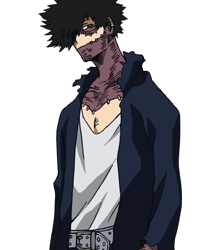
I am super stoked to talk about my favorite character of the series, Dabi a.k.a Touya Todoroki, it's not surprising since I have a blog dedicated to finding out his character. His character design is my favorite in the entire series. There's just so much to go over in his design there are so many things jampacked in his design, many elements that are prevalent in his character. Unlike with Himiko's by which you can tell what sort of person she is in one look, Dabi’s design carries a lot of questions such as where did you get those burn scars? He just has this mysterious vibe when he was first introduced. I loved Himiko’s character design for being easy to tell and I love Dabi design for having an enigmatic presence.
When it comes to shapes his design Dabi has one prominent shape that is visible in his design which is a triangle, His entire body is a reverse triangle. You can see the shape of a triangle in his hair and face having the same shape. Something is interesting about his eyes; it's that the shape within the eye resembles a reverse triangle. His eyes have a little bit of an upside triangle to them, again referring to his main shape.
Triangles in character designs are reserved for villains with them being lanky with the triangle in their design since they commiserate being edgy and evil. Triangles when seen on designs on characters are dangerous, devious, stubborn they show danger to warn others to watch out.
I find the symbolism fits very well into Dabi’s personality and communicates these aspects of his character well.

If there's one thing we underestimate is just how smart Dabi can be, he's very calculating, always planning his next move and acting when the moment is right. You get to see this side in action when he was put in charge of the vanguard action squid during the camp raid where he completed the mission despite having three casualties and put a dent in U.A’s reputation.
Dabi is good at reading other people; this is where his intelligence truly shines. He knows which buttons to push; this comes in handy to recharge his quirk:
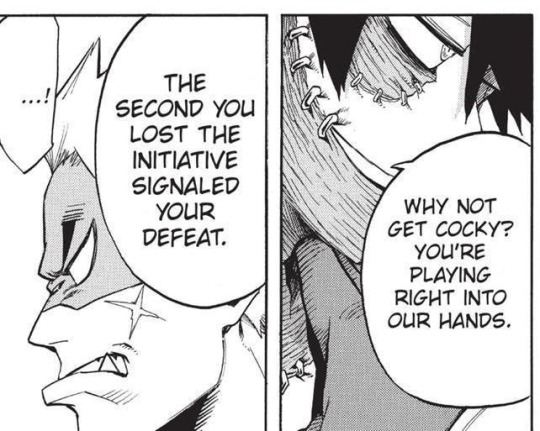

You see this with Vlad and Eraserhead and know what to do to rile them up, predicting how they will react. Another example is in on how he didn’t trust hawks during their cooperation because he suspects that hawks are a spy sent to infiltrate the LOV. He always watches others in the background while he's planning his next move that comes in handy to know what he's going to do next.
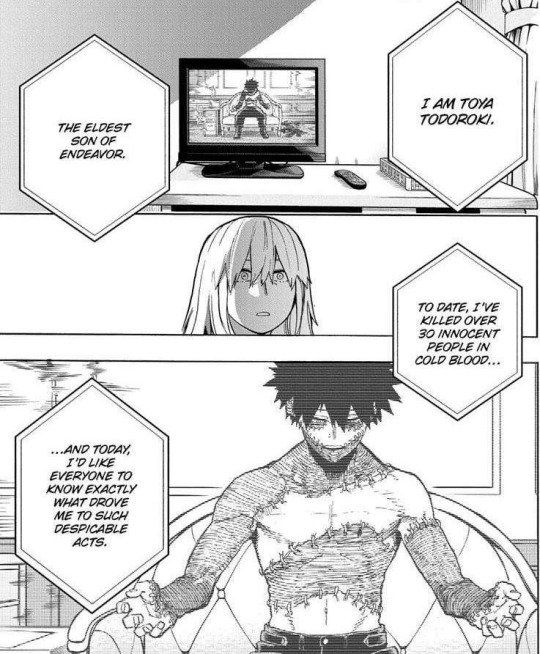
Another example is how he reveals his identity as Endeavor’s long-dead son Touya Todoroki and exposes Endeavor's past on broadcast effectively ruining Endeavor’s reputation destroying peoples faith in heroes. This goes so well with the deviousness Dabi’s triangle represents. The stubbornness symbolism in triangles can infer to his tenacity in his character you can see this in how he set out his plans whether he was Touya in trying to surpass all might make his father proud and Dabi in exposing the abuse on television one of the main things about Touyas the tenacity to carry out plans in his character. For Danger, despite his appearance being shrouded in many mysteries, we know from a look that he's someone to look out for he gives off a sense of ominousness just from one look at appearance and we know that he's someone to look out for and the danger part refers to how his identity as Touya Todoroki which he can use the truth to his advantage. His presence would spell danger to not only heroes but all of society in general because of how he knows the truth of Endeavor’s abuse and the dirty side of heroes; the danger in how he has the potential to put a dent in peoples trust in heroes he lacks the sharp edges when it comes to triangles downplaying his dangerous aura. Another thing to note: triangles are attention-grabbing in warning signs and characters they scream look at me to use. This strongly corresponds to Dabi’s need for acknowledgment in his catchphrase look at me.
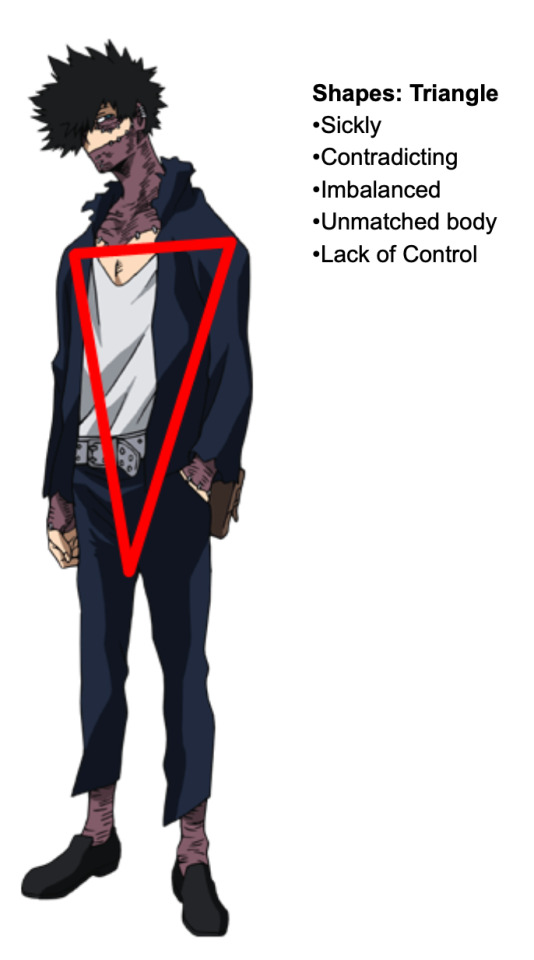
Dabi’s slim lanky build resembles how villains are drawn as being somewhat lanky in design but also it can be a direct call back to what I said before I said that his body is an upside-down triangle. Triangles symbolize imbalances that ties directly to Dabi in a nutshell. The imbalances aspect notes Dabi’s lack of control of his life due to his abuse and neglect from Endeavor.
The triangle notes his ill health in his body which can mean his constitution in which he has a powerful flame quirk but a body made for ice his quirk burns his skin because of the incompatibility. His quirk runs on his emotions burning him if he becomes too emotional which results in him almost dying like he did at Sekoto Hill. His quirk is dangerous to his unmatched body leaving him with burn scars all over his body.
Dabi was never in control of his life at all due to his situation. The triangles note Dabi’s constant contradictions in his character in which he acts cool and collected on the surface but deep down he's an emotional beneath. Dabi may claim he doesn’t care about the LOV only using it for his objectives but he is seen risking his life for them many times despite what he says. He follows Stain’s will but it serves only as a basis to him; in reality he is only doing this to get revenge on Endeavor for the abuse he put him through.
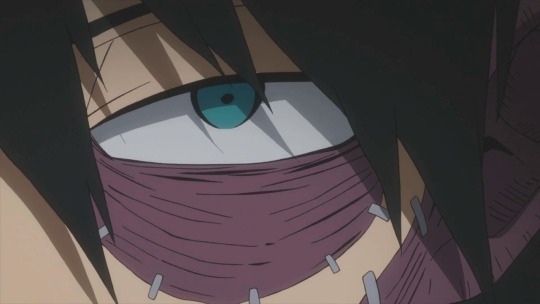
One thing about his eyes is that they are the most prominent features of Dabi. Dabi’s eyes say a lot about his personality: they’re almond-shaped with a downward slant to them and have a double folded eyelid; the eyelid makes him look indifferent, lethargic, aloof and detached to his surroundings giving him a sense that he's cool and indifferent. The eyes give off a sense of emptiness to others when you first see him. Dabi has a double fold in his eyelid it makes him come off as cool and aloof to others a call back to his surface exterior.

For his face, Dabi’s chin is long and narrow to indicate that he's an adult.

Like most characters in BNHA, his hair is designed based on his quirk. His flame quirk makes his hair shaped like a flame. Dabi’s hair resembles Bakugo’s but with one big difference, it's designed based on flames with the strands resembling the sparks of fire.
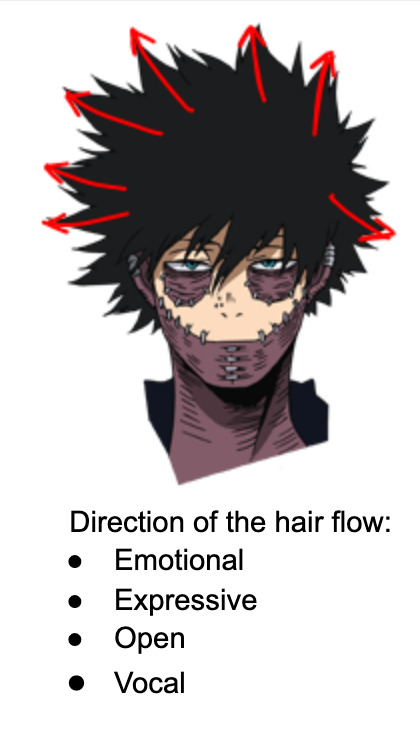
There is something to point out about the way his hair flows. Dabi's hair goes outward in different directions. Dabi may look cold and stoic on the surface but deep down he's emotional and is driven by his feelings. dabi is emotional and expressive with his hair going outward. He's chatty and vocal on his opinions to the point of being ill-mannered; this is seen in the way the direction of their hair flows.
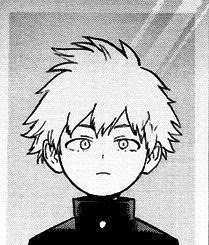
Another good design example is seen in his childhood as Touya. Touya’s soft round face indicates that he's 13 years old since characters having around sort of face point to the age of juvenile characters that are not yet adults. His hair is unruly; this can note his bright energetic personality when first introduced when training endeavor His soft hair notes his innocence that was destroyed by endeavors abuse neglect. If Dabi’s hair looks like fire Touya has a candle flame shape for his hair much like the kanji in his name is spelled. This showcases his youthful innocence in his features before he becomes the villain Dabi.
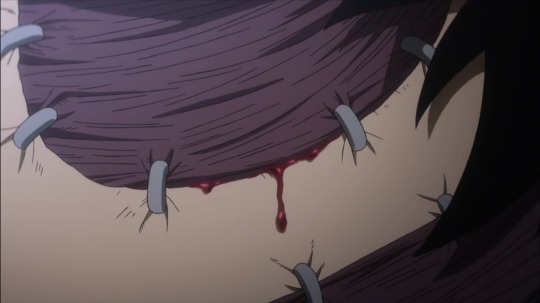
Dabi’s staples that keep his burnt skin and unscared skin together symbolizes how his practical mind keeps him level headed not completely off the edge his burns note how his ice body that is unmatched for his fire quirk with his quirk slowly killing him showcasing his self-destructive tendencies. Dabi’s stitches in his skin is metaphorical in how he's barely holding his life together. The piercings on his skin together show how he becomes numb to his pain but at the same time makes him look in pain both metaphorically and literally. The staples give off this failed experiment connotation this notes he is called a failure by Endeavor since he discovered he cannot surpass all might. In Dabi’s coat, you see the combination of medical staples and stitches on his clothes emulate stables that go with skin. The staples point out that Dabi is a contradictory character in BNHA and this part in his design proves this with his skin drafts reference his constant contradictions in his personality. Dabi’s dyed hair and multiple pieces suggest Dabi has more of a rebel attitude, with his general outfit resembling a typical delinquent appearance: piercing, loose white shirt black coat. Dyed hair is usually considered a delinquent concept having dyed hair and multiple piercings frowned upon in some parts of conservative areas in conservative areas in Japanese society. Dabi rebels and acts opposite of his father by becoming a villain who opposes heroes like his father and follows Stain’s ideology the same one that despises heroes like Endeavor. Dabi’s rebellion is supposed to go against his upbringing of being raised by her father and the values he grew up within how he was raised in a traditional Japanese household. When he takes on Stain’s ideology he rebels against the system that creates heroes like Endeavors.His delinquency is how he reacted to the abuse from Endeavor by going into delinquency and lashing out. The thing I noticed about rebellions is how they always aimed to get attention from others I find this very sad since Dabi that despite his hatred he still yearns for acknowledgment from others.
Another way his dyed hair symbolizes other than concealing his identity represents him hiding his identity and feelings from others, removing his dye is how he's letting himself feel the pain instead of repressing it.

Dabi turns his hair back to his original color that symbolizes how his identity as endeavors son is out and him leaning it white to spite him.
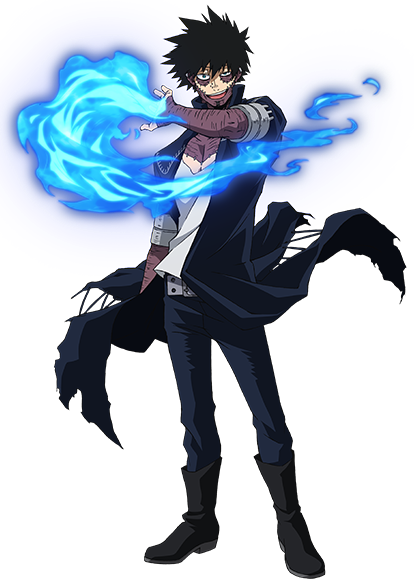
An interesting detail is seen in his villain costume after he joined the LOV other than the stitched up aesthetic carried over to his coat but they added cuffs, His cuffs are inspired by Japanese stove burners:

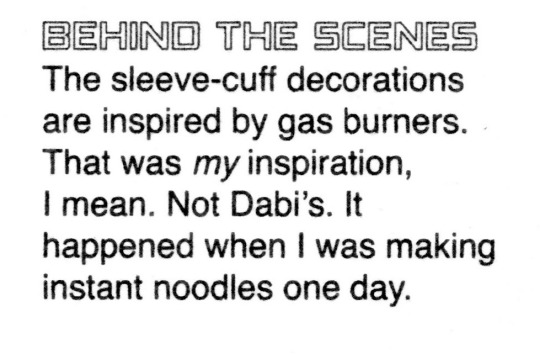
When you turn on the stove blue flames appear which is likely a reference to Dabi’s blue flames, a design reference from Horikoshi.

Dabi’s animal is a snake. People often say dabi looked like a serpent when he was first introduced. This may be a bit of a stretch but if you see the recent art it might not be. Snakes are sneaky and cunning this is symbolic of his strategy and cunning with his approach to bringing down endeavor. The snake goes with the whole hell symbolism that the Todorokis have. It brings to mind the serpent from the bible the serpent in Adam and Eve is near the fruit of knowledge tempts them to eat the fruit. The snake plays into the fact that Dabi harbors knowledge on Endeavor and the abuse. Seeing Dabi’s snake form reminds me of the Japanese phrase “Ryuutou-dabi”, the Japanese phrase of a strong start but a disappointing end in sort of an anticlimax. Dabi embodies the phrase in his snake form in how as Touya he started as Endeavor’s successor with a powerful fire quirk only to be tossed aside by him and considered a failure for having a body made for ice someone deeming him incapable of surpassing All Might, someone who started with a strong beginning but ended a disappointing start.

Dabi has the entire death theme in his design a closer look at Dabi’s face you see what's left of the skin of his face looks like an upper half of a skull with his fire quirk resembles fire from a cremation. This notes his supposed death as Touya when he was almost burned to death at Sekoto Peak when he was younger. Dabi has a death theme similar to Tomura, but different because tomura represents the dirtiness of death in his design being his design based on decay. For Dabi it would come from cremation. Even his villain alias means cremation, noting on how dabi is designed to represent how the body looks after its cremated nothing but bones and ashes. Tomura’s design is based on a corpse decaying from negligence; Dabi’s is a charred corpse that was burned to death from neglect and lack of care.

Dabi is a heavy allusion to Frankenstein's monster with his patchwork skin and background. Dabi’s birth bears similarities to how the monster was created that being created through unethical means with Touya’s birth is through a quirk marriage between his parents. The monster was created through the sewn together of different corpse parts. how both Endeavor and Dabi have humongous allusions to the novel Frankenstein with on how Victor created the monster for the pursuit of scientific knowledge to discover life similar to how Endeavor created Touya because he wanted to create a powerful child that can surpass AllMight. Both Victor and Endeavor are characterized by their ambitions with both placing their ambitions above their famil;y Victor threw himself into his studies to neglect his family and his fiance, while Endeavor neglected his family's feelings. Victor's abandonment of the monster is when it first came to life: he fled in terror being disgusted by the monster's appearance, mirroring Endeavor’s neglect of Touya when he realized that he can’t surpass All Might. Frankenstein is motivated by his ambition to achieve something great when it comes at a great cost which led him to mess around with life in creating the monster; Endeavoris characterized by his ambition and want to be stronger no matter what means he has to do with it which results in him in getting in a quirk marriage to create Touya. Both Victor and Endeavor did a crime of messing around with life with both failing to recognize how their actions have repercussions and failing to learn from them. Both failed to take responsibility for their actions when it matters with Victor failing to act when learns the death of his brother under false accusations of Justine victor can act be choose not to fail to take responsibility allowing Justine’s execution and endeavor fail to take into account how his actions deeply hurt his family. Both Victor and Endeavor blamed their faults onto others running away from their responsibilities. The monster and Dabi have similarities too with the monster been shunned by society for his appearance and isolated by society mirrors Touya’s isolation from the rest of his family and feeling unseen by them as Dabi he feels unseen by others in society knowing his father the hero and how abusive he is people won’t believe them since they never see anything wrong with hero society and heroes. Another similarity between is their experience with fire with Dabi almost burned to death with he was young and the monsters first experience with it. Both Dabi and the monster serve as reminders of how Endeavor and Victor fail to take responsibility.
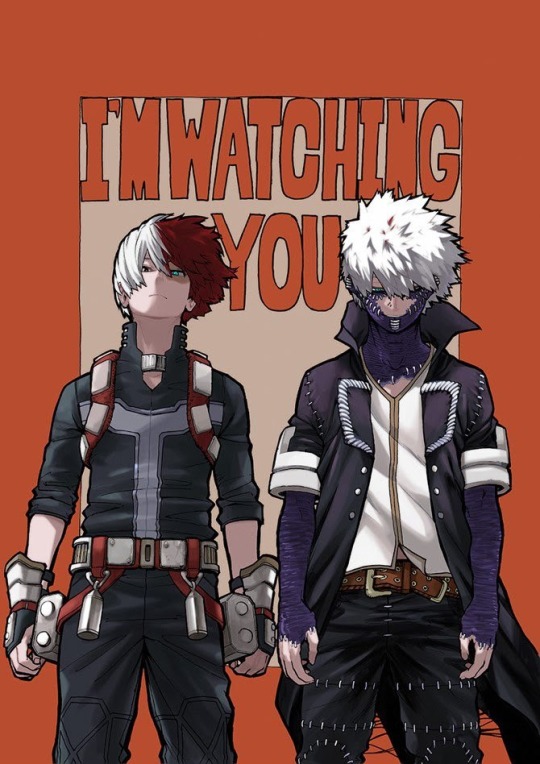
Dabi is the villainous foil of Shoto Todoroki. Like Shoto, he holds some Asian influence this best seen in his eyes in which as more of a downward slant to them they have many similarities in their designs to correlate to each other with having the same eyes, face, body type and height this isn’t the first time that BNHA uses hereditary in character design as I explained with Tomura. Dabi is similar to Shoto not just in his same features and positive in his design but also their personalities. With Dabi and Shoto both cool and collected in their respective groups and both suffered under endeavors abuse to be endeavors successor where Shoto was favored due to his quirk and Dabi was cast aside. Dabi harbors the same attitude and mindset as Shoto, in the beginning, they share they were cold to the people around them and viewed their flames as Endeavor’s are both cold and focused when it comes to their goals Shoto wants to be seen not as an extension of Endeavor, and Dabi wants acknowledgment from Endeavor and others. Dabi and Shoto are foils to each other and have known to have more similarities to them than differences in his design. Dabi was around Shoto’s age had a rounder sort of face like Shoto had indicating theirs simulates the way. Their hair flows is different Shoto hair goes inward refers to Shoto subdued and reserved and Dabis being an emotional person his hair goes outward it also symbolizes their dispositions regarding their abuses where Shoto is closed off to his abuse Dabi in the other hand shows it openly.
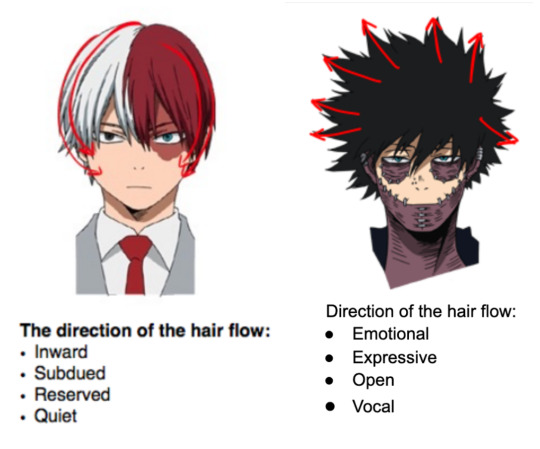
What is the flaw that Dabi represents in hero society? It's how heroes do scummy things than the villains of hero society. The people in hero society don’t question the heroes because it is a lot like how the civilians treated Tenko after they wandered the streets. They don’t see anything wrong with the heroes allowing them to get away with crimes without punishment. This is why Dabi said to stop and think he wants people to question pro heroes in the broadcast. Dabi knows there are bad heroes like Endeavor.
Epilogue
Each of the LOV is modeled after a monster in some way this can be considered intentional since it would represent how hero society can create its monster as seen with the LOV. Designed to look like monsters or maybe part of Horikoshi’s preferences since he loves pop culture references note them many times in the story. Horikoshi took inspiration from horror and slasher film genres when he designed his villains.
Horikoshi said when he designs his villains he when he creates villains he tries to bring out a sense of disgust and what sort of impression they make on the psyche of the audience like the concept behind Shigaraki was to install fear among his audience with Himiko being cute and being able to mix into society and continue living and Dabi comes as more mysterious to us readers to use readers.
The villains of BNHA are based around a flaw in hero society like with Stain and getting rid of fake heroes It tells us that there are bad heroes like endeavor and people who become heroes for money and glory rather than selfless hero work. and Nagant addresses how the hero commission uses heroes like hawks to protect their self-image then make everything and eliminate anything that is a threat to that self-image.
These two things to keep in mind when you create a villain in BNHA are in how they make an impression on someone and a flaw that hero society has.
Color:
In most media, black is the color reserved for villains since it’s a color that traditionally symbolizes evil. The LOV of villains is no exception,: black is the LOV image color. But beyond that, each one of the members of the LOV has an image color that correlates to their personalities.
Tomura Shigaraki:
Tomura Shigaraki’s image colors are both black and white. Black references him as a villain, but in actuality his main image color is white. White may seem a positive opposite to black colorwise in western cultures; however in Asian cultures white is considered bad luck, because it’s the color of death.
White is the color of death in Japanese culture. In many Asian funerals you see people wearing white; it is used as a symbol of the mourning. Funerals are a call back to his given name Tomura because it translates into mourning and the character for death is his surname.
But, white also symbolizes innocence or someone who has a blank slate; the color white is known to be dyed by any color, noting Tomura’s ability to learn and reflect and his character development.
Black is the color of evil, death, chaos, and destruction
Black is the perfect color for a character revolving around death to himself and those around him. For himself as death his old identity as Tenko Shimura the civilian with a hero lineage to Tomura Shigaraki AFO’s successor physically as seen when he was accidentally killed in the raid of the hospital caused his heart to stop. Chaos and destruction note his personality is what he wishes on hero society for rejecting him.
There’s also another aspect of him that is his hair that changed color. After he killed his family when his quirk awoke how he was left wandering the street with everyone ignoring him no one helps him because of his appearance and him being taken in by AFO name change him in those instances he was reborn as the greatest supervillain. His colors signify Tomura’s dark rebirth as Tenko civilian from a hero family to Tomura adopted son of an overlord: it's a transition from good to evil black to white Tenko’s hair being black to white is powerful.
This suits Tomura really since he is someone who is always in constant morning metaphoric, literally and figuratively and physically
Himiko Toga:
Himiko’s image color is red, as red is the color of blood. Himiko's quirk transforms in which she ingests blood to become someone else and her obsession with blood. The symbolism of Red goes with Himiko personally, red is the color of passion and emotional color that symbolizes desire, danger, instinct, impulsiveness, liveliness. Red also symbolizes love, but the deep passionate kind. Love has a lot to do with Himiko as a character. She falls in love with the person that is covered in blood. Feels it deeply so much that she wants to be the person of her affection. Desire could reference Himiko's distorted desires she has in wanting to be the people she loves via by draining them of all their blood. Red is the color of passion and emotion that goes well with Himiko; she is emotional and follows her desires and impulses when it comes to her warped desires diving headfirst not thinking about anything else. Himiko is the most morbidly cheerful and liveliest of the LOV; she is the most energetic of the group and gets excited when she sees her crush. She feels her desire deeply as she stated before in her conversation with Ochaco. The dangerous part can refer to how she's a dangerous criminal who is wanted by both police and heroes who were a subject in the blood-letting cases. Her affection is considered dangerous to those she's attracted to.
Her color scheme goes hand in hand with her cat-like features seen in her design with Himiko's pale hair and gold irises resembling colors that are seen on a cat and Her cat likes the ability to sneak and stalk her target.
Dabi:
Dabi wears darker colors. As I stated once before in my last creation meta character who wears darker colors shows a brooding, aloof and detached personality; this goes with Dabi who is seen as aloof and detached from his allies. But for image color Dabi’s main image color is blue. Blue is seen in both his eyes and his flames in contrast to the popular belief that his eyes are turquoise and blue. Blue flames are said to be the hottest flames of the spectrum. blue is not only the color of his flames but also his entire personality as a whole the color blue is very complex and contradictory which is Dabi’s character in a nutshell.
On the surface, Dabi is calm, serious, intelligent, cool, cold, like Blue. Dabi is the most serious-minded and focused when compared to the rest of LOV when it comes to missions. Blue is the color of order and rules, Dabi has his own sets of principles and ideals in contrast to LOV that he follows. He follows Stain’s ideology but albeit very differently since it goes hand in hand with his motives.
Dabi is intelligent, it has been proven many times in the story, in how he leads the vanguard action squad by using himself as bait to distract the pro heroes from the original objective and being successful in his mission despite three casualties. Dabi has a degree of emotional intelligence and he knows what makes them tick. He taunts opponents and reads their emotions then attacks at their blind spots. Dabi is good at people. He always watches his expressions in the background and has a good idea of their emotions.
How he gauges his opponent’s weakness to buy himself time to recharge his quirk and to find an opening in their defenses. This is how he makes plans: Dabi is calculating and waiting as seen in the way he makes plans watching endeavors every move to await the opportunity to publicly expose endeavor.
There’s another thing about blue that’s related to ice and water since blue is the color seen in both of them. The cold and cool of ice and water symbolism may refer to Dabi’s surface personality and constitution as having a body made for ice. His surface personality is in how he comes off to others cold, cool, and empty on the surface with him having empty eyes, he’s emotionally distinct with others and himself. He keeps a low profile and approaches with uncaring and cold indifference to others. Despite his aloof and cool exterior is passionate as I will elaborate.
Blue is a sensitive color; the same can be said with Dabi despite saying he cannot feel anything. He feels his pain so deeply and his own emotions too strongly he is just too numb to his pain emotionally and physically.
Blue may seem like a calm color on the surface but it’s a color that feels things deeply. Blue symbolizes deep emotions. It goes well with Dabi since he is deeply emotional.Dabi may seem cool and collected in the exterior he usually displays, but deep down he’s emotional. Blue being a color that feels things deeply notes the function of Dabi's quirk in that the power of his flames is linked to his emotional state.
Blue is also the color of sadness and depression. This references Dabi’s inner pain he suffered from the abusive neglect from endeavor in that he was used and discarded as a tool to endeavor ambitions and the pain he got from his quirk which burns his skin when he uses it. The definition also notes the lack of acknowledgment he was given of his pain and on how he distances himself from his emotions to prevent him from having any more pain. The sadness is noted in how he reacted to Twice’s death, but couldn’t cry since his tear ducts were burned and thinking about Snatch’s words on family while he cried tears of blood. Dabi’s inner motives regarding heroes to why he wants to bring down the hero society have a lot to do with him harboring deep emotions related to Endeavor's abusive neglect he suffered underneath. Though we only hear his voice, his making stains will, in reality, aren’t his own. In reality, his motives are exposing his father’s abusive past and making him suffer for the abuse he put Dabi under. Dabi never voices his desires due to how little he has an opinion of himself. blue is both an orderly color and emotional color. They are contradictions like Dabi himself: underneath his cold and aloof exterior he’s full of emotional turmoils.
Blue also stands for truth and idealism. The truth is referred to in how he knows the truth of Endeavor, abuse to his family, and corruption of heroes. Dabi is more truthful to what we give him credit for as seen when he introduces himself to Tomura and states that he will reveal his real name when it’s time and carry the hero killer’s will. When it comes to idealism though he has Stain’s ideology he views it differently: where Stain believes in true heroes Dabi believes that no true hero exists. Dabi is very open, honest, and true to the point of being ill-mannered by other people. He is truthful when he broadcasts Endeavor’s family abuse on television. Although Dabi himself is not straightforward like the color blue, he's honest about his goals.
Blue symbolizes commitment. This can go in how Dabi is steadfast and tenacious he refuses to give up when the goal is done. This dedication is seen in his devotion to how he follows stain ideals and commitment to his plan to publicly expose endeavor and bring down hero society. Dabi has a lot of emotional depth to his character and the blue shows this.
There’s also a lot of symbolism of black that goes with Dabi very well in his design and character.
Black is a color reserved for villains so he’s a villain with his own villain persona Dabi. Black is the color of what corpses look like when they’re burned to death the color black is reminiscent of charred corpses or cremation the color black.
Again, black means a lot of things: power, fear, mystery, and death. The mysteriousness in Dabi is noted when he was first introduced to us as someone mysterious and his motives that we don’t know until it was revealed. The black Dabi wears as his color symbolizes how he is rebelling against endeavor by becoming the villain Dabi who ignored him since dying one’s hair is an act of rebellion or change. Black symbolizes death. It shows up a lot in Dabi’s design and character to when he was Touya who burned to death at Sekoto and Dabi who killed 33 people and his ending Endeavor’s reputation.
The power symbolism in black can mean the power Dabi has over Endeavor and his position of power in terms of his quirk and position in the LOV. Dabi’s black resembles his strength and power he carries over his father that he knows about the truth of Endeavor’s abuse towards his family and Dabi displays this power when he gleefully taunts Endeavor and exposing his past to society.
Black is a dangerous color. You can note this in his design when he is first introduced that even one look can make anyone tell that he's dangerous and someone to look out for and in the way. He knows a truth that would shatter hero society to the core and weaken people’s trust in heroes and put the hero-reliant society to question their faith in their idols.
Black conceals where white reveals, this plays very well on how he conceals his identity by dying his hair black to avoid others from knowing his real identity and taking on the villain persona Dabi than at the dawn of the war arc he washes off his hair with dye remover revealing his white hair to Endeavor and Shoto. The saying black conceals where white reveals goes hand in hand with his reveal as seen with his hair.
The greatest thing he did he didn’t choose white or red but both! He subverts our expectations by saying his hair color is both colors. There one interesting thing to note it’s about how Touya’s hair color represents his mental state. Horikoshi shows Touya’s character and mental state by using his hair colors as a reference. His mental state is seen best in the color of his hair with his changing color symbolizes his deteriorating mental stability.
Touya’s original red hair color represents hopes, dreams, and passion. You see this in how he was feeling excited to be trained by Endeavor and his energetic personality admitting passion and radiance. The color red symbolizes others such as determination, strength, and anger. This regarding the red in his hair displays his determination to surpass all that might make his father proud.
Touya's changing hair color meant he was having the inkling that he was getting replaced and the process of him losing importance in Endeavor’s eyes, faith in his father and himself. as time passed every time a new sibling was born his hair became more and more white fully turning white until the birth of Shoto a reflection on how each child becoming closer and closer to being obsolete in endeavors eyes with his hair losing his fathers color entirely like a child who would take his place was born with the birth of his successor that would mean that the birth of Touya is meaningless. The red hair symbolizes Touya’s eagerness and liveliness and his white hair symbolizes his loss of purpose, becoming vulnerable to the abuse. Touya's red hair changing into white symbolizes his fire and potential was slowly put out with the whiteness of his hair is the decline of his radiant self.
The white hair represents the loss of his purpose and importance in his father’s eyes, his innocence, and the vulnerability that was brought out by Endeavor’s abusive neglect. His white hair symbolizes lifelessness and his loss of purpose by being treated as a tool for endeavors ambition when it was discovered he has a mismatched body. His hair color is the tragic implication of how he used to be an upbeat child until endeavors abuse sank in.
His hair is the ice genes he inherited from Rei as well the color of emptiness that plays heavily in Dabi dissociates himself with his feelings and that he is usually seen having empty eyes.
Quirks:
I already explain what quirks are in the BNHA section with my last creation analysis. The character's personalities complement their quirk but this is more complex with villains.
As I stated in my previous analysis, characters are influenced by their quirk in some way; their quirk in which forces them to interact with their environment can be changed based on how they view themselves and shape and shaped by that person's self-image and perception of the world.
This is true to how these quirks affect these main three, in particular, they impact mental health as seen with twice and Himiko and lead to discrimination towards someone’s based appearance leads to villainy as we see with Spinner,or pain such as Dabi and Tomura these problems could have been prevented but chosen not to it shows how society cared about a slice of itself and would rather ignore the part they take too much effort to change.
If you think about it most of the problems in my hero academia contributed to quirks. Look at how people with villain quirks are treated with gang orca’s appearance saying that he resembles a villain’s hero that looks like a villain Gang Orca is stated to have a villainous appearance even voted to be the hero that looked like a villain. Shinso’s mind control quirk is orchestrated for being a villain by his classmates Shinso’s mind control quirk is considered villainous. None of the quirks showed villainous qualities but facets of a character’s personality. This is how people react to quirks, heroes, and villains that cause other people to shun them due to how they feel. If you look closely villains are victims of their environment they are from society is another many creating villains.
Before I talk about these characters’ quirks let me clear something up first: quirks are neither good nor evil in fact quirks were originally had no meaning to them it only depends on the people behind these said quirks the quirks don’t have to be villainous to be villains look at Mr. Compress, Twice, Spinner, and Magne’s quirks.
Mr. Compress compresses things into marbles; they are a typical magician magic trick that makes sense since he’s a stage magician. Magne’s quirk shows her sexuality on how she’s attracted to men but repels women.
Twice’s double allows him to make doubles of other people and himself but it depends if he knows them well enough to measure them with their personalities. His quirk symbolizes his need for companionship and self-acceptance. Spinner’s quirk gecko allows him to stick to walls this can note an aspect of Spinner on that he is known for riding on the coat tail of someone for whom he’s passionate in like Stain and Shigaraki like sticking to walls and shows his strength as being supportive and on the side of people he cares about. That's something to keep in mind when you’re choosing a quirk for a villain oc they don’t need to be villainous just as long as you wrote them to keep their personality in mind.
Another non-villainous quirk but used for villainous means is Overhaul the quirk of Kai Chisaki. His quirk allows him to disassemble and reassemble things on command; it says something about his personality in how his quirk is a metaphor for how he treats people. In which he can disassemble and reassemble people like objects, rebuild them in a moment, and see no value in them other than their use. subordinates childhood friends and Eri treats them as all dispensable tools for their use. It highlights Chisaki’s main flaw is that he doesn’t understand people or their values; he only sees others as objects for their use. The main reason why Chisaki hates quirks is how quirks give people self-worth, believe that they are special, that they are worth something, how quirks give them purpose or self-worth.
Chisaki wants to protect the place he found a home in the place that gave him worth that’s going extinct because of quirks he hates because it brings the end of the yakuza the home be found in. He hates heroes and quirks because they took away his purpose.
As I stated before he doesn’t see value in others as people he views the people they see value in themselves based on their quirk are infected mice infatuated with their disease which is a quirk. Overhaul believes himself to be different from others because he found this realization but in reality, he doesn’t care at all about what others want or think and society in which he doesn’t care what happens to it. Him wanting to reinstate the yakuza may seem selfless on paper but it’s actually to protect his fragile sense of ego from the place he has found worth in. Heroes and quirks threaten his fragile sense of self-worth, reinstating the yakuza as his self-worth was being threatened. when his arms are taken away it is a blow to his ego it was the same way he mocked mirio for the same reason.
Tomura Shigaraki:
Tomura’s quirk is called Decay, his quirk allows him to disintegrate anything that comes in contact with all five fingers. Decay serves as a metaphor for hero society. This system is slowly decaying on the inside out from all the injustices and corruption and the people’s neglect of this causes it to accumulate and spill out. The decay happened because people ignored all their problems in front of them. Tomura is the metaphorical decay that society neglected.
His quirk Decay turns everything into dust with no hope of return. Tomura has no hope in a society that constantly rejects him for who he is and sees no hope in being saved and thinks that there's nothing else to do but destroy.
Tomura believes himself to be capable of nothing but destruction AFO and other people say the same thing and he internalizes this he believes of what others tell him Tomura defines himself that he is only useful for anything but destruction he doesn’t find identity other than destruction. We know that Shigaraki is capable of more than that. Shigaraki proved to us that he is more than what they say. He doesn’t take delight in destruction as we are led to believe in the recent arc no matter what Shigaraki destroys he's not fulfilled. He is capable of feeling genuine guilt and remorse for what he's done; he felt guilt and disgust within himself for killing his family. you know how Tomura is careful about what he touches. This detail may note how he surprises his quirk subconsciously he does that out of guilt for what he's done. Tomura’s impulse to destroy wasn’t his need for destruction but a reaction to his abusive environment and desire to be freed from it.
His itch wasn’t a destructive impulse but a reaction to his toxic environment. The reason why he destroys was no more the reaction to the abusive environment he's in, the reason why he is quick to lash out is a reaction to the abusive upbringing. The flashback shows how he was forbidden and punished for being the one thing he chooses to be. People in his family take a blind eye to his suffering and make excuses for the abuser not validating his pain being rejected by the household. being punished violently is a good reason to feel anxious and uneasy with his environment until he reaches the point of not taking it anymore. People are born with people around them as I stated people are villains by how the characters interact with their environment the same can be said with Shigaraki. He embraces but contradicts it as Tomura showed us he is capable of more than just destruction I think I have already gone over what hands mean in Shigaraki’s character design as I stated before in his design aspect hands a very important aspect in his design his hands are used to activate his quirk I stated in Tomura’s hand motif that hands symbolize connections to others since his quirk requires him using his hands it showed us his connection to others the great example of it is in his bonds with the LOV. His hands are capable of connecting with others.
His insecurity in his quirk acts as a metaphor for his complete inability to form connections with others without lashing out due to his trauma.
Himiko Toga:
Onto Himiko and her quirk transform, which allows transforms she digested blood from. In Himiko's design drafts Horikoshi was basing her on this concept of distortion. Himiko herself has distorted desires of love but he must be giving a commentary of hero society when he was designing Himiko's quirk as a social commentary on BNHA society. This is seen well in how her quirk forces her to interact with her surroundings.
Toga had her worldview shifted and her emotional tendencies distorted by the world around her, things we find wrong or weird. Instead of addressing this we brush it aside, ignoring the issues hoping they would go away when instead it only represses them; it was something they could have prevented by choosing not to. Himiko's concept is a distortion but this could not only mean herself but the distortion of society around her. The distortion was not only Himiko herself but society as a whole. Himiko is the symbol of distortion or better yet society distortion in the BNHA universe.
Himiko states in her monologue when she loves someone she sucks their blood and she makes a chu sound which is the sound of kissing to her blood is the same as kissing. In Japan kissing in public is frowned upon and displaying affection is considered indecent. She was called a deviant by her parents for expressing interest in blood. This is not only based on the Japanese attitude on affection but also her bisexuality. Though homosexuality isn’t taboo students in adolescence experience harsh bullying when students go to guardians or teachers the common thing that they are told is to act normally this sounded similar to Himiko’s background and similar to what Toga was taught.
The functions of the quirk note aspects of her personality how her digesting blood. Her quirk only changes her appearance and can note her surface-level admiration towards someone and her desire to be close to them. When Himiko loves someone she sucks their blood because her blood is the only way to get to know someone. She expresses affection by becoming the object of said affection. The way her quirk acted in changing appearances notes her surface-level admiration; this can mean she wants to be close to them on a deeper level. Her views on love and connection are considered wrong or weird because she knows they don’t view blood as she does.
Himiko wants to be close to other people but Himiko was forced to repress herself to a quirk that she has that digested blood no one knew the real her she wanted to be close to others and no one was close to her. Her real self was not accepted by others around her: Himiko wants connection but doesn’t know how. That may be what she envied Uraraka and Izuku's relationship because she is accepted and loved for who she is. She can use Uraraka's quirk is because she wants to have the same connection that Uraraka had with her loved ones. Her quirk notes that she wants to feel loved and accepted for who she is and her desire to connect.
Dabi:
Now for Dabi’s quirk. Dabi’s has a powerful flame that is incompatible with his body made for ice.
Dabi’s quirk is incompatible with his own body like Aoyama’s and using his quirk burns the skin of his body faster. His flames run on his emotional state even changed color when he hit puberty. If Dabi becomes emotional he might accidentally set himself on fire.
Dabi having a flame and ice body notes Dabi’s numerous contradictions in his personality and actions. These two things say a lot in Dabi in a nutshell as seen with his actions and personality. His ice makeup notes how Dabi is cool-headed on the surface due to his body made for ice and how he comes off to others being aloof, detached, cold, uncaring, and serious. His flames note the intense emotions he has underneath his cool exterior. Dabi is cool-headed on the surface but underneath he’s deeply emotional and he’s hiding his sithing emotions underneath his exterior.
His flames are blue a cool color yet burn hotter; as stated earlier, blue fire is the hottest of flames in being what burns bright and the strongest this represents Dabi’s deep ever so turbulent emotions.
He may act rational and sensible on the surface but His actions are fueled by his own emotions with the blue flames representing how intense his emotions are. His flames are blue which are considered the hottest and brightest, the hottest part of his flames symbolizes his need for acknowledgment from others.
Another thing Dabi dissociates himself by saying he can’t feel anything anymore but this is him trying not to get too emotional otherwise it could kill him like it did when he was younger and to not get close to others due to the pain he experienced from the abuse in his past.
Dabi uses his quirk very recklessly without any regard towards himself or others. This is seen in the way he uses his flames quirk to burn away his enemies while he burns himself. The way he uses his quirk and his quirk will burn himself refers to how little he thinks of himself and doesn’t value himself since Endeavor never valued Touya as a person but a tool as seen in the way he fights. Because he was neglected by Endeavor he neglects himself in a fight and his unhealthy mindset to how he pushes himself and not care because he feels he’s never going to be good enough this refers to Dabi’s self-destructive tendencies his intense emotions which come out as self-destructive with his body served as a reminder that he was never going to be good enough Dabi felt inferior and neglected due to the abuse. Dabi's self-destructive tendencies come from his quirk; it comes from his abusive environment. The abuse gave him an incredible shattered sense of self-worth as seen in how he uses his quirk: he doesn’t care about what happens to himself; he is a dead man walking.
His quirk reflects his character flaw perfectly in which the flames serve as a metaphor to how he cannot regulate his own emotions since he was never taught to know how.
So when you choose a quirk for your villain, have it represent their inner insecurities like these, such as Dabi’s needing validation of himself and his feelings, Himiko wanting to be herself, and having the ability to connect to someone. Twice the need for companionship and Tomura may be the most obvious need for freedom without restrictions.
Names:
Tomura Shigaraki:
Time for names,
Tomura Shigaraki’s name is packed with a lot of interesting things that are intrinsically linked to his character, quirk, and development he underwent in the story.
I will go over his original name Tenko Shimura (志村 転弧) first. For the kanji in his given name “Ten” means “転, shift, curve, crescent, turn, abrupt, fall, change, revolve” and “ko” means “弧, arc” when put together it is read as "changing arc”. His given name notes his transition from civilian to villain and his character arc that develops in the story.
His given name “Shimura” when broken down goes like this with “Shi” means “志, aspirations” and “mura” means “村, village” when put together means "village of aspirations”. His surname notes his grandmother's hero lineage and connection to OFA and Tenko himself as a boy who once had dreams of being a hero but was forbidden by his father.
On to his villain name Tomura Shigaraki (死柄木弔). It is rich with so much meaning that goes very well with his character, situation, and role.

For “Tomura'' means “弔, funerals'' in Japanese but it comes from the Japanese verb “Tomura'' which means "to mourn”. His name is given to AFO to symbolize the death of his old self reborn as one who inspires fear and acts as mourning around the world. Someone who constantly is reminded of his pain by AFO.
Tomura came from “Tomura-age”, Tomura-age is the final stage of the memorial in Japanese culture
Being a completion of the rites with the spirit has been one of the kami. This alludes to AFO’s plans for Tomura to how he plans to rule using Tomura’s body and to get back OFA All the while getting revenge on All Might by using his master's grandson. Tomura’s body being taken over by AFO brings his final rite to being a villain. the one of kami and refers to how AFO is called a god to his followers, to how AFO gave his real quirk to him taking control of Tomura being one with him is similar to how one with the kami sounds. AFO named him intentionally to reference the final stages of his plans.
For his surname Shigaraki, when broken down the kanji, is comprised of “Shi” means “死, death” and “gara” means “柄, grip” in Japanese. when the first two kanji of his name is put together it means “death grip"
As I explained in his character design segment death is a core aspect of his character you can see this well with his villain name, with death grip is the literal interpretation of the function of his quirk Decay if he touches you with all five fingers you dissolve into dust. Death grip can be used in the literal sense the moment when Shigasaki grips you with his quirk. The meaning came from the term death grip which in itself for something gripped too tightly which is exported by a person in panic or fear of life and that their grip causes a death that you cannot escape from. This notes Tomura carrying this image of fear that he conjures up to the other characters signifying the definition of the literal death grip. Death Grip also means something on Tomura’s entire situation to how he is always being under someone’s control by both AFO and his family, with his family in the abuse he was put under and their hands that keep him both in check and suffocate him.
The last kanji in his surname “ki” means “木, tree”, The tree aspect can reference family tree as such as his connection to his grandmother nana Shimura 7th holder of OFA with the tree can mean how he’s tried to both all might from his mentor and a being AFO successor and surrogate son. His reference to being the symbol of terror in opposition to the symbol of peace, All-Might.
Death plays into his character well as seen with him having the kanji death in his surname as the death of Tenko his old self and the rebirth of Tomura the Villain and the successor of AFO. Tomura’s name notes his morning for his original self that was lost to the abuse of AFO.
Later we found out that Shigaraki is AFO’s surname. Shigaraki is a homophone for a town in Shiga prefecture that was once an imperial capital for a few months. This notes the AFO empire which was short-lived since it was dismantled by his little brother and All Might and the presence of OFA. when Shigaraki is revealed to be AFO surname’s it not only symbolizes AFO control over Tomura but also being his successor in his evil the translation of death symbolizes AFO having complete control over him.
Tomura Shigaraki’s name is nuanced just as his character is a character coated in death both literal and metaphorical is the Perfect transition from being a civilian to a villain.
Himiko Toga:
Now time to take about the only girl in the LOV Himiko Toga (渡我 被身子) and her name.
Himiko’s entire name notes the function in which her quirk is used, with the first kanji in her name “Hi” means “被, to wear or put on” and “mi” means “身, somebody” and “ko,子 ” is a common end particle for girls in japan Her given name when put together means "to wear or put on someone else”.
For her Surname Toga when broken down into the first kanji “To” mean s “渡, cross over or migrate” and “ga” means “我, self, and ego” together with its read as "migrate one’s self”. When her entire name is spelled together you can read it as “covering up all over my body and hiding”.
Her entire name is structured to note the functions of her quirk transform which allows her to take on the physical appearance of the person she consumed blood from.
Dabi:
Last but not least, Dabi, otherwise Known as Touya Todoroki. I did several metas on his name on my blog and I explained over it again. Dabi’s name like Tomura’s carries a lot of nuance in both his character and role in the story. The meaning in his villain name is very complex and intricate, much like Dabi himself.
I am going to start with his civilian identity, Touya. His name fits the naming themes of BNHA and ties well with his personality in the story the first kanji of his name “Tou" means “燈, lamp”, The kanji both notes his flame quirk and his ice constitution that is unmatched for his fire quirk. The other definition is “the fire that illuminates the surroundings”. This definition notes how powerful the flames of his quirk are when compared to Endeavors. "燈” the old version of the common kanji. The old version in which the kanji used in his name notes how he grew up in a traditional Japanese household. The kanji "Tou" is used for saying “lanterns, torches or night lights" in Japanese. Light/torch indicates that he’s the oldest of his siblings and lanterns mean torches that can refer to how Touya has a fire in his soul lit by Endeavor. Lanterns and torches are seen at the beginning of the festivals but slowly fade out when the festival ends. The indication of a beginning like night festival notes his previously exuberant, fiery personality when he was first training with endeavor only to slowly fade in the background after he finds out that he was being replaced as Endeavor’s successor with the arrival of more children.
Lamps are used by people to help them see through their way in the darkness. This suggests Touya’s entire situation to how he needed help to see where he was going but didn’t receive help from his family. No one was that lamp to help him see through the darkness of his situation leaving him all alone in the darkness with no help. Touya needed help but the people in his family didn’t understand him. His bedtime talk with Natsuo fully incorporates the night lamp symbolism that goes with his character. The lamps used to see these ties very strongly for Touya’s need acknowledgment from others. The lamp notes his current situation has never had any help received; he is still stuck in the dark in need of a light.
The second kanji "ya" means "矢, arrow" in Japanese “ya" is a common end particle of a boy’s name.
Arrows are aimed straight to hit their target, a blatant implication on Touya's one-track mind, his arrow-like ambition to surpass all might to make his father proud. The arrow meaning in his name notes his disappearance as an object that is fired doesn’t return.
The lamps and arrows in his name are tools used by others They have no agency. This plays into the irony for Touya of how he’s seen as a tool to be used and discarded by endeavor once he realizes he cannot fulfill his ambition, another reference on how Endeavor views his children as a tool for his ambitions. Touya having no control over his situation in an abusive household with Endeavor or his body makeup notes his lack of agency seen in the tool symbolism I previously mentioned in the paragraph. His civilian name is tragic for his entire character.
Time for his villain name Dabi, Dabi is translated to “cremation” in English. His civilian name may have an obvious meaning in English but if you look closely at Dabi’s villain name in Japanese it has much more nuances to his character and design especially in how Dabi is used in Japanese culture.
If you break down the kanji in Japanese "荼, weed" in Japanese the kanji used to translate Buddhist terms borrowed from Sanskrit. The other meaning of “Da" is “suffering” The second kanji “bi" means "毘, help or save” it doesn’t mean anything in Japanese but if you put these characters together in Chinese it’s translated as “saving people's souls from their body”.
This meaning correlates to Dabi’s Buddhist religious origins where it notes the actual cremation funeral practice Dabi is the Buddhist ceremony the purpose of Buddhist cremation is to liberate the soul from the body so that the person can be reborn the ultimate purpose of cremation is rebirth since the purifying flame of cremation to separate attachment of the soul to be reincarnated again. The reason why they choose cremation in Buddhism is that Buddha was cremated so his followers would follow suit. cremation is the most common practice to bury the dead in japan.
Dabi’s villain name might reference the Japanese phrase "entrust to the flames” (Dabi ni fusu,荼毘に付す). “Entrust to the flames” is the English equivalent of "they passed away" in English. "entrust to the flames” original meaning comes from Buddhism. The Buddhists have the idea that the body is a cage and believe that cremation frees the soul from its body by freeing them from any impurities by setting its body on fire. The fire is used to burn away any worldly attachments to purify the soul for reincarnation. the part you’re putting them in better hands could come from that definition of Buddhist cremation funerals.
Now you know the entire context of what people meant by entrusting the flames and here’s the reason why. His villain notes on how his character and design are centered around death and how he uses in his flame quirk resembling fire from a cremation robbing the lives of and leaving nothing but bones and ashes seen in how he burns the thugs in the alley much like an actual cremation. and Dabi’s cremation ties back to his supposed death being burned alive at Sekoto Hill.
The Buddhist origins of Dabi of his codename represent his character and ideals. His flame quirk represents the flames of destruction but also rebirth both physical and spiritual to Touya he died from the flames of despair and reborn as Dabi the villain who revealed the truth of the corruption of hero society in the person Endeavor, who set on a mission to change society through the flames of destruction that it might be reborn anew a society without heroes.
The purifying flame of cremation symbolizes not only Touya being reborn as Dabi but in a spiritual sense symbolizing the societal change he wants to bring down hero society through his purifying flames to be born anew free from the influence of false heroes.
There are two ways to say cremation in Japanese one of which is “Kaso” 火葬" which is translated into “fire burial”. Dabi is used frequently in funerals instead of Kaso because Kaso is straightforward for the meaning of cremation and in Japan polite people avoid saying unpleasant things directly so they substitute Dabi instead to avoid bringing up death to seem less harsh.
This can refer to how no one can bring up Touya because he died in the eyes of his family. He's dead and his family avoids Talking about it directly. But the way Dabi is used in Japanese refers to Touya’s position in the abuse being the scapegoat. Where everyone in his family avoided confronting their problems and ignored them. Dabi is well aware of the circumstances in his family but no one brought it up until Dabi’s reveal as Touya Todoroki on the broadcast.
Epilogue:
In light of the war arc and the story coming to its final arc I did this all in a rush, I apologize if I forgot to add anything or left stuff out Feel free to add this post. This post is here to serve as guidelines to help others when they need help in designing their BNHA villains OC. I want to give credit to these people down below who helped me write this meta. One last thing to say is to have fun.
Here are the previous metas I did if you want to go look.
BNHA Oc Creation Analysis
BNHA Bio Creation Analysis
Sources:
https://www.youtube.com/c/MetiNotTheBadGuy/videos
https://scarletrain1724.tumblr.com/
https://linkspooky.tumblr.com/
#Dabi#touya todoroki#himiko toga#shigaraki tomura#tomura shigaraki#my meta#Character Design#meta#Thank you Hamliet~#THANK YOU SO MUCH HAMLIET!#league of villains
64 notes
·
View notes
Note
I'm obsessed with this dark!Shepherds AU?? Could you tell us more about it? Or in a head-to-head fight, which Shepherds would win against their evil counterparts or vice versa?
Hi there, good question! I haven’t really given that much thought to the dark!Shepherds AU, but I imagine (if we’re making it very similar to the Justice League scenario) something happens to make the majority of the Shepherds snap, and they turn against the Autarchy and instate a form of governance based solely on power and domination. They think they’re doing what’s right by preventing conflict and protecting the world from demons, just like the Justice Lords felt when they took over the world. That being said...
Dark!Blade: Dark!Blade isn’t all that different from teenage/young adult Blade, who was perfectly comfortable with the idea of assassinating and killing people for his cause, and because he firmly believed it would lead to the greater good. Dark!Blade would be like that, but even colder and more ruthless than his past self. He would rid himself of all personal attachments, such as friends, family, and romance, believing that such feelings made him weak and hesitant, and made himself vulnerable to his enemies in the way that the Autarch was made vulnerable through her sons.
In a toe-to-toe combat situation, it’s hard to say who would win. Both have razor-sharp killing instincts and battle tactics, but I’m probably going to give it to Dark!Blade, because he would be willing to fight dirty (taking loved ones hostage, threatening kids or bystanders) and Blade would sacrifice himself willingly for others while Dark!Blade wouldn’t. So I’ll give it to him 90% of the time!
Dark!Trouble: I really can’t imagine a dark version of Trouble, not in the whole “bad Justice League” sense. I suppose he already walks a fine line between light and dark as it is; his relentless good, altruism, courage, and compassion make him a hero, but there’s that edge of temper, rage, and darkness (especially in his past--he was a criminal and killer-for-hire too, after all) that colors it as well. Like, now it’s fine for him to beat the everloving shit out of an asshole like Lazu Reen, but that could tip over to someone who’s not so black-and-white bad, too--he could turn that hatred towards an enemy who is more nuanced, like a politician who ultimately serves the people and does good, but who happened to make Trouble an enemy by personally slighting or hurting a friend, something like that. Trouble’s sense of loyalty tends to override his desire for justice in some ways, and I could see him supporting someone like Blade or MC to the end if they framed their endeavors in a way that could still be read as “good”. Like, yeah I had to kill this group of people, but it was for the greater good! And he’d be like “alright, I trust you!” He’s got your back even when the whole world turns against you, until there comes a point when he just can’t stand it anymore--but by then, he probably already did a lot of bad out of love of his friends.
If it were a death match between Dark!Trouble and our Trouble, I’m betting our Trouble would win, purely because Dark!Trouble’s desire to live would be just slightly lessened by the weight of all the deeds he committed. I don’t think he’s truly cut out to be bad, so our Trouble would probably win...
Truthfully, though, if we’re following the Justice League formula, I could see Trouble being the one dying to trigger the domino effect that leads to the Shepherds turning bad. Like the Flash (I’m pretty sure it was Wally West in JL), in a way, he’s one of the hearts of the Order that bridges them to the civilian population and vice-versa. If he were killed, I could see them falling into the path of darkness (with a lot of other factors involved, too).
Dark!Shery: we already know that Dark!Shery and Shery are one in the same, lol. I don’t think Dark!Shery would be so much like the bad Justice League; I think what would be dark about her would be her indifference, her total passive indifference to their quest for domination “for the greater good” and their thirst for revenge. Dark!Shery is more just personally angry, aggressive, loud, forceful, and selfish, but I don’t see any world where she sets out for power or world domination. If anything, I see Dark!Shery (in that AU) being petty and mean, ripping lollipops out of kids’ hands because she feels like it and not batting an eye at seeing a beggar collapse in the street.
That’s not to say drunk Dark!Shery is like that, I’m just taking her badness to an extreme in an AU where all of the Shepherds are bad!
In a fight, Dark!Shery would absolutely win, lol. She doesn’t have any better combat abilities than our Shery, but her sheer rage would be terrifying and would lend her crazy strength, lol.
Dark!Tallys: Tallys, too, already walks the edge of the path to darkness a little bit, I think. Obviously she’s chosen the good side, but in a different world where a demon promised her revenge for her fallen family and an opportunity to burn the Autarchy down, I think the younger her would have taken it. In a dark!AU where Trouble was killed or something, I think she would be like, “okay, fuck it” and give in to that doubtful, vengeful side of herself and just go apeshit on the world. She would be one of the people spearheading the plan to take over the world. She’d give lip service and say she was doing it for the greater good, but another part of her would revel in the blood and chaos. It wouldn’t heal the wound in her heart, though, and would only make her even more twisted and angry.
In a head-to-head first, I’m going to give it to our Tallys 60% of the time. Part of the thing that makes Tallys so effective in battle is her ability to sever herself from her emotions and maintain a cool head; she can detach herself from personal feelings and analyze combat with cold clarity. I feel like dark!Tallys would be easy to taunt into a rage, or she would let her hatred and thirst for blood cloud her mind, so I feel like our Tallys would have the advantage most of the time!
Dark!Riel: I say this in complete seriousness: in a world where Riel decided to turn evil or fall to the dark side, everybody is already fucked. He would absolutely be the most effective and terrifying villain out of the entire cast. He will rip, slash, and burn entire countries with the easy ruthlessness of an accountant making budget cuts. He knows a dozen ways to starve, lay siege to, and lead public campaigns against the enemy. He would be the scariest Autarch the world has ever seen. If you think he’s mean to his enemies like Ebert now, wait until he has no moral code holding him back...
It’s difficult to imagine a battle between Dark!Riel and our Riel, but I’m going to guess the utter dispassionate cruelty and lack of compassion in Dark!Riel would win 90% of the time. Our Riel has a little less edge than Dark!Riel, so for that reason, I think he would lose. And so would the world...
Dark!Chase: I feel like Dark!Chase is very similar to our Chase, just colder, more ruthless, and bloodthirstier. He’d take genuine pleasure in torturing and killing his enemies, and I think he would cut out the flirtatious aspect of his personality in favor of a crueler and more sadistic sense of humor. He would also probably be batshit insane, like, somewhere on the Joker’s level but not obnoxious; in fact, quieter and calmer and deadlier, like you could never really know what he was thinking. People would be afraid to look into his eyes. I think it would take a lot more to push him to that point than the others, though; but once he tipped over that cliff into darkness, there’d be no going back or remorse for him. He’d love to kill his enemies with a kiss and a smile.
In a fight between our Chase and Dark!Chase, I feel like it would be 50/50. Dark!Chase would be more reckless, unpredictable, and have even less of a fear of death than our Chase does; our Chase would have the edge in terms of strategy. So yeah, I think it would be 50/50!
Dark!Red: I can’t even imagine what Dark!Red would be like, lol. I just can’t imagine him being truly evil or ruthless without feeling guilty about it. I guess I could only imagine it if, like, he messed around with some spell and it robbed him of the ability to feel love or empathy?? But even then, I feel like he doesn’t have any inclination to go around conquering the world or hurting people. He mostly just wants to chill and read his books. I feel like he’d be the only one out of the group (besides probably Trouble if he’s not already dead) to be like uhhh guys what’s going on here, this isn’t like us?? He’d probably defect and lead a small underground rebel force with Pan and Neon. OMG and he’d be the one to figure out worldwalking and travel to our Blest to get our Shepherds to fight his because they’d be the only ones to stand a chance at taking down the evil versions of themselves!!! OMG!!! IT ALL FITS WTF.
Dark!Ayla: I could see Ayla Hulking out and becoming full of rage, but it’s difficult for me to imagine her doing something like supporting the death of innocents or using dirty-handed maneuvers to conquer the land. She’s also among the most independent of the Shepherds, so I feel like she’d be the most vocal of their opposition... it’s realllly hard for me to imagine her casually killing anybody except for scumbags who hurt other people, like murderers and kidnappers. In a war between different political factions or a bid to conquer the world, I just don’t think she has it in her--no matter how angry and aggrieved she was at whatever turned the rest of the others bad.
I think she would either be on the good side, such as supporting Red’s rebels, or vocal enough among the bad guys to have been killed as a dissenter; she might not be around by the time our Shepherds made it to the dark dimension. But if she was, I’m pretty sure our Ayla would win against her 80% of the time. Our Ayla still has the courage of her convictions and the scrappy desire to survive no matter what; dark!Ayla probably wouldn’t.
Dark!Halek: Also hard for me to imagine Halek turning truly evil; I feel like, if something bad were to happen to turn the rest of the Order bad, Halek would give himself more to grief instead of rage and revenge. He most likely would remove himself from the situation rather than try to take over the world; they would probably have to go hunting for him in the wilderness, kind of like when Luke was a hermit on that blue milk island in Star Wars (spoilers I guess?). I guess dark!Halek would be sort of tired and indifferent Halek, not able to go up against his old allies; our Shepherds might regard him as a coward, but he wouldn’t be evil like the others.
Our Halek would definitely beat that Halek in a fight, but they’d probably have no reason to fight in the first place!
Dark!Briony: did any of you ever watch the Flashpoint Paradox (another DC movie about the Justice League--well, the Flash--finding out about a really evil parallel universe)? There’s a scene in it where Dark!Wonder Woman--Queen of the Amazonians and waging a war against Aquaman and the Atlanteans--like, beheads Aquaman’s wife Queen Mera and holds her head up to Aquaman like “fuck you”. I won’t link the gif because all of the violence in that movie is pretty gruesome, but that’s how I feel Dark!Briony would initially be. Super strong, running through the enemy army like a knife through paper, annihilating whole forces and landscapes with just her fists, and not giving a shit just how many people she’s killing. I feel like there’s already a tenuous grasp on her emotions in our Briony; beneath the happy-go-lucky, sweet exterior, she feels so much and loves so much that there’s also the ability for her to snap. It wouldn’t take that much (a few more Nathes) to unhinge her and decide to hurt the world as much as it has hurt her. I think she would sort of black out into an all-consuming, heartbroken suicide run where she just decided to do everything in her power to create as much destruction as possible, to somehow soothe the destruction in her heart.
When that wouldn’t work, I think she would come back to her senses a little and start to slowly realize how fucked up and evil the things she’s doing (and the people around her) have become. It would be slower than someone like Ayla or Red, but gradually I think she would start to nurse a secret doubt in her heart, and if someone like Red was still around, he’d be able to convince her to start working for the good guys in secret, as their mole within the dark!Shepherds. However, I feel like cleverer minds like Blade, Lavinet, Chase and Riel would find her out, and she’d probably be executed for her treason.
In a fight against Dark!Briony and our Briony, I feel like it would depend on what stage of her development she’s at. If it’s still full rage mode, Dark!Briony probably wins like 80-90% of the time!
Dark!Lavinet: I could see Lavinet turning evil, but it’s sort of hard to imagine because she takes her duty to serve the people so seriously--it’s difficult to imagine what would need to happen to make her forget that, or to make her think she knows what’s best for them, even if that means doing bad things. It would already be so easy for her to do that in our world that she’s very conscious of it, so it would take a lot for her to fall into darkness. However, it’s still possible, and I could totally see her agreeing to be installed as a figurehead Autarch in order to maintain order and peace, slowly becoming more callous and ruthless over time. She would totally execute the old guard loyal to the previous Autarch and make their heads roll publicly to instill fear and respect for her reign. She does have that streak of ruthlessness in her; in our world, it’s reserved only for her enemies, but in that world, she’d slowly start to view everyone as her enemy--even past friends!
In a fight between Dark!Lavinet and our Lavinet, I would guess that our Lavinet would win 90% of the time. In that AU, I feel like Dark!Lavinet would let others do the fighting for her, and she would get used to ruling and being behind the front lines; in a way, she’d lose her fighting edge, something our Lavinet still has in spades. So in a direct combat situation, I think our Lavinet would win! In a game of wits and politics, I’m not sure--I would give that one 60-40 in favor of Dark!Lavinet!
#Shepherds of Haven#evil#evil AU#dark AU#AU#villain#villains#tw: suicide#cw: violence#cw: war#cw: murder#deadliest warrior#dark!shepherds#long#long post#all characters#anon#dark!AU
94 notes
·
View notes
Text
Korean Character Bios
I posted before about some characters bios from the 2008 South Korea Tour. I tried to translate the bios for the named swings with mixed results.
Well, it turns out that I’d completely failed to notice that Google Translate actually has a Korean keyboard that let me type more letters than other online keyboards did, and I was able to get some slightly better translations this time. Also, I did all of them. I’ve Google Translated all the character bios.
So, here they are:

Seductive Cat / Grizabella
She was a member of the Jellicles as a seductive, pure, curious cat, but she left the Jellicle society to experience a bigger and wider world. Now, marginalized for her shabby appearance, she returns to the Jellicle society to become a Jellicle member again.
(Notes: It appears that the word “seductive” is used to mean “glamorous”.)

Rebellious Cat / Rum Tum Tugger
A member of the Jellicles, he’s a cat who does only what he wants to do and has a clear sense of self. He likes to receive attention and is charismatic just by being himself, so he is the most popular with female cats.

Prophet Cat / Old Deuteronomy
As the eldest ancestral cat of the Jellicles, he is intelligent, wise, respected, and loved. Every year at the Jellicle Ball, a cat is selected and sent to the Heaviside Layer to become a new Jellicle cat.
(Notes: “ball” was actually “festival”, but I shifted terminology to match. Also, is Old D the ancestor of all Jellicles?)

Leader Cat / Munkustrap
A young and responsible leader cat who protects and takes care of the Jellicle Tribe. the Jellicle Cats trust and follow him as a leader.

Theatre Cat / Gus
After Old Deuteronomy, he is the oldest and has been a Jellicle member for many years. He was a famous actor when he was young, but now he is suffering from a serious illness.

Wealthy Cat / Bustopher Jones:
Although not a member of the Jellicles, he is an aristocratic cat who is always welcomed. In his spare time, he likes to play golf and enjoy lavish meals.
(Notes: So Bustopher isn’t a Jellicle? I’m still not sure what defines a Jellicle in this version.)

Kind Cat / Jellylorum:
She is a middle-aged, kind-hearted cat who always takes care of old Gus and the kittens.

Thief Cat Couple / Mungojerrie and Rumpleteazer:
A playful and clever couple of thief cats who are always causing trouble together.
(Notes: The word for “thief” sometimes translated as “stray” but only when applied to the word “cat”, so I’m guessing the Korean term for “stray cat” might be “thief cat”. But, Jerrie and Teazer are clearly not strays in their number’s lyrics, so I used the translation that applied to them. Also, the word “couple” translated as “pair” sometimes, so this isn’t confirming a romantic pairing, but they could’ve been playing it that way anyway, for all I know, so take that how you will.)

Train Cat / Skimbleshanks:
As a train conductor, he is an orderly cat who takes on all the responsibilities of the train. An uncle to all cats, kittens love to hear his stories as a storyteller.

Magician Cat / Mr. Mistoffelees:
The best magician, though he can’t speak. He can even make things disappear. As a great magician, he rescues the kidnapped Old Deuteronomy.
(Notes: “Magician” can also translate as “wizard” or “sorcerer”. This Misto is mute, which makes sense for a production from this region and era. Outside of Japan, east Asian productions are usually based on Australian ones, which is where the named swings come from. Although the first Australian productions had Misto sing, they later made him mute, only to switch back more recently. 2008 was during the mute era.)

Sensual Cat / Bombalurina:
She is a very sensual and sexy cat, popular with male cats who pay attention to her sexual desires. As Demeter’s older sister, she always protects her.
(Notes: I think “older sister” might not be literal. She might just be a sort of “older sister figure”. It’s not clear.)

Sensitive Cat / Demeter:
Because of Macavity, she is anxious and nervous about everything. She is also at risk of being kidnapped by Macavity. If she shows any signs of anxiety, it’s always a sign that Macavity is nearby.
(Notes: So, she’s always anxious, because of Macavity, but if she’s anxious, which is all the time, Macavity’s nearby. Is Macavity nearby all the time? This one is weird.)

Siamese Cat / Cassandra:
Possesses a strange beauty. As the only hairless Siamese cat, she always behaves arrogantly.
(Notes: Despite the better keyboard, this one wouldn’t translate properly, so there’s some stuff missing. This is the general idea of what I think was being said. I wonder how having a Siamese cat in the cast affected Growltiger.)

Gumbie Cat / Jennyanydots:
During the daytime, she sits all the time and seems lazy, but at night she’s actually a busy cat who educates bugs and mice.

White Cat / Victoria:
She is the purest, most innocent cat. This Jellicle Ball is her first, but she presents a beautiful dance.

Philosophical Cat / Plato:
A cat who doesn’t move much, so he looks lazy, but he reads a lot and is always careful with his actions.
(Notes: I thought this characterization was weird until I realized that he’s “philosophical” because he’s Plato. He’s literally named after a philosopher. Since Australia-based productions at this time where Broadway-based, Broadway inspirted Australia inspired South Korea, Plato is just Macavity’s double and doesn’t have much to really do, so I guess they decided to have a bit of fun with the character.)

Villain Cat / Macavity:
The mob boss of the feline world. Kidnapped Old Deuteronomy as the villain who commits evil deeds.

Just Cat / Alonzo:
A masculine cat who is always dignified and protects young cats, even in inconspicuous places. He rescues Demeter from Macavity. They spend their lives together.
(Notes: More Broadway-based stuff. It seems like Broadway-based Alonzos are the superheroes of the Cats world.)

Copy Cat / Pouncival:
A boy who wants to be a man. He follows Skimble around.
(Notes: His title more literally means “mimicking cat”, but how could I not translate it this way? Anyway, here’s another translation that wouldn’t cooperate with me. The first sentence ended up something like “a young male cat who wants to be worn by an adult male cat”. I couldn’t get it to make sense, so I guessed at what it was supposed to mean. He is Skimble’s copycat at that’s adorable.)

Curious Cat / Sillabub:
Victoria’s best friend, a curious, intelligent, and pure kitten. She helps Grizabella return to the Jellicles by singing ‘Memory’ together.

Twin Cats / Coricopat and Tantomile:
Mysterious twin cats who are not yet adults, but are still mature and have excellent cognitive skills. They always move together and do the same things.
(Notes: The twins are kittens/junior cats in this version, apparently.)

Teenage Cat / Tumblebrutus:
A teenage boy who wants to be a man. His actions take precedence over thoughts and words, and he gets a lot of guidance from Munkustrap, because he can’t read the room.
(Notes: Very much a Broadway characterization. His first sentence was nearly the same as Pouncival’s. “read the room” was more literally “interpret the atmosphere”, but I thought this sounded more natural. Also, Munkustrap Adopts Kittens With Poor Social Skills.)
And now, named swings:

Stubborn Cat / Victor:
He is more stubborn than any other cat and has a temperamental personality.

Meditating Cat / Olivia:
She is a deep thinker with a determined personality.

Gentleman Cat / Admetus:
An internally strong, generous, and gentle cat with a masculine appearance.
(Notes: Admetus has a personality closer to your average Broadway-based Plato than Plato does.)

Loner Cat / Quaxo:
He’s a solitary cat with a strong sense of pride and arrogance, so he doesn’t fit in well with those around him.

Busy Cat / Electra:
She likes to be involved, so she’s always busy and distracted.

Bragging Cat / George:
Has a tendency to show off what he has.
(Notes: This one, just like the last time, broke down completely. It ended up saying “He has a tendency to show off what he has, rather than what he has”.)

Attentive Cat / Jemima:
She’s attentive in everything and always acts responsibly.

Emotional Cat / Etcetera:
She’s a cat who fits in everywhere and has emotions that take precedence over her head.
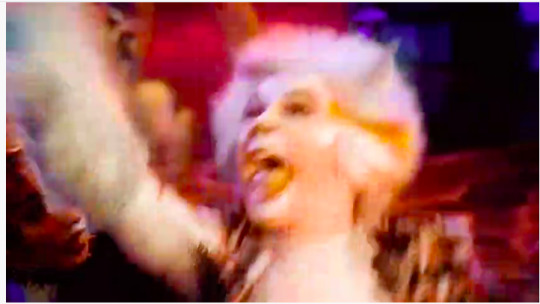
Emotional!
That’s all of them.
#cats south korea#grizabella#rum tum tugger#old deuteronomy#munkustrap#cats gus#bustopher jones#jellylorum#mungojerrie#rumpleteazer#skimbleshanks#mr mistoffelees#bombalurina#cats demeter#cats cassandra#jennyanydots#cats victoria#cats plato#macavity#cats alonzo#pouncival#sillabub#coricopat#tantomile#tumblebrutus#cats victor#cats olivia#cats admetus#quaxo#cats electra
28 notes
·
View notes
Text
Manfred Von Karma Character Essay
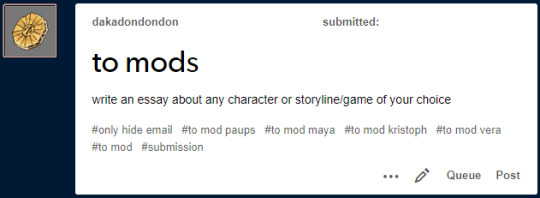
Dear Dakadondon,
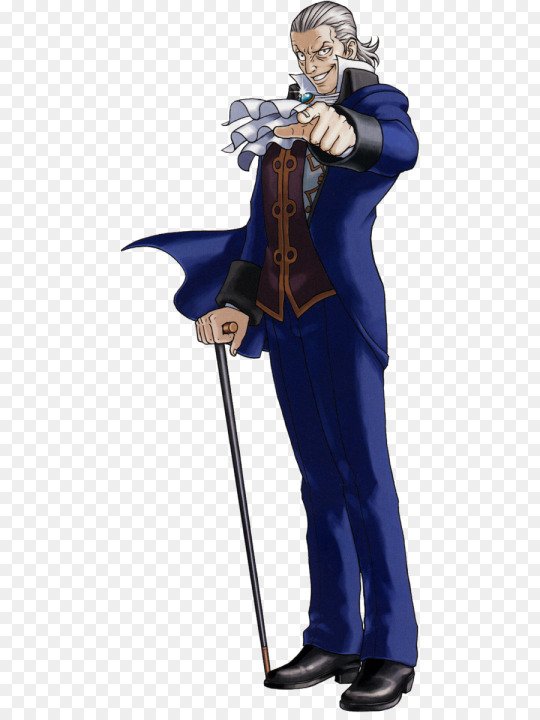
I’m going to give it a go on a character essay on my favorite villain, Manfred Von Karma. I haven’t been able to find any on him and I feel like he’s often overlooked as the nothing-but-evil villain when there is so much more to him than meets the eye.
When we are first introduced to Manfred Von Karma, he both is the final boss of the game and a foil for both Phoenix Wright and his rival, Miles Edgeworth. He represents the karma brought down upon Miles Edgeworth’s shoulders by his actions in the first game, thus his name “karma” or “ Karuma,” which means “karma” in Japanese. This works in the same way with Franziska Von Karma representing Phoenix Wright’s karma in AA2. Since we are focusing on Manfred Von Karma, he will be our main focus.

We are introduced to Manfred Von Karma as Miles Edgeworth’s mentor, but it is in AA2 we find out he is much more than a mentor. He was also a father figure of sorts to Miles Edgeworth. This relationship is often overlooked, even by the game itself. We are told by Franziska Von Karma how Miles Edgeworth was like her little brother, but nowhere in the game does it ever mention or demonstrate how Miles Edgeworth would be the son of Manfred Von Karma. Even the anime never truly focuses on that portion. As a result, we, as the players, are like Godot in how we miss the obvious red on white part of the case, and instead focus on the mentor and student relationship. Like anyone, why would we believe someone as twisted and vindictive as Manfred Von Karma would consider Miles Edgeworth as a son? Yet, this same man considered him the student under Von Karma? If Sebastian Debeste’s relationship with his father could be father/son and mentor/student, why wouldn’t the same also apply to Manfred Von Karma and Miles Edgeworth?
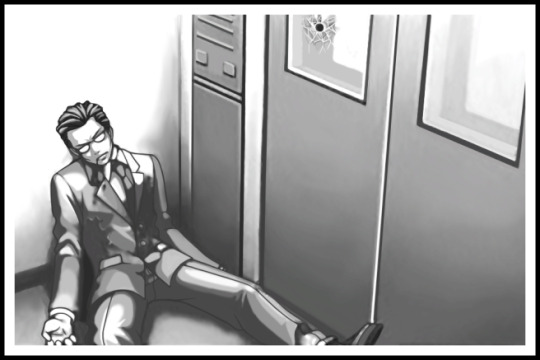
To understand this father/son relationship Miles Edgeworth shares with Manfred Von Karma, we first need to understand why it is overlooked or taken out throughout the game. After losing his father, Miles Edgeworth practically lost everything. If we are to assume his father was the only family he ever had in his life, then this would mean he became an orphan. He was alone without anyone to care for or love him. All of a sudden, this Prosecutor, who had gone up against his father in court, takes him in under his wing. He gives Miles Edgeworth food, a home, a little sister, a family, education and training to become a Prosecutor. Before, Miles Edgeworth only had his father, now under the Von Karmas, he has a family. Manfred Von Karma gave Miles Edgeworth much more than his biological father ever did, when we take into account the mentioned family of Manfred Von Karma than just Franziska: a niece, a possible extra sibling(s) and a mother.
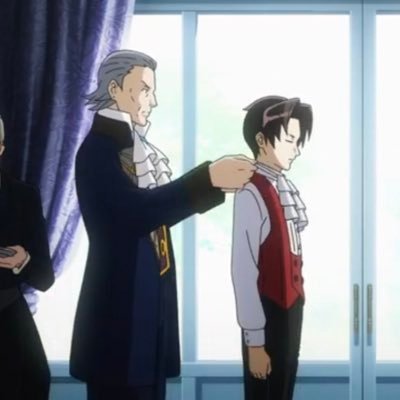
In the head of Miles Edgeworth, he is not deserving of this. He mentally believes he is responsible for the murder of his own father. He isn’t deserving of a family, a home or any of these things. This is a similar mentality he will eventually have with Phoenix later on after Turnabout Goodbyes. In turn, we have Manfred Von Karma, who is simply using Miles and his genius to have as his own. He knows of his crime of having murdered this boy’s father and yet is willing to provide this boy with a better life. It feels off for Manfred Von Karma, if we were to assume he’s your typical devilish bad guy with no moral compass. Though, if we were to take AAI2 into account in how he praises his wife’s cooking, despite being an amateur, and was willing to defend Delicia Scone’s innocence for no other reason other than, “she is innocent,” we can assume he does have some form of moral compass. At the very least, he is capable of love for those he considers family and will protect those he considers innocent. If we are to assume that he does love his family, or at least is capable of such, we can assume that there was a tiny bit of compassion he had in taking in Miles Edgeworth. Even if we were to reason that Manfred Von Karma was simply using Miles Edgeworth to cover up his own crime, no one can deny that Manfred Von Karma could’ve made him into a Cinderella or killed him under his care.
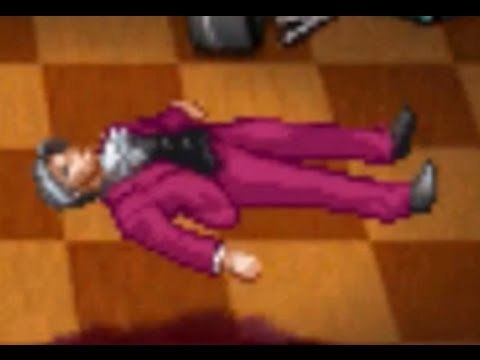
Of course, many would disagree this man would have a heart, if only because the game seems to imply that Manfred Von Karma took in Miles Edgeworth to beat the dead horse that was Gregory Edgeworth. Except, that would imply that Manfred Von Karma believes in spirits and was so passionate that he was willing to raise a child with severe trauma, nightmares and phobias. To put it simply, raising Miles Edgeworth, for Manfred Von Karma, would have been a nightmare in itself. Not only because he’d be having sleepless nights from a child, then teenager being up in the middle of the night because of nightmares, but also having to calm him down every time an earthquake hit, perhaps having to deal with Miles Edgeworth’s fear of elevators and there are the effects of DL-6 that took a toll on Miles Edgeworth. Anyone who knows anyone that deals with severe trauma will tell you that each day, minute and second that person is still living is a miracle. This is something Manfred Von Karma would be having to face every morning and night. For Miles Edgeworth, he believes he killed his own father and is not deserving of anything. Perhaps being a Prosecutor is his way of punishing himself, but it is also a goal he strives for that was placed upon him by Manfred Von Karma himself. You could say that Manfred Von Karma gave Miles Edgeworth a reason to live.

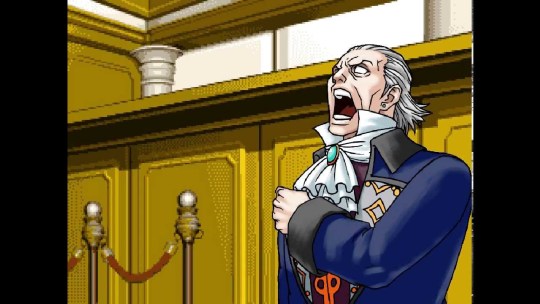
Knowing this, it makes sense why Manfred Von Karma framed Miles Edgeworth for the murder of Robert Hammond. This wasn’t about him ruining Miles Edgeworth’s life or revenge against Gregory Edgeworth. This was Manfred Von Karma running away from his problems, from his own guilt. We see in Turnabout Reminiscence how quickly Manfred Von Karma was willing to leave an investigation unfinished the moment he loses control. If you were to fail that game, before Manfred Von Karma demands Miles Edgeworth and young Franziska to no longer proceed in the investigation, he will stop the investigation right away or Franziska will win. It’s only after he demands there to be no more investigation that he no longer stops the investigation, but instead it is Calisto Yew or Tyrell Badd, who at one point sends his security to kick Miles Edgeworth and Franziska out. This means that the reason Manfred Von Karma wanted Miles Edgeworth to stop the investigation was because he no longer had control over the outcome. This makes sense for his character, who also left IS-7 after the events of DL-6. He’s the kind of man to run away from his troubles. If Miles Edgeworth’s trauma was trouble for Manfred Von Karma that he can’t ever get rid of, he will proceed to get rid of Miles Edgeworth instead.


The problem with Manfred Von Karma framing Miles Edgeworth for murder is that this adds another problem. Miles Edgeworth is now the supposed son of Manfred Von Karma. Keep in mind this is a man who obsesses over perfection. To frame his own son for murder goes against being the perfect father. Aside from his own personal problems, Manfred Von Karma has no reason to get rid of Miles Edgeworth. Miles Edgeworth, while did suffer a few losses, is a valuable asset to Manfred Von Karma. He is Manfred Von Karma’s proud disciple and, if we were to assume he only has daughters, the only son he’s got. He is willing to throw away Miles Edgeworth, for what? Because of his own personal problems? Because he knows all of Miles Edgeworth’s troubles are caused by him? Because the only way to fix Miles Edgeworth is to admit that he was and is a terrible murderer and a criminal?
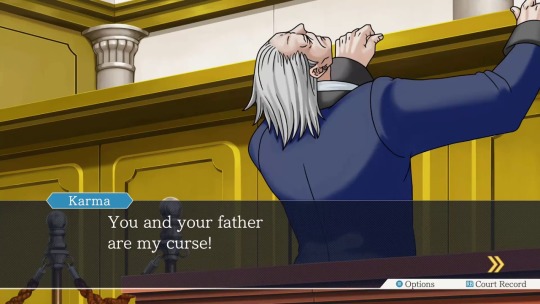
Much like how Manfred Von Karma represented the karma built upon all the deeds Miles Edgeworth had done, the same can also be said in reverse. For Manfred Von Karma, Miles Edgeworth is the result of his own karma. That karma will never go away and, so long as Miles Edgeworth continues to live in the Prosecutor’s circle, the karma of Manfred Von Karma will haunt him for the rest of his life, unless he decides to find closure. Whether that closure be through death or reconnecting with Miles Edgeworth, unless it is met, Manfred Von Karma will always be troubled by the karma he’s placed upon himself.
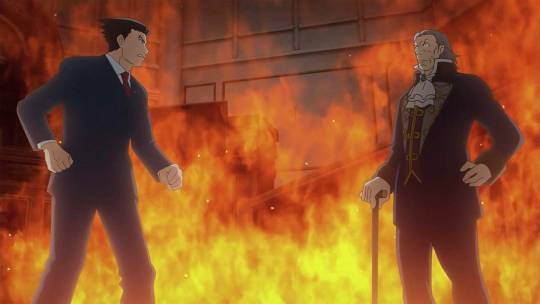
To describe Manfred Von Karma is someone that is obsessed with being perfect in every way to a fault. He has family, friends, people he loves and cares about, but is also a coward to face whatever troubles come his way. He is the opposite of Phoenix Wright, who is willing to face what he’s faulted and try to make things right. Manfred Von Karma represents a side to humanity none of us want to admit. We are very narcissistic and strive to be better than everyone else. Then, the moment we run into trouble where our true colors are shown, we tend to hide or run away like Manfred Von Karma.

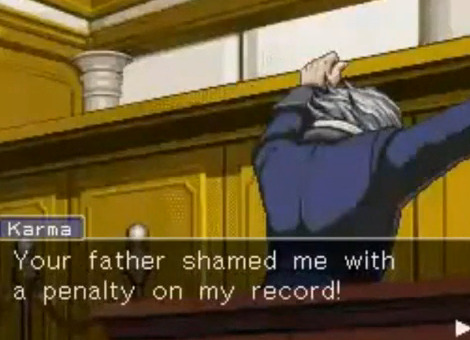
When you consider the events of IS-7, it’s clear Manfred Von Karma made many mistakes in how he approached the case. He refused help from his detective, he continually tried to fight against the Defense that he was right, he used threatening tactics to force the Defendant to confess to a crime he didn’t commit, he overlooked other crimes that happened such as the two missing boys, and he changed the case file to the Defendant being the culprit - even though he accused him of being an accomplice to the crime. While he didn’t forge the Autopsy Report, he placed the blame of the penalty he received from his boss on the Defense, who didn’t do anything wrong. To add insult to injury, he orphaned and traumatized a child that now is under his care. Manfred Von Karma continually ran away from his issues, the vile acts that he has done. As a result, he refuses to acknowledge Miles Edgeworth as his son. If he can’t acknowledge it, why should the game?


Manfred Von Karma is one of the most morally gray characters in the AA game. He represents the worst of all humanity. He’s definitely not one to sympathize with, but not because we can’t, but because we don’t want to. I consider the best villains as those you could become at any point in time. Someone like Kristoph Gavin or Dahlia Hawthorne would be much harder to see in ourselves, since their circumstances came from other bad circumstances. Manfred Von Karma, I can see in anyone no matter the circumstances or life they live. So long as you believe yourself to be better than anyone else, you will always become another Manfred Von Karma.
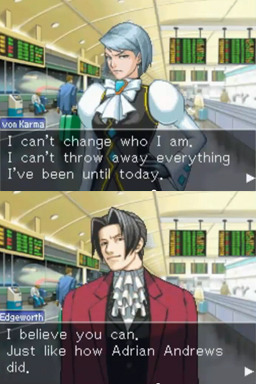
Ironically enough, I do see a redemption arc in Manfred Von Karma, if he was to ever live after Turnabout Goodbyes. The reason is because, believe it or not, I did have issues with Narcissism about ten or so years ago. Of course, I wasn’t as bad as Manfred Von Karma, but I can also relate to him. As such, I also know that it only takes seeing yourself as better than everyone else to void yourself of all empathy or compassion for others. This also includes thinking your opinions are correct or others’ opinions are problematic. All it takes for a redemption arc is realizing where you’re wrong, apologizing, and making things right. Of course, you can’t erase your history, but you can make a better future, especially for those you have hurt. Luckily, we have Franziska Von Karma and Miles Edgeworth to demonstrate what Manfred Von Karma could’ve been.
- Mod Edgeworth
66 notes
·
View notes